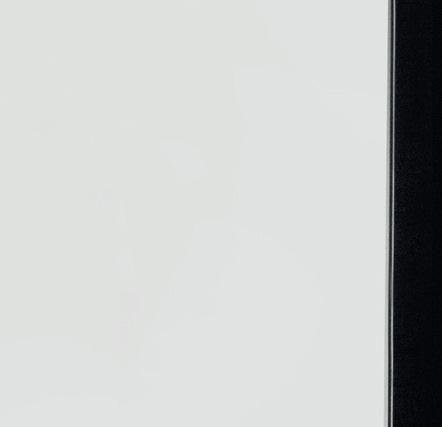Huzoor changed my perspective on life for
better:
USA reflect
meeting

Huzoor changed my perspective on life for
better:
USA reflect
meeting
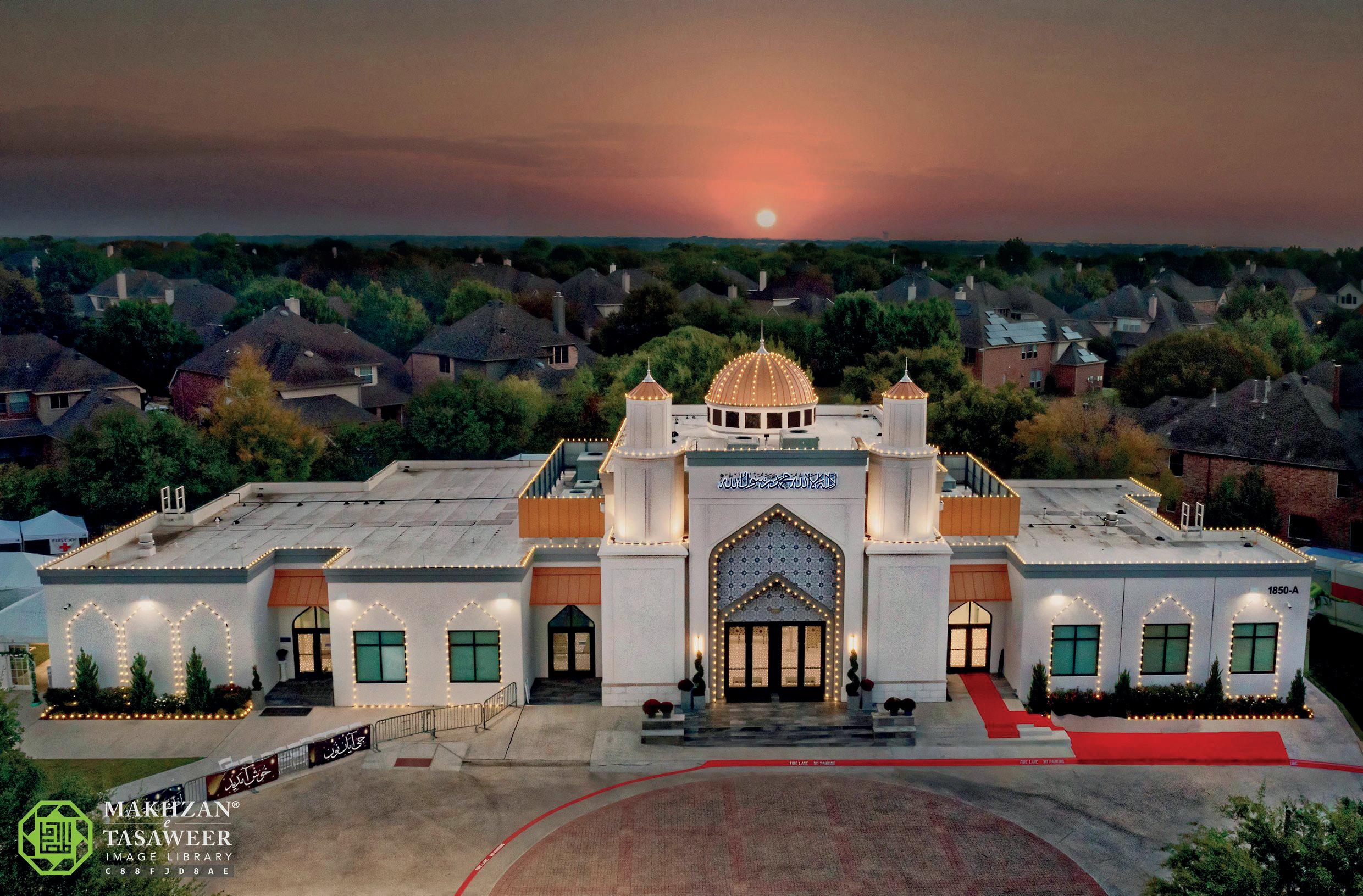
“He’s truly a holy man” Americans reflect on Hazrat Khalifatul Masih’s address at reception of Bait-ul-Ikram, Dallas
During the second phase of his historical tour of the United States of America, Hazrat Mirza Masroor Ahmad, Khalifatul Masih Vaa blessed the City of Allen with his presence. Allen is a city in Collin County in the US state of Texas and a northern
suburb of Dallas. There, Huzooraa unveiled a commemorative plaque to mark the opening of the Bait-ul-Ikram Mosque on Monday, 3 October and officially inaugurated the mosque with his Friday Sermon, delivered on 7 October.
Bait-ul-Ikram Mosque
On 9 October, a reception ceremony was organised by the Ahmadiyya Muslim Community to mark the inauguration of
Hadith-e-Rasul – Sayings of the Holy Prophet Muhammadsa
Hazrat Abdullah bin Amrra narrated that the Holy Prophetsa used to seek refuge with Allah from four things: from knowledge that is of no benefit, from a heart that does not feel humble, from a supplication that is not heard, and a soul that is never satisfied.
Sunan an-Nasa’i, Kitab al-Isti‘adhah, Hadith 5442)
“Two friends can only carry on as such when, on certain occasions, the former listens to the latter and vice versa. If one friend demands to get his way every time, this will spoil the relationship. So, too, should be the case in the bond between man and God. At times, Allah Almighty accepts the servant’s desire and opens to them the door of His grace; and on other occasions, the servant must submit to the divine decrees of fate and destiny. In truth, it is God Almighty who possesses the right to try His servants, and these trials from God are for man’s benefit. God makes those who prove to be sincere even after they are tried, the inheritors of divine bounty—this is how God’s law of nature operates.”
(Hazrat Mirza Ghulam Ahmad Malfuzat,
<< Continued from previous page the mosque. This event was also graced by Hazrat Amirul Momineenaa. The event was attended by many non-Muslim guests, including federal, state, county and city officials. Attendees came from ten different countries and hundreds of different cities. The event was also simultaneously translated into various major languages and broadcast live by MTA International for its global audience.
The event started with the recitation of verses 126 to 129 of Surah al-Baqarah and verse 30 of Surah al-’A‘raf of the Holy Quran by Syed Labeeb Janood Sahib followed by its English translation, delivered by Ibrahim Naeem Sahib. Then, Amjad Mahmood Khan Sahib (Secretary Umur-e-Kharijiyyah USA) welcomed the attendees and presented a brief introduction to the Ahmadiyya Muslim Community. He also gave a brief introduction to the Bait-ul-Ikram Mosque. The entire mosque complex, he informed, expanded over 3.87 acres and served the 600 members of the Community who lived in and around the area.
The first guest speaker was Honorable Carl Clemencich, a member of the City Council of the City of Allen. Mr Clemencich called it an honour to join the reception event and congratulated the Ahmadiyya Muslim Community. He praised the efforts of the Jamaat towards peace and service to mankind. He then said, “Behind these acts of service is great leadership and that is why we are so grateful His Holiness has chosen to visit Allen to inaugurate this beautiful mosque. Your Holiness! The message of peace, justice and service to mankind that you are spreading throughout the world is just what we need right here, right now. The city of Allen is fortunate that such a peaceloving and service-oriented community has decided to settle down here and build such a beautiful mosque. It is my wish that this
mosque becomes a ‘beacon of hope’, not just for the city but for all those around it.”
He also presented the key to the city of Allen to Huzooraa on behalf of the mayor and city council of Allen.
Professor Dr Robert Hunt was next to present his remarks. He is the Director of Global Theological Education at Southern Methodist University’s Perkins School of Theology. Dr Hunt thanked the Jamaat for inviting him. He said that we are looking forward to the visionary address of Huzooraa He stressed the importance of religious harmony and said, “It is my hope that the opening of this mosque and the visit of His Holiness will encourage us all to redouble our efforts to create, through dialogue, a peaceful harmonious and respectful society not only here in North Texas but across the globe.”
The Honorable Michael McCall was the final guest speaker to share his remarks. He is a member of the United States Congress, serving Texas’s 10th District. He serves as the ranking Republican chair of the House on the House Foreign Affairs committee. He is also serving as co-chair of the Ahmadiyya Muslim Congressional caucus.
Congressman McCall said in his remarks that it was an honour for him to be at this historic event. This was the second time he had had the opportunity to attend an event with Huzooraa, he said.
Addressing the attendees of the ceremony, he said that the Ahmadiyya Muslim Jamaat had faced a lot of opposition but had always stood up for freedom of religion. He said, we could learn a lot from the Ahmadiyya Muslim Community about peace and forgiveness. The congressman then read out and presented a resolution to Huzuraa, in which Huzooraa has been welcomed and his unwavering efforts towards world peace have been recognised. He also added, “[His Holiness] delivered the keynote address at a special bipartisan reception at the Rayburn House Office building on Capitol Hill on
27 June 2012 […] Your Holiness! I look forward to having you back at our nation’s capitol to address us again.”
After that, Hazrat Mirza Masroor Ahmad, Khalifatul Masih Vaa blessed the gathering with an address. He began by reciting the basmalah and then thanked Allah the Exalted for enabling the Jamaat to build the mosque. Huzooraa also thanked the guests for accepting the Community’s invitation to attend the reception event and everyone who may have supported the project in any way.
He then briefly outlined the two principal objectives underlying any mosque built by the Ahmadiyya Muslim Community. He said, “Firstly, our mosques serve as places for our members to congregate to fulfil their religious duties of worshipping God Almighty. Secondly, our mosques enable us to serve God’s creation and to propagate Islam’s teachings.”
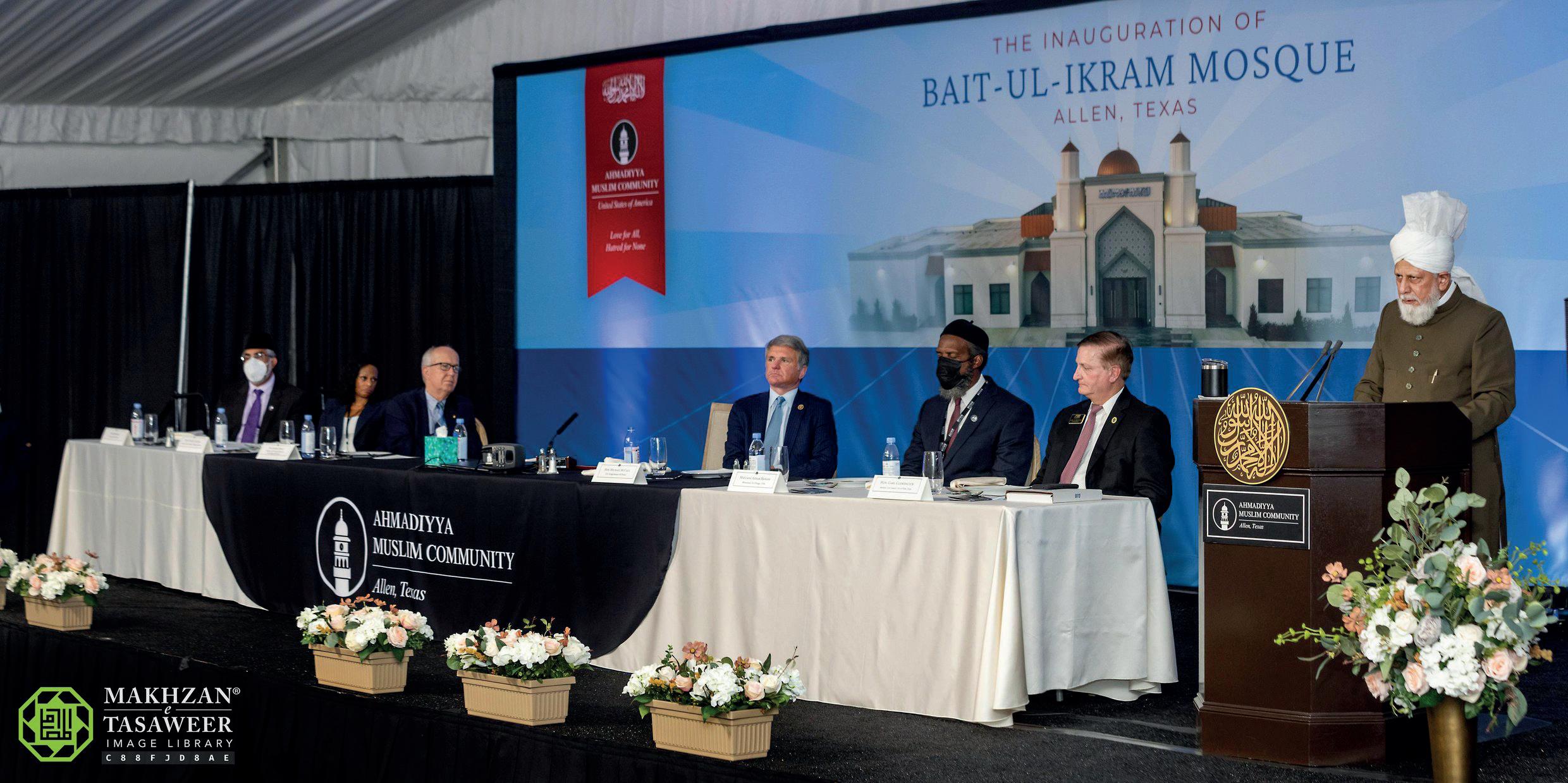
Huzooraa then removed the possible fears and reservations of the neighbours by reassuring them that “This mosque will never cause you or your fellow citizens any harm or distress. Rather than sowing seeds of discord and disharmony in society, this mosque will serve as a unifying force for good.” Giving the example of the Kaaba, Huzooraa said that it was a symbol of universal peace and security for all peoples and nations. Hence, when Muslims faced the Kaaba while praying in any mosque, they were required to follow the same objectives.
Addressing an allegation made by the opponents of Islam, namely that Islam was an extremist religion that promoted violence and warfare, Huzooraa said, nothing could be further from the truth. Huzooraa said, “Islam’s teachings do not permit Muslims to engage in warfare or resort to the use of force except in the most extreme circumstances where war is waged
unjustly against them and there is a direct attempt to destroy and eliminate Islam. In early Islam, the conditions were so grave that Allah the Almighty permitted the Muslims to defend themselves to uphold and defend the principle of universal religious freedom,” never for any personal revenge. Huzooraa then explained, how the early Muslims abided by the highest moral standards and stringent rules of engagement even though their lives and properties were under the gravest threat.
While interpreting verse 126 of Surah al-Baqarah regarding the Holy Ka’bah, Huzooraa said, “Allah the Almighty states that He built the Sacred House as a refuge from evil and as an abode of peace and security for all mankind to join together. This verse reiterates the duty of Muslims to live in peace and harmony with all members of society and to bestow peace and security to others. Consequently, if a person fails to be a source of peace for others, he or she cannot call themselves a true Muslim.”
Then, Huzooraa interpreted verse 64 of Surah al-Furqan and said, the verse “instructs Muslims on how to respond to ignorant or hostile people who taunt or speak unkindly to them. Rather than reacting indignantly, Allah the Almighty instructs Muslims to keep their dignity in the face of provocation, to remain patient and to respond by saying ‘peace be upon you’ and to take leave of the situation. The Quran teaches that rather than confront aggression and provocation in a light fashion, Muslims should set aside their pride and respond by conveying a message of peace and avoid all forms of conflict […]”.
Huzooraa explained that the God, presented by the Holy Quran, was the Lord of All Mankind, which required a Muslim “to bestow comfort, to be a source of peace and to establish love and harmony with all other people, rather than be a person who causes humanity grief or suffering. A true Muslim is one who shoulders the burden
of others and feels their pain and sorrow as though it was their own.” It was in this spirit that we built our mosques, Huzooraa said.
Highlighting some of the humanitarian services of the Ahmadiyya Muslim Community, Huzooraa said that apart from building mosques, the Ahmadiyya Muslim Community, inspired by its faith, also constructed hospitals, medical clinics, schools, clean water facilities and ran a multitude of other humanitarian projects, such as sending humanitarian relief teams to those places afflicted by natural disasters. He emphasised that all such services and help were rendered irrespective of nationality, ethnicity, religion or belief and that the Community sought no reward as their only objective and heartfelt desire was to alleviate the suffering of mankind. “Serving humanity is our mission and purpose because Islam has taught us that we must not only fulfil the rights of God Almighty but also the rights of his creation,” Huzooraa said.
Huzooraa then told the attendees that the Ahmadiyya Muslim Community considered it their responsibility to convey Islam’s true message of peace and security to the entire world and to play a foremost role in that regard. He then spoke of the purpose of the advent of the Promised Messiahas in accordance with the prophecies of the Holy Prophet Muhammadsa and how he corrected the wrongful notions regarding religious warfare that had crept into the beliefs of Muslims.
“Hence,” Huzooraa said, “the local people in Dallas have no need to fear this mosque. So, I urge anyone who has any doubt or fears to breathe a sigh of relief in the knowledge that this new mosque, built by the Ahmadiyya Muslim Community, will only ever represent and reflect Islam’s enlightened teachings of peace, respect and tolerance. Our teaching is not to confront those who have different beliefs from us but to embrace them. Our teaching is not to attack our opponents, but to defend them and their rights. Rest assured, this mosque will radiate nothing but love, compassion and sympathy for mankind. Those who
enter this mosque shall be those who seek to contribute to and serve society in the best possible way.”
Huzooraa then addressed the current perilous state of the world and said, “Unquestionably, today the world teeters on the brink of disaster as nations around the world are engulfed by a ferocious storm of political, economic and social unrest. The war in Ukraine has been raging for months and dark clouds indicating even greater turmoil and warfare are hovering ominously above us. Opposing political blocs and reliances have become progressively entrenched as the world becomes increasingly polarised. The result is that the peace and security of the world is unravelling by the day. Until recently, threatening to unleash nuclear weapons was considered unthinkable but now such threats are uttered on an almost daily basis.” Huzooraa then explained how the Ahmadiyya Muslim Community had been, for many years, striving to highlight the volatile state of the world to world leaders as well as the ordinary public and urging them to set aside any differences that exist for the greater good. Huzooraa said, “I have always sought to make people understand the true value of peace and to make them aware of the risks of divisive and unjust policies that serve only to ferment unrest and lead to frustrations that are bound to erupt and boil over eventually. We must urge our leaders and politicians to step back from the precipice because there is no doubt that if a global war erupts, it will be unlike anything the world has ever seen.”
Huzooraa further said, “My ardent request and message to the world is that we must set aside our differences and work tirelessly to foster peace in society.”
While urging everyone to play an active role in the pursuit of peace, Huzooraa said, “Wherever there is cruelty or injustice, we must condemn it. We must urge our political leaders that instead of propelling our nations towards war and rather than raising the temperature through threats of retribution and violence, they should endeavour to cool the tensions that exist both

at an international level and within nations, through diplomacy and wisdom. They must ensure that the peace and security of the world remains their paramount objective.”
Huzooraa urged Muslims, Christians, Jews, Hindus, Sikhs and all those who do not believe in God or subscribe to any faith to come together for the sake of humanity and especially urged religious people to pray for true and lasting peace in the world to emerge. Huzooraa then prayed, that the world may be saved from all forms of destruction and devastation and may God
Almighty have mercy upon the world.
In the end, Huzooraa said, “I pray that our new mosque here in Dallas forever serves as an abode of peace and prosperity for all mankind. May its spiritual light illuminate its surroundings and eternally shine forth as a symbol of peace and humanity.”
Hazrat Amirul Momineenaa then thanked the attendees once more, before leading everyone in silent prayer and the reception came to a successful conclusion.
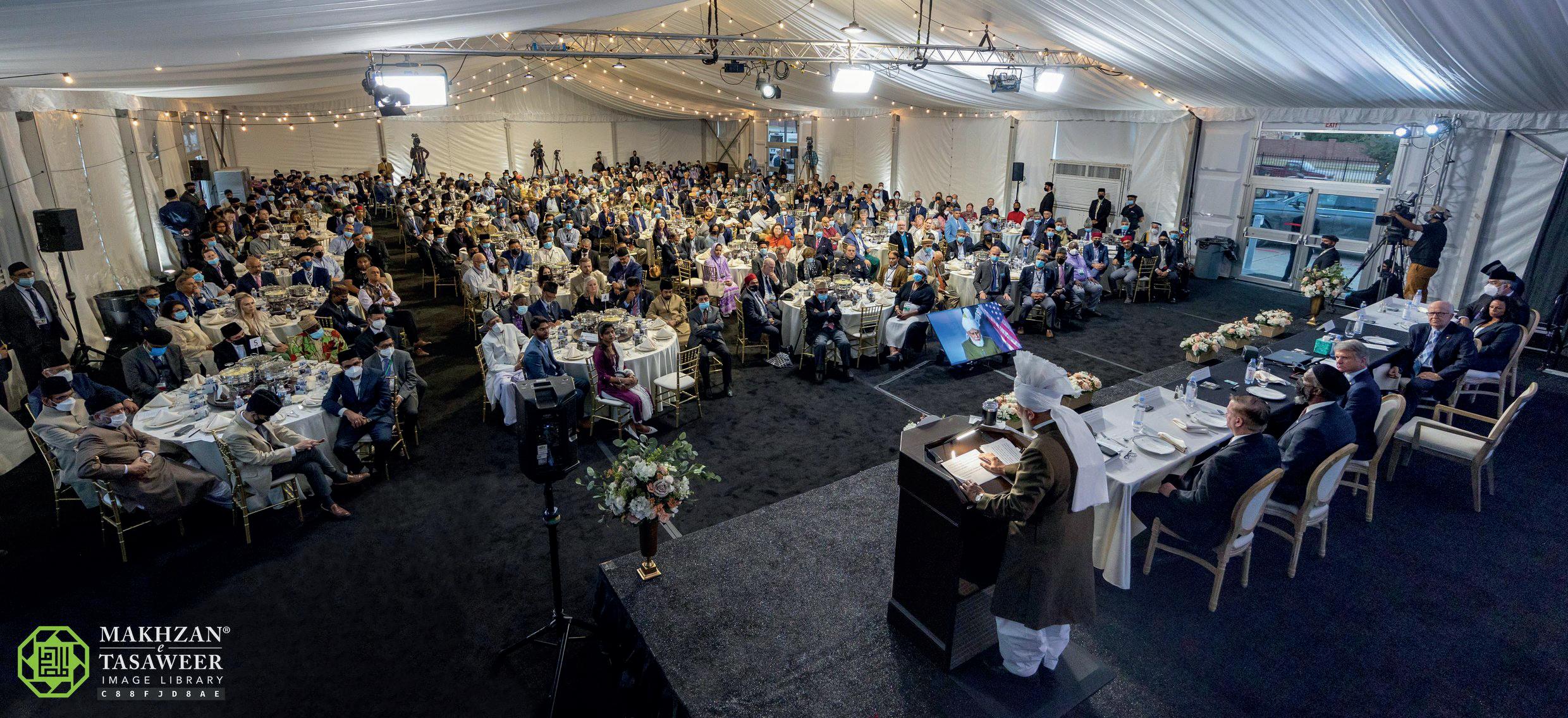
The morning of 2 October 2022 was the day for Huzoor’s departure from Zion to Dallas following the grand opening and reception of Fath-eAzeem mosque.
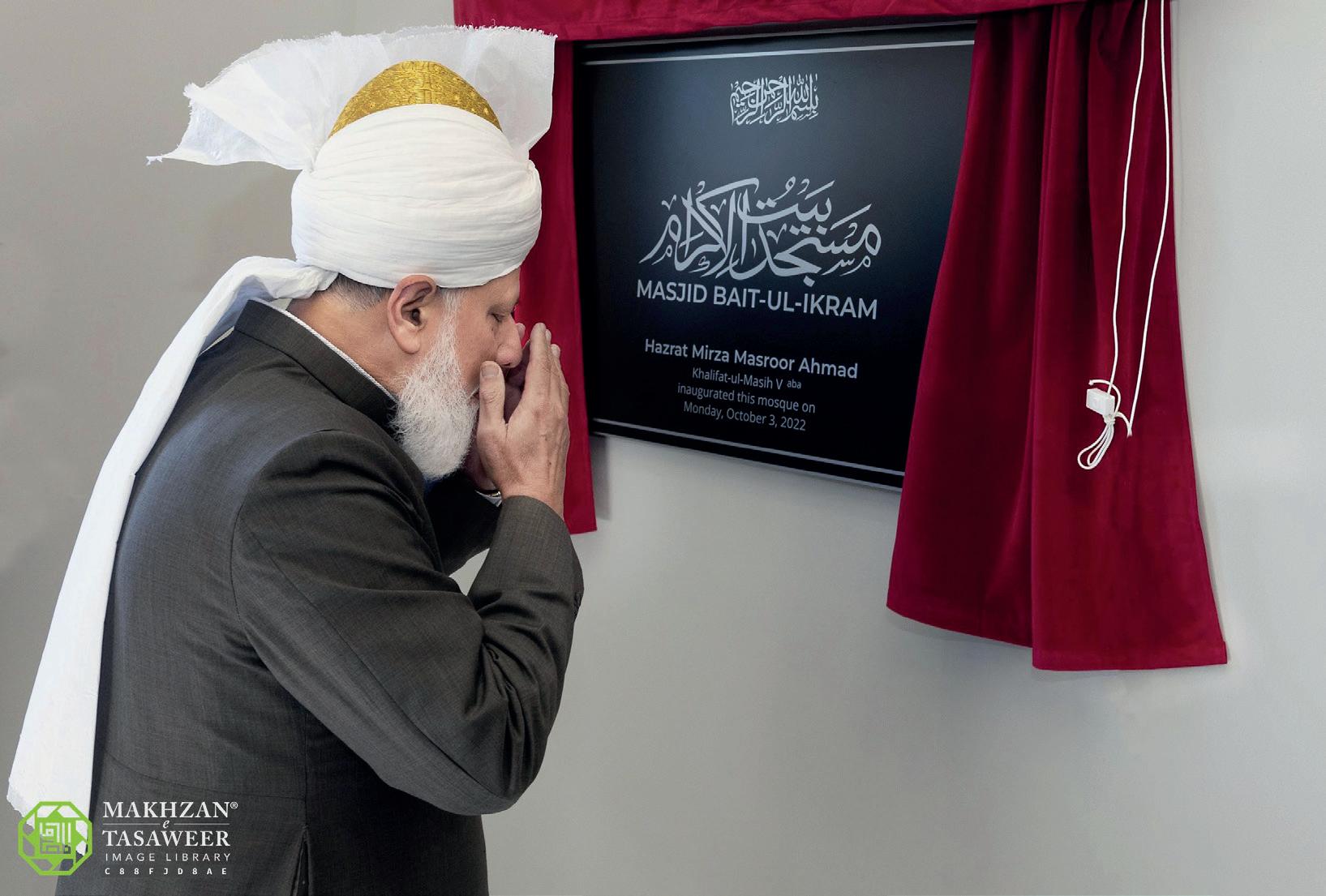
Huzooraa came out of his residence at around 11 am – outside, hundreds of Jamaat members were waiting to bid farewell to their Imam. The local Jamaat amila of Zion had the blessed honour of having a group photo with Hazrat Khalifatul Masih Vaa and also various departmental nazimeen, followed by the Ziafat (hospitality) department volunteers.
After the group photos, Huzooraa went around the Fath-eAzeem mosque complex to see and greet everyone before leading all present in silent prayers. Huzoor’s entourage left Zion for the airport. This brought the first leg of Hazrat Amirul Momineen’s tour to a successful end. During Huzoor’s stay in Zion, he met 1032 members of the Jamaat during mulaqats
At the airport, just before boarding the flight, the entire entourage had the honour of having their group picture taken with Huzooraa in front of the plane. There were around 70 members of Huzoor’s entourage that travelled on the “Khilafat Flight” (KF2022) with American Airlines from Chicago to Dallas.
After landing, the local Sadr of Dallas Jamaat, Hamid Sheikh Sahib, along with the local missionary, Zaheer Bajwa Sahib, welcomed Hazrat Khalifatul Masihaa. After exiting the airport, the entourage was quickly escorted by the police and was on its way to the newly built Bait-ul-Ikram mosque, where about 1,000 had gathered to welcome Hazrat Khalifatul Masih Vaa Once again, the members had come from different places to see and welcome their beloved Khalifa.
The weather on this day in Dallas had been pleasantly warm, in contrast to the weather in Zion, where it was chilly throughout the tour. Jamaat members gathered there for Huzoor’s arrival and had been waiting for several hours for their beloved Imam’s arrival.
Later, after Huzooraa led Asr prayers, he stopped at the langar khana (kitchen) to inspect the arrangements there. Huzooraa gave certain guidelines to the person in charge of the langar khana, Tahir Chaudhary Sahib, and then proceeded to the residence.
As the evening drew near, the mosque started to fill with worshippers.
Huzooraa came to the mosque and led everyone in Maghrib and Isha prayers and then retired to his residence for the night.
3 October 2022
On 3 October, several Jamaat members had the blessed fortune of meeting Hazrat Khalifatul Masih Vaa for the very first time in their lives. To say that this was a lifechanging moment for these blessed souls would be an understatement.
After the mulaqats, Huzooraa came to the front of the mosque to unveil the official mosque plaque, followed by a silent prayer in which everyone joined. Afterwards, Huzooraa went to the prayer hall and led Zuhr and Asr prayers. Huzooraa returned to his office to resume the mulaqats that went all the way up to 8:10 pm. On 3 October, 248 members from 63 Ahmadi families had the honour of having a private audience with Hazrat Khalifatul Masih Vaa
To mark this momentous occasion of the mosque inauguration, the local Dallas Jamaat prepared a special BBQ dinner and Huzooraa graciously blessed the food marquee with his presence just before the Maghrib and Isha prayers and tried some of the food as well.
After exiting the langar marquee while making his way to the mosque, Huzooraa noticed Anwer Mahmood Khan Sahib, the person responsible for the Zion Fath-e-Azeem Mosque exhibition, and stopped to converse with him.
A volunteer for Al Hakam, Zaryab Mahmood Gondal Sahib spoke to Anwer Mahmood Khan Sahib after and asked about what Hazrat Khalifatul Masih Vaa said.
He told us that Huzooraa enquired about
the exhibition set up in Zion. Huzooraa asked how many people had seen the exhibition, to which Anwer Sahib said about 200-250 non-Ahmadi guests and about 1100 people in total. Anwer Sahib’s son, Amjad Khan Sahib said it was actually 1500.
Addressing Amjad Khan Sahib – who was also present there – Huzooraa asked about the remarks of the Mayor of Zion City regarding Huzoor’s speech. Amjad Sahib said, “Huzooraa, he was speechless. A few days ago, he was not sure if he wanted to even consider handing over the key and all of a sudden, Allah changed his mind.” Amjad also informed Huzooraa that the picture of the Promised Messiahas was also displayed on ABC News, a major news channel in the US, and hence it was going viral on social media.
Hazrat Khalifatul Masihaa instructed Anwer Sahib that an hour-long documentary of the whole exhibition in Zion should be made and played on MTA International. Answer Sahib said to Huzooraa that MTA had already made a documentary on the prayer duel and Zion, to which Huzooraa said that “this new documentary should be on the exhibition only”. Anwer Sahib said that Huzooraa said this was such a big sign that it had to be advertised accordingly to capture the true grandeur of the Grand Victory given to the Promised Messiahas
Anwer Khan Sahib also told us that while researching for the exhibition, he was able to recover not only Dowie’s audio recordings but some video clips of Dowie as well.
Speaking about the background of the exhibition in Zion, Anwer Khan sahib said that in 1967, Hazrat Khalifatul
Masih IIIrh came to Chicago and said to the Jamaat members that the Promised Messiahas had referred to 32 news clippings (of the Promised Messiah’s challenge to Dowie) in his book Haqeeqatul Wahi and asked the Jamaat if they had tried to find or had retrieved those original clippings?
The Jamaat representative said they tried but couldn’t find them. Hazrat Khalifatul Masih IIIrh said that he was disappointed as the Promised Messiahas could find them 100 years ago and yet the Jamaat members living in this day and age could not find them.
Mirza Muzaffar Ahmad Sahib then became the Amir and Anwer Khan Sahib was serving as National Secretary Tabligh. Mirza Muzaffar Sahib asked Anwer Sahib to find those clippings and so he worked on it for one or two years and managed to find only 24 out of the original 32. Anwer Sahib said that the Promised Messiahas also wrote that he had received 32 news clippings and also said it appeared there could be hundreds of these news clippings. Anwer Sahib set out to find them and by Allah’s grace, they were able to find more than 160 news clippings about the Promised Messiah’s prayer duel and his subsequent success against Alexander Dowie.
Anwer Sahib said he showed Huzooraa, in the Zion exhibition, the news clippings on the electronic display that are also searchable. The Jamaat now has all the clippings translated into Spanish as well.
On 5 October, the waqifeen-e-nau and Waqifaat-e-Nau from across Texas and neighbouring states started to arrive for classes with Hazrat Amirul Momineenaa
The two groups started to have their practise runs for their respective classes that were going to be held in the evening. At around 6 pm, Huzooraa arrived at the mosque to hold the Waqifaat-e-Nau class, which went on for one hour. At the end of the class, the waqifaat-e-nau left the prayer hall and the Waqifeen-e-Nau boys walked in and took their spots. The class began shortly thereafter. The Waqf-e-Nau class was also one hour long. Both the boys and the girls not only presented before Huzooraa but also had the blessed opportunity to ask several questions and receive answers from Huzooraa. A detailed report of these two classes will be shared later.
On 7 October Huzooraa delivered his Friday Sermon from the Bait-ul-Ikram Mosque.
question, I couldn’t look away. I haven’t had much interaction with Huzooraa in the past. So, I wanted as much interaction with him as I could. It was a really nice experience.”
Amatul-Haleem Zayn Wahab Karim of Indiana Jamaat said:
“I am very grateful for the opportunity to be in the presence of beloved Huzooraa and I felt like I benefited from everyone’s questions. For example, someone asked how to raise children and even though I don’t have children, insha-Allah, I will remember this advice.”
Ehsaan Ahmad Syed of Dallas Jamaat shared:
“This experience was absolutely memorable. I was in a virtual mulaqat a few months ago. It felt unreal to see Huzooraa talking to my fellow brothers and the advice he gave to all of us was amazing. Definitely looking forward to this again.”
Faran Rabbani USA CorrespondentOn 5 October 2022, Hazrat Khalifatul Masih Vaa graced the Waqifaat-e-Nau of the USA with a class at the newly inaugurated Bait-ul-Ikram Mosque. There were 90 nasirat and Lajna members present for this historic class.
The class commenced with a recitation from the Holy Quran and its English and Urdu translation, followed by a hadith and its English and Urdu translation.
Afterwards, an excerpt from Malfuzat was presented in Urdu with its English translation. This was followed by an Urdu poem and its English translation.
During the class, the waqifaat-e-nau had the opportunity to ask Huzooraa any questions they had and seek guidance on matters. This question and answer session lasted for 40 minutes.
Out of the many questions asked, one question was why we said
so many occasions with me and with other people as well, when we say [it], immediately either we find that thing or it comes into our mind that ‘yes I kept that thing in there’. So, it also works to find things to save you from your loss.”
Huzooraa said the prayer was also read when someone died:
“This is the prayer that if a person dies […] I am very sad upon his demise or her demise, but Allah is always there, He will protect me, He will save me. See, the same thing happened when the father of the Promised Messiahas passed away and he was very much worried […]. Then, when he prayed that, ‘God what will I do?’ Then, after saying
, immediately it was revealed to him by Allah the Almighty that ‘Is Allah not sufficient for His servant’. You are Allah’s servant, so Allah is sufficient for you. This is how Allah Almighty comforted him. This is a prayer that gives you comfort and this is why we say
Some of the participants in these two classes shared their sentiments afterwards with Al Hakam
Rida Rabbani of Dallas Jamaat mentioned:
“Being in the Waqf-e-Nau class with Huzooraa was a unique experience. I felt a spiritual awakening within my being. Seeing and listening to Huzooraa changed my perspective on many things in life for the better. I got the clarity I needed on what I should do in my life. Alhamdulillah. I really felt connected with Huzooraa; he made us all feel like he was our family.”
Husna Ahmed Mirza of Los Angeles said:
Qamar Ahmad Khan from Central Jersey Jamaat stated:
“Alhamdulillah, I was blessed to not only be part of the mulaqat but also to be in the presence of our beloved Huzooraa. I was initially nervous, but Huzoor’s calm and joyful personality made all of us very relaxed. Huzoor’s knowledge and ability to answer questions with such depth were quite inspiring. I cherish these moments and look forward to sharing them with generations to come.”
Khubaib Ahmad Hassan from Houston said:
“This was an amazing experience. I will read Izala-e-Auham now as Huzooraa asked us to read that book. I will be more focused, keeping in mind that I have to serve a very big cause.”
Ahad Khan, who travelled from New York, said:
(To Allah we belong, and to Him
we return) when we had lost a material thing (while also reciting it when someone died)?
Huzooraa said:
“The meaning of this [phrase] is that we are for Allah and to Him shall we return. The Holy Quran says that you not only say these words when somebody dies but also whenever you lose anything or you are [facing] a difficulty or a problem, [even] then you say [it], and it will remind you of the power of Allah the Almighty; that only Allah will always remain in this world, and everything else will have to die.
“So, you see, it has a very deep meaning as well. When sometimes you lose something and you have forgotten something, you have kept it somewhere, if you say
happens,
happened
The waqifaat-e-nau class came to an end at 7 pm sharp and the waqifaat-enau quietly exited the main prayer hall and the waqifeen-e-nau boys swiftly entered and took their places. Mirza Harris Ahmad Sahib, Secretary Waqf-e-Nau USA, accompanied Huzooraa for this class. The class started with a recitation from the Holy Quran and its English and Urdu translation, followed by a hadith and its English and Urdu translation.
Afterwards, an excerpt from Malfuzat of the Promised Messiahas was presented in Urdu, followed by an Urdu poem with its English translation.
This concluded the formal session of the waqifeen-e-nau class and afterwards was the question and answer session with Huzooraa that went on for an additional 40 minutes. Several waqifeen-e-nau also had the opportunity to ask questions of
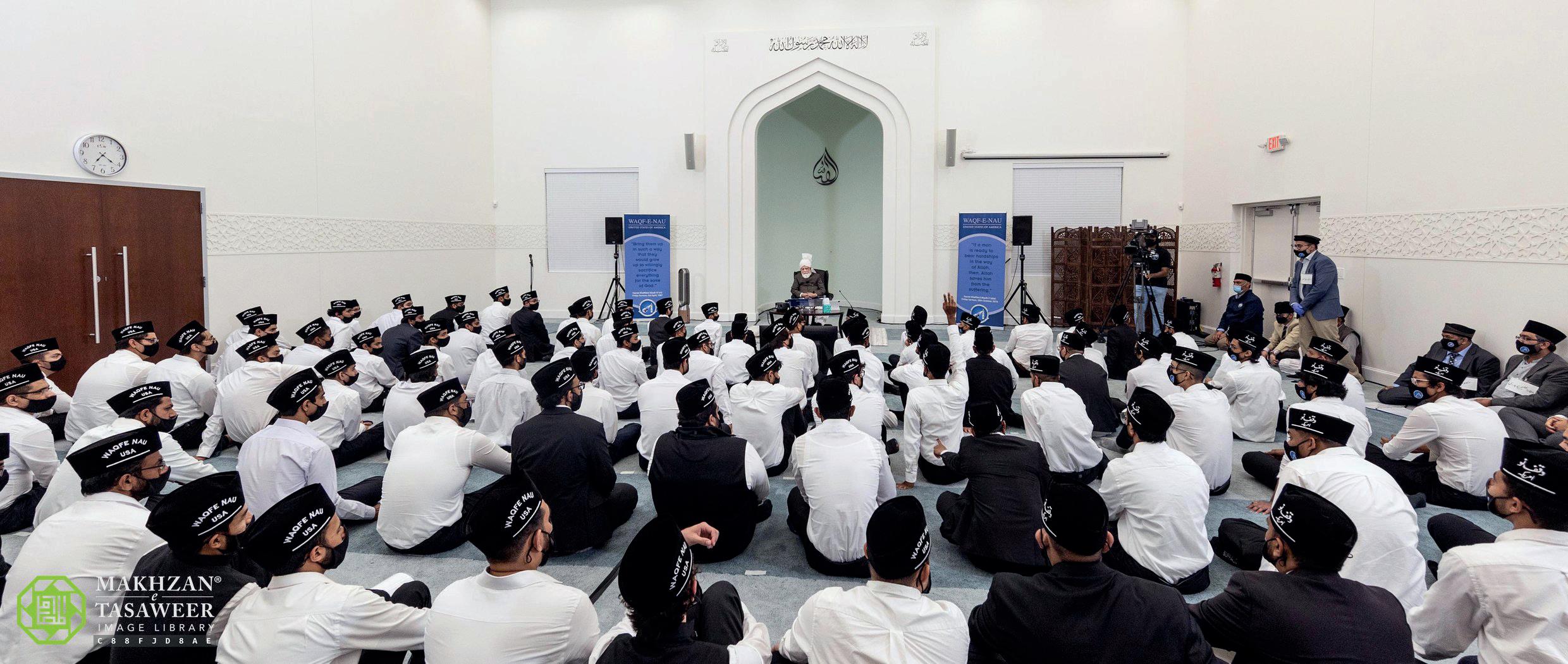
“I am feeling amazing and refreshed being in Huzoor’s presence. Very much needed. I am extremely grateful to be a waqifa-e-nau right now. Alhamdulillah.” Maala Sabah Noor of Los Angeles expressed:
“The feeling of being present with Huzooraa was amazing and memorable. Being able to see him guide us first-hand, and being there and attentive, really made an impact on me as a waqifa-e-nau and as an Ahmadi Muslim.”
Shafia Ahmad of Dallas Jamaat said:
“I feel very happy and blessed for this opportunity. It feels unreal. Meeting Huzooraa in this sitting, especially at our local mosque, made me more motivated to be a better Ahmadi. Alhamdulillah.”
Hiba-tus-Sabooh Haroon Malik of OshKosh mentioned:
“Before the class, I felt really nervous, but when the class started, I felt calm because Huzooraa made it really easy, he was laughing with us. But then I felt a little nervous […] but when I was asking my
“Huzoor’s detailed explanation of each question showed his immense love for all of us, which deeply impacted me. Huzoor’s guidance that we should always think to benefit the Jamaat first as waqifeen-enau provided a clear expectation for all.”
Nauman Ahmad Farid of Minnesota Jamaat shared:
“It was a wonderful experience, and I feel very blessed to have participated. Huzooraa answered my question in a way that settled the matter in my heart. The class will help me put in more prayer time, so I can do justice to namaz just like my studies.”
Fozaan Azeem Noor of the Los Angeles Jamaat said:
“I felt really happy to have been a part of the mulaqat, and even though I never asked a question, I felt very happy to sit in Huzoor’s presence. Since I plan on joining Jamia Ahmadiyya, Huzooraa gave me the information on the prerequisites that I needed in order to prepare for my admission.”
Ahmadiyya Muslim Community was the fastest-growing community in the world. Huzooraa responded by saying that as an organised, international community, united under one leadership, the Ahmadiyya Muslim Community was the fastest growing community and this was now being acknowledged by external sources.
17 October 2003: During his Friday Sermon on this day, Hazrat Khalifatul Masih Vaa urged the Ahmadi doctors to devote themselves – either temporarily or permanently – to serving in the hospitals in Africa.

14 October 2005: During his Friday Sermon on this day, Hazrat Khalifatul Masih Vaa mentioned the martyrdom of Ahmadis in Mong, District Mandi Bahauddin, Pakistan. Huzooraa also mentioned the horrific earthquake in Pakistan and the Jamaat’s humanitarian services for the victims.
14 October 2011: During his Friday Sermon on this day, from Nunspeet, the Netherlands, Hazrat Khalifatul Masih Vaa said that “this era in which
we are living today is the era of Islam’s revival.”
14 October 2015: Hazrat Khalifatul Masih Vaa laid the foundation stone for the first Ahmadiyya mosque in the German city of Nordhorn, the Sadiq Mosque.
15 October 2016: Hazrat Khalifatul Masih Vaa arrived in Canada’s capital city, Ottawa. Huzooraa arrived at the Baitul Naseer Mosque, where he was
welcomed by hundreds of Ahmadis.
16 October 2013: Hazrat Khalifatul Masih Vaa led the Eid-ul-Adha prayer from the Baitul Huda Mosque in Sydney. It was the first time that Huzooraa led an Eid prayer in Australia.
16 October 2015: Hazrat Khalifatul Masih Vaa delivered his Friday Sermon from the Baitul Aafiyyat complex in Frankfurt, Germany. Over 4,900 attended the sermon. During his sermon, he recounted how during his recent trip to the Netherlands, a journalist had asked him if the
17 October 2014: During his Friday Sermon on this day, Hazrat Khalifatul Masih Vaa mentioned Latif Alam Butt Sahib of Kamra, District Attock, Pakistan, who was martyred on 15 October.
17 October 2015: Hazrat Khalifatul Masih Vaa graced the first convocation ceremony of Jamia Ahmadiyya Germany with his presence. Sixteen graduates were presented with their Shahid Degree certificates by Huzooraa. Following the presentation, Huzooraa delivered a faith-inspiring address in which he reminded the graduates of their vast responsibilities and the importance of the covenant they had made with God Almighty.
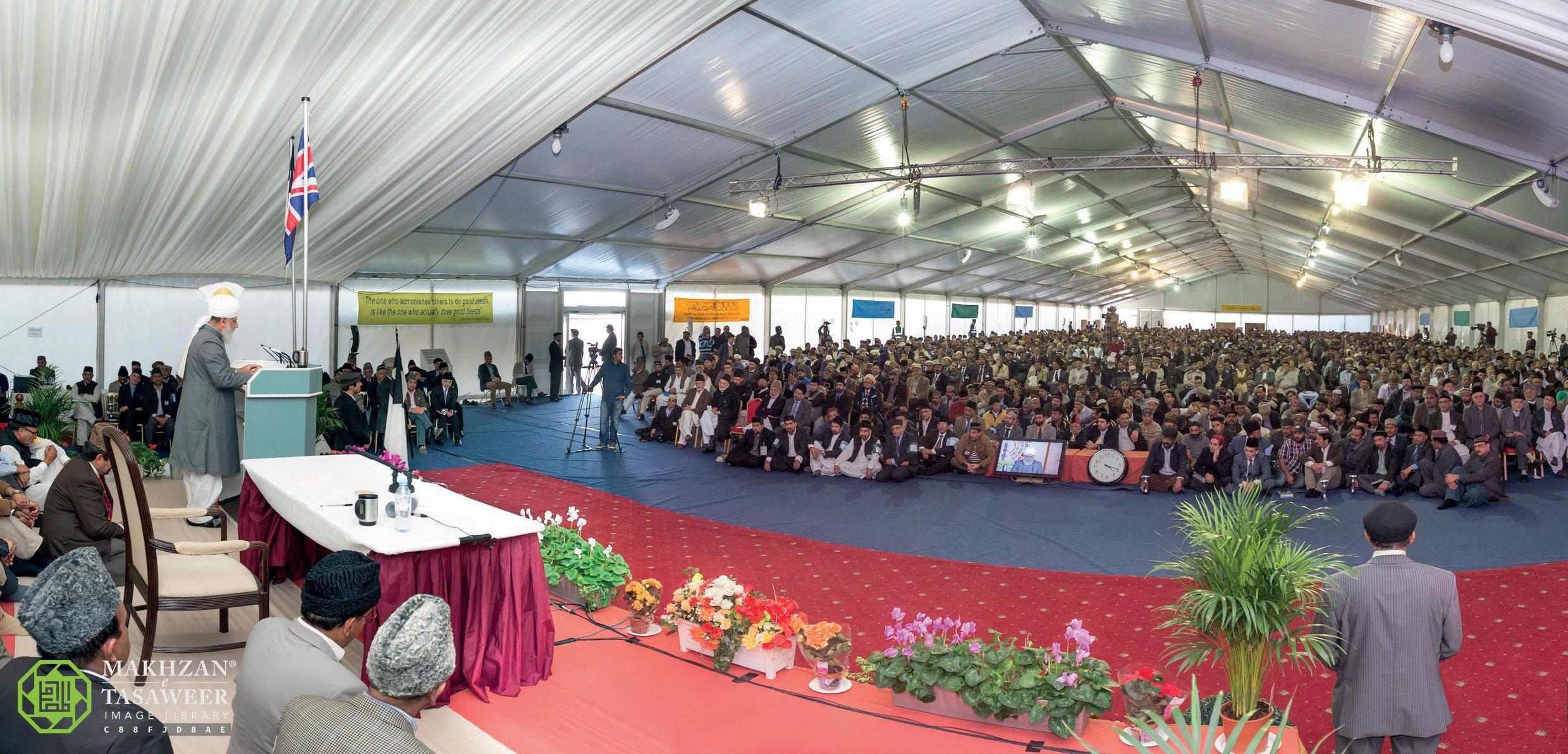
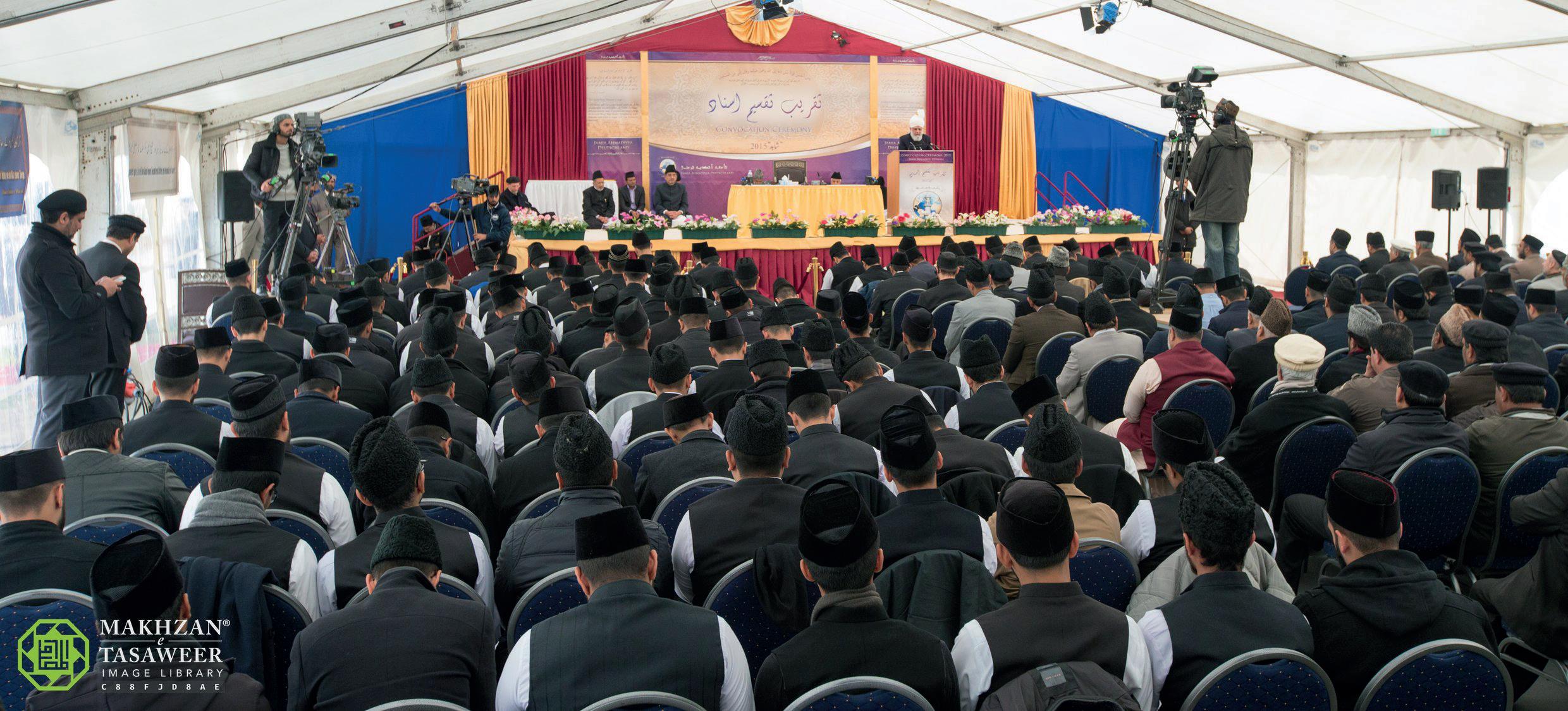
17 October 2008: During his Friday Sermon on this day, from the Khadija Mosque in Berlin, Hazrat Khalifatul Masih Vaa narrated the history of Jamaat-e-Ahmadiyya Germany and the history of this mosque as well. Huzooraa said:
“Alhamdulillah, Allah the Almighty has showered upon us His grace, in shape of this mosque, which is our first mosque in the eastern part of the country. The city of Berlin, which is the capital, has its own significance.”
Masih Vaa was welcomed to Canada’s Houses of Parliament by Prime Minister, Rt Hon Justin Trudeau, cabinet ministers and over 50 MPs and senators. Later in the day, Huzooraa delivered a historic keynote address entitled “Human values – The Foundation for a Peaceful World” to an audience of more than 225 people at a special reception held at the Sir John A. Macdonald Building at the Canadian Parliament in Ottawa.
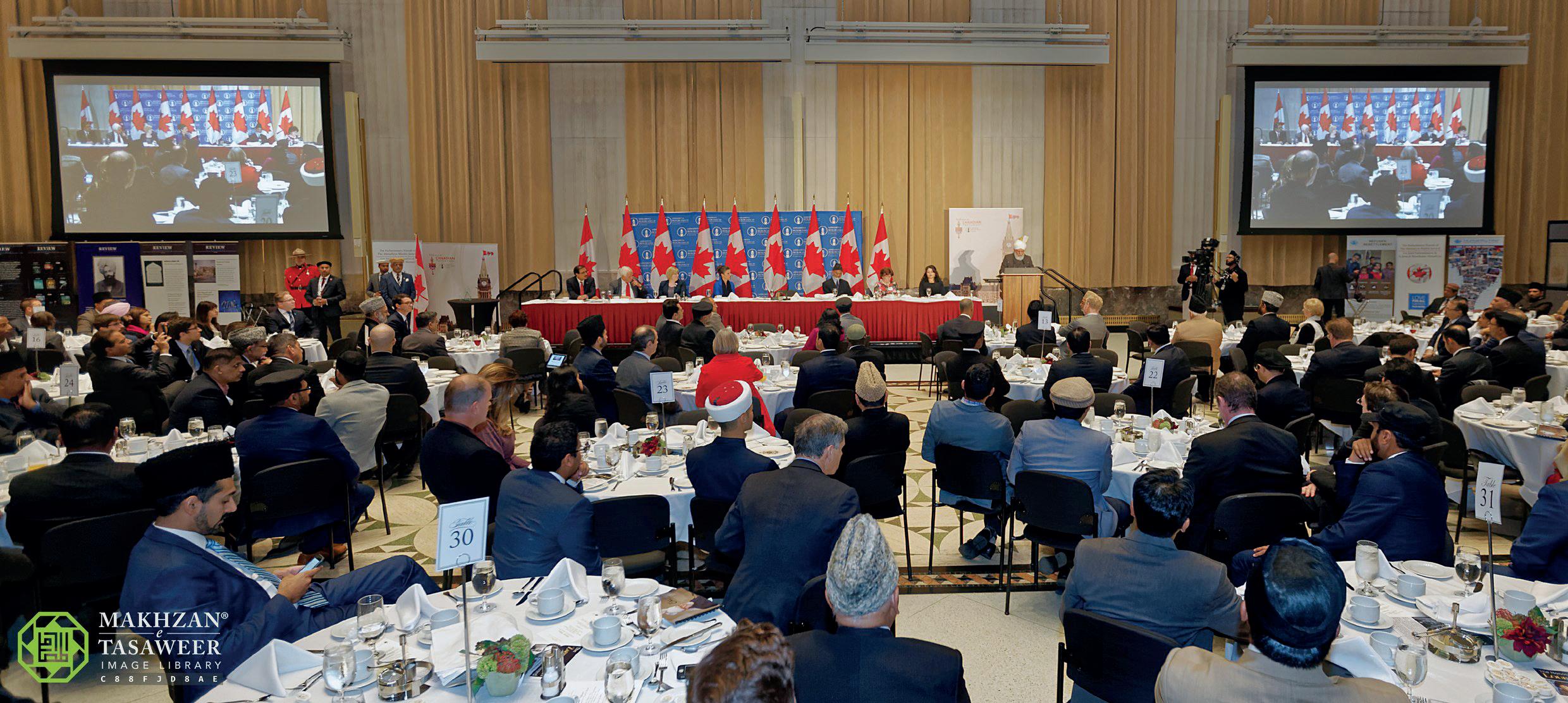
On the same day, Huzooraa was received by the Canadian prime minister at the Prime Minister’s Office in Ottawa.
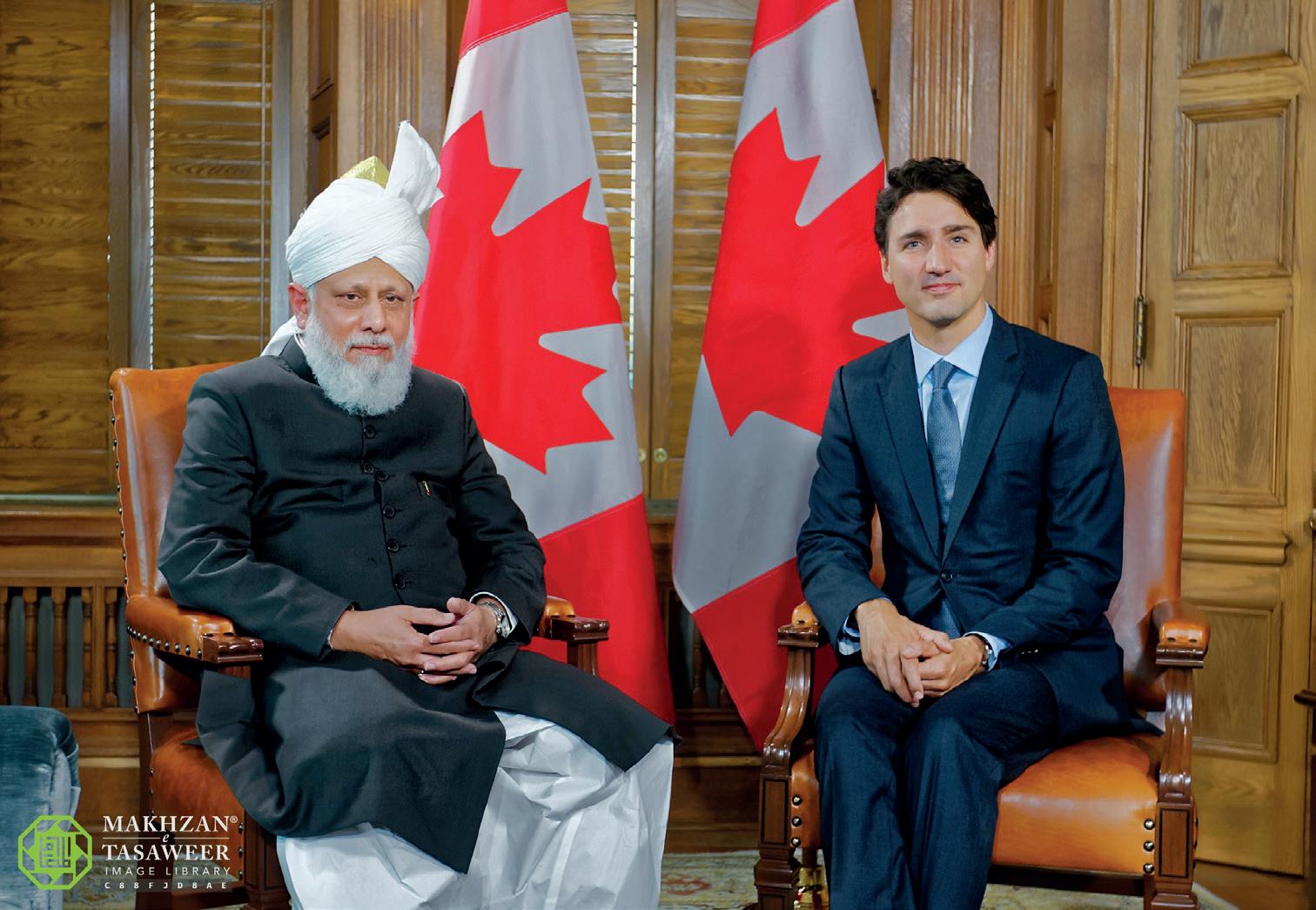

18 October 2013: Hazrat Khalifatul
Masih Vaa officially opened the Khilafat Centenary Hall, built next to the Baitul Huda Mosque in Sydney, with the keynote address at an inauguration reception. The event was attended by more than 200 non-Muslim dignitaries and guests, including a range of Federal and State Parliamentarians.
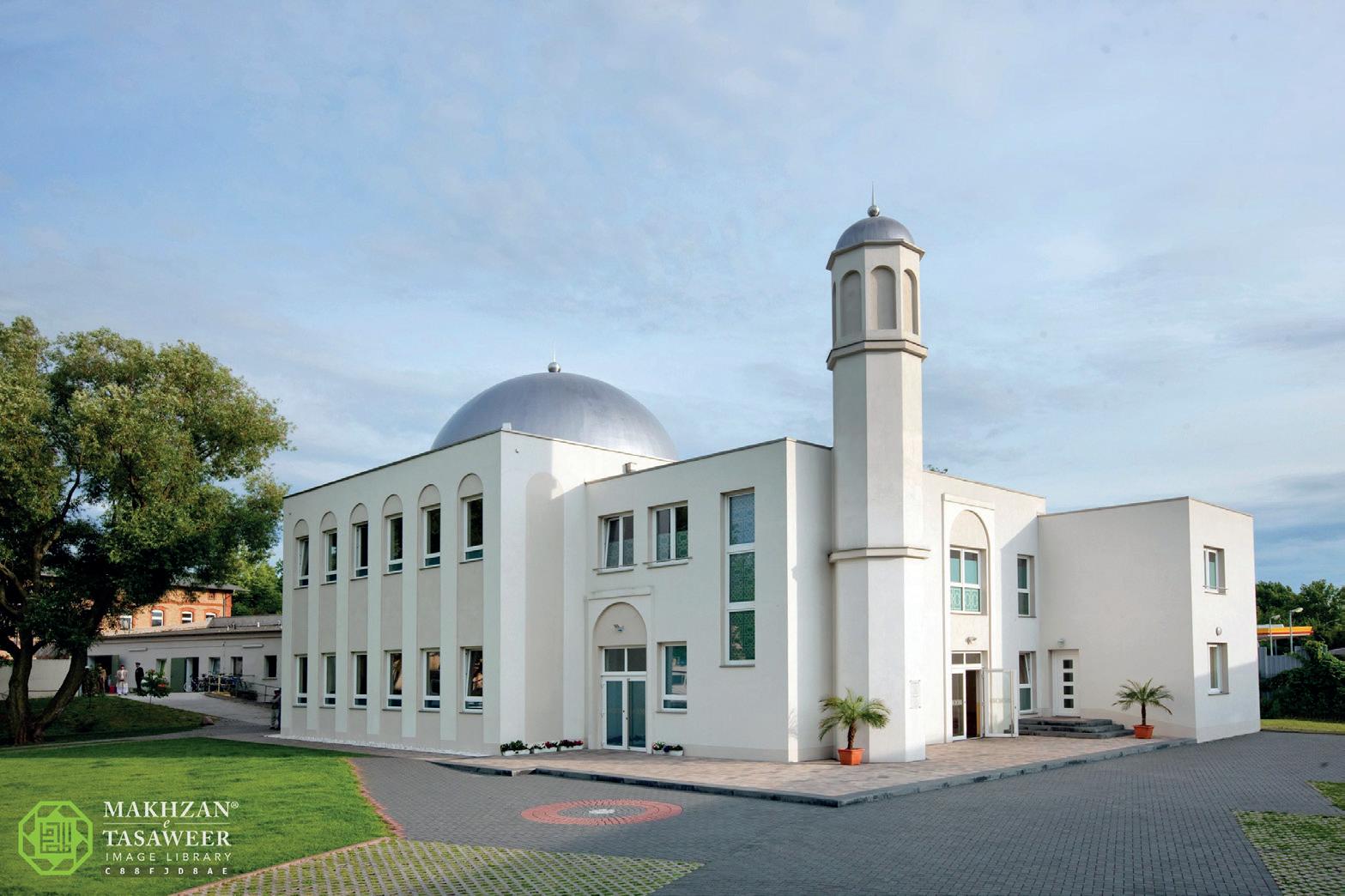
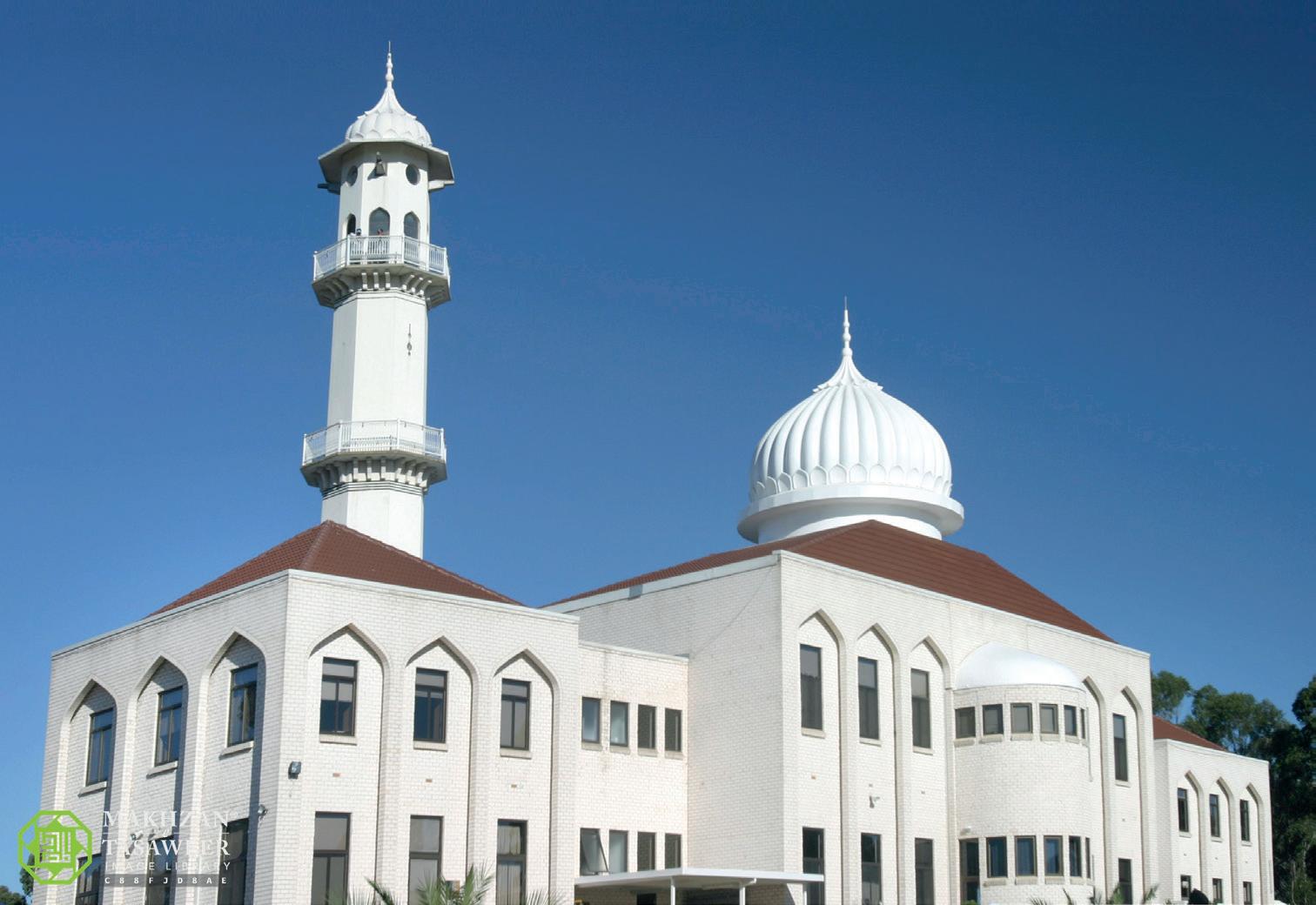
18 October 2015: Hazrat Khalifatul
Masih Vaa laid the foundation stone of Mubarak Mosque, the first Ahmadiyya mosque in the German town of Florstadt.
19 October 2014: Hazrat Khalifatul
Masih Vaa delivered the concluding address at the 32nd annual Ijtema of Majlis Ansarullah UK.
20 October 2006: During his Friday
Sermon on this day, Hazrat Khalifatul
Masih Vaa mentioned the martyrdom of Abdullah Niaz Sahib, an Ahmadi in Sri Lanka, who was serving as khadim masjid (caretaker) in an Ahmadiyya mosque. He was martyred on 14 October after being attacked with knives and swords. Another youngster was also attacked, resulting in injuries to both of his hands.
 Ata-ul-Haye Nasir Al Hakam
Ata-ul-Haye Nasir Al Hakam
The crisis the world is facing – energy shortages, economic unrest and the rising danger of a nuclear war – is not without a reason. Such problems occur mainly due to selfishness, injustice and power lust.
European countries are beginning to announce their plan of action to tackle the energy crisis as many countries have been dependent on Russia for gas supplies, which has been restricted following the war between Russia and Ukraine.
On 4 October 2022, two senior EU officials called for joint borrowing to help the 27-nation bloc navigate the energy crunch together after Germany faced criticism for going its own way with huge subsidies its peers could never afford. The energy price crisis is threatening a recession in Europe as it recovers from the Covid-19 pandemic.
“Germany, Denmark and the Netherlands have opposed a price cap, citing concerns over security of supply. They are also against joint borrowing – an echo of the EU’s long-standing divisions that have come to surface again over the twin energy and inflation crises.” (Pressure on Germany as energy crunch revives EU divisions over joint debt, Reuters, 4 October 2022)
It has been indicated that the UK government might push for power blackouts throughout the country, and it would most probably occur during peak hours. (What will happen if Britain has winter blackouts?, BBC, 8 October 2022)
On 9 October 2022, while responding to a National Grid warning of power blackouts in case enough energy is not imported, senior minister Nadhim Zahawi said:
“It is extremely unlikely, but it is only right that we plan for every scenario. But all I would say is, we have a buffer”, and thus, “I am confident that come Christmas, come the cold weather, we will continue to be in that resilient place.” (UK minister Zahawi: planned power cuts extremely unlikely, Reuters, 9 October 2022)
Before the Russian invasion of Ukraine, Italy was the second-largest importer of Russian gas in the EU, with imports making up 40% of its total supply. The government has announced buildings will face an extra 15 days without central heating, and the public is asked to turn their heating down by one degree, and off for an extra hour a day. (Europe energy crisis: Italians told to turn thermostats down, BBC, 8 October 2022)
In France, homes and offices will be heated to a maximum of 19 degrees Celsius, there will be no hot water in public buildings, and the temperature in swimming pools and gyms will also be reduced. (Ibid)
On 6 October, the French government unveiled its biggest energy conservation measures since the 1970s oil crisis, part of a Europe-wide effort to save power this winter. (Turtlenecks and Warmish Showers: France Seeks to Weather an Energy Crisis, The New York Times, 6 October 2022)
Spain has also mandated that heating should not rise above 19C and lights in shop windows must be turned off after 10 pm. Germany has stopped lighting up public monuments and buildings for aesthetic reasons and cautioned the public that heating may be turned off in the entrances, corridors and foyers of public buildings. (Europe energy crisis: Italians told to turn thermostats down, BBC, 8 October 2022)
On 11 October 2022, the IMF’s halfyearly World Economic Outlook (WEO) stated:
“Global growth will slow from 6% in 2021 to 3.2% this year and 2.7% in 2023. The prediction for 2022 is 0.4 percentage points lower than six months ago but unchanged on an updated forecast made in July.” (IMF tells central banks to focus on inflation as recession looms, The Guardian, 11 October 2022)
According to the IMF, the Russian invasion of Ukraine is continuing to destabilise the global economy:
“Beyond the escalating and senseless destruction of lives and livelihoods, it has led to a severe energy crisis in Europe that is sharply increasing costs of living and hampering economic activity.” (Ibid)
The IMF update states that “Germany and Italy will slip into recession next year, becoming the first advanced economies to contract in the wake of the Russia-Ukraine conflict. The German economy is now expected to shrink by 0.3 per cent in 2023.”
As for the Russia-Ukraine conflict, we are witnessing that it is only intensifying. President Vladimir Putin ordered Russia’s first mobilisation since World War II and backed a plan to annex swathes of Ukraine, warning the West he was not bluffing when he said he would be ready to use nuclear weapons to defend Russia.
Ukrainian president Zelenskyy was asked how the international community could help prevent a potential nuclear war between Russia and Ukraine. In response, he said:
“We can already see that these people are capable of such atrocities. What must NATO do? Make it impossible for Russia to use nuclear weapons.”
He added:
“But what is [more] important, I am once again turning to the international community, as I did before Feb 24, to do preventative strikes so that they know what will await them if they use [nuclear weapons].” (Ukraine’s Zelenskyy calls for NATO to launch ‘preemptive strikes’ in Russia, spokesperson forced to clarify, Fox News, 7 October 2022)
On seeing an uproar in reaction to this statement, Zelenskyy’s spokesperson had to explain later that the president was calling for preventive sanctions against Russia to prevent the use of nuclear weapons. (Ibid)
On 7 October 2022, US president Joe Biden said Putin was “not joking” when he spoke of using tactical nuclear weapons after suffering setbacks in Ukraine:
“For the first time since the Cuban Missile Crisis, we have a direct threat to the use of nuclear weapons, if, in fact, things
continue down the path they’ve been going.” (Ukraine war: Biden says nuclear risk highest since 1962 Cuban Missile Crisis, BBC, 7 October 2022)
On 8 October, a powerful blast damaged Russia’s road-and-rail bridge to Crimea, hitting a prestigious symbol of its annexation of the peninsula and the key supply route to forces battling to hold territory captured in Southern Ukraine.
Crimea’s Russian governor Sergei Aksyonov said:
“The situation is manageable – it’s unpleasant, but not fatal,” and “Of course, emotions have been triggered and there is a healthy desire to seek revenge.” (Russian divers to inspect Crimea bridge as governor warns of ‘desire to seek revenge’, The Guardian, 9 October 2022)
On the Telegram channel of Russia’s foreign ministry, spokeswoman Maria Zakharova said:
“The Kyiv regime’s reaction to the destruction of civilian infrastructure demonstrates its terrorist nature.” (Key bridge from Russia to Crimea reopens after being partially destroyed in explosion, Sky News, 9 October 2022)
Ukrainian officials had repeatedly threatened to strike the bridge and some lauded the attack, but Kyiv has stopped short of claiming responsibility. (Ibid)
On 10 October, Russia conducted missile strikes on Ukraine and the Russian defence ministry said they were aimed at “all designated targets” on Ukrainian military, communications and energy infrastructure. It was said that the goals of the missile strikes had been achieved in one of the largest coordinated Russian attacks against Ukraine since the first weeks of the war. On the other hand, Ukraine said the rush-hour attacks in eight regions appeared to have been deliberately timed to kill people, accusing Russia of terrorism. (Russia’s defence ministry: All targets hit in massive missile strikes on Ukraine, Reuters, 10 October 2022)
Following this, the Ukrainian energy ministry said it will halt exports of electricity to the European Union following Russian missile strikes on energy infrastructure on Monday:
“Today’s missile strikes, which hit the thermal generation and electrical substations, forced Ukraine to suspend electricity exports from Oct. 11, 2022 to stabilize its own energy system.” (Ukrainian energy ministry halts electricity exports due to Russian missile strikes, Reuters, 10 October 2022)
The European Commission President, Ursula von der Leyen said Russia stood for “terror and brutality”, and Joe Biden spoke
with the Ukrainian president and “pledged to continue providing Ukraine with the support needed to defend itself, including advanced air defence systems.” (Ukraine war: US condemns ‘brutal’ Russian strikes on Ukraine, BBC, 11 October 2022)
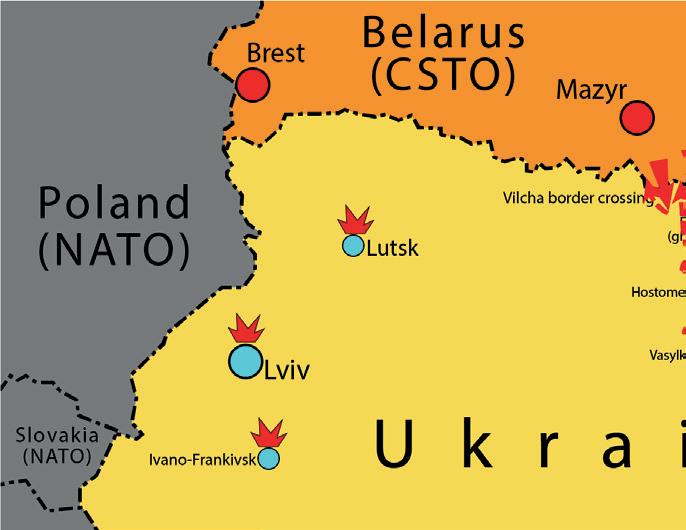
On 11 October, the Secretary-General of NATO Jens Stoltenberg pledged to boost the protection of critical infrastructure in response to the damage to the Nord Stream gas pipelines. The EU believes three leaks in the pipelines last month were the work of sabotage and suspicion has fallen on Russia, but it is not known for sure who was responsible. Mr Stoltenberg said that NATO has doubled its presence in the Baltic and the North Sea to more than 30 ships, supported by aircraft and undersea activities. (Attack on NATO energy supplies would provoke ‘united and determined response’, alliance chief vows, Sky News, 12 October 2022)
It is evident that the provocative statements and actions from both sides are paving the way for an impending disaster.
On the other hand, North Korea launched a barrage of missile weapons tests between 25 September to 9 October in response to the US deploying its nuclearpowered aircraft carrier, the USS Ronald Reagan, to waters around the Korean peninsula and holding joint drills with South Korea and Japan.
The acceleration marked a significant change from when Pyongyang pursued denuclearisation talks with then US President Donald Trump between 2018 and 2019. Analysts say North Korea is also reacting in response to South Korea’s President Yoon Suk-yeol, who was elected in May and has pursued a more hawkish stance towards the North and closer ties with the US. (North Korea says missile launches were nuclear attack simulation on South, BBC, 11 October 2022)
The Japanese vice defence minister, Toshiro Ino, said these activities were “absolutely unacceptable” as they threaten regional and international peace and security. The US Indo-Pacific Command said in a statement that the launches did not pose any immediate threat to US personnel or territory. However, it highlighted “the destabilising impact” of North Korea’s ballistic missile programmes. It said the US commitments to the defence of South Korea and Japan remained “ironclad”. (North Korea fires two more ballistic missiles after South Korea and US navy drills, The Guardian, 8
October 2022)

On 8 October 2022, North Korea’s defence ministry warned that Reagan’s redeployment was causing a “considerably huge negative splash” in regional security. North Korea has argued it was forced to pursue a nuclear weapons programme to cope with US nuclear threats. (Ibid)
World leaders need to realise the gravity of this situation since it is the make-or-break moment for not only the contemporary world but for future generations as well. World leaders must learn from the past and stay firm on their pledge made earlier this year, when five of the world’s most powerful nations – the US, Russia, China, the UK and France – agreed that “a nuclear war cannot be won and must never be fought”. (Five of world’s most powerful nations pledge to avoid nuclear war, The Guardian, 3 January 2022)
If the world leaders fail to remain loyal to this pledge, the world could face huge devastation, about which Hazrat Mirza Masroor Ahmad, Khalifatul Masih Vaa has been warning the world for the past two decades.
He has been a lone – yet divinely inspired – voice that has warned the world about an impending disaster, powerful enough to shake humanity to its core. Despite naysayers and sceptics, Huzoor’s words have proved true; analysts now agree that the threat of nuclear war is not an exaggeration.
Hazrat Mirza Masroor Ahmadaa has given Islamic solutions for establishing a lasting peace, which include upholding absolute justice, shunning vested interests and turning to God Almighty as a means for lasting peace and morality.
During his Friday Sermon on 9 May 2003, while warning of the horrific consequences of atomic warfare, Hazrat Khalifatul Masih Vaa said:
“These incidents [of nuclear devastation] were witnessed in the Second World War even when those atomic bombs were of low capacity. Now, much more powerful atomic bombs have been developed. It is apparent from the current situation of the world that it is hastily moving towards destruction. Therefore, as always, it is the responsibility of Jamaat-e-Ahmadiyya which has a deep love for humanity, that they should pray and pray fervently to save humanity. May the world recognise God and save itself from destruction as much as possible.” (Khutbate-Masroor, Vol. 1, p. 30)
On 24 March 2012, during his keynote
address at the 9th Annual Peace Symposium of Jamaat-e-Ahmadiyya UK, Huzooraa said:
“Japan is the one country to have experienced the abhorrent consequences of atomic warfare, when it was attacked by nuclear bombs during the Second World War […] The nuclear bombs that were used at that time and which caused widespread devastation, were much less powerful than the atomic weapons that are possessed by even very small nations today […] Let it be clear that if nuclear weapons are used again today, then it is quite possible that parts of certain countries could be completely wiped off the map. They could cease to exist.” (The Devastating Consequences of a Nuclear War and the Critical Need for Absolute Justice, www.reviewofreligions.org)
On 24 February 2022, when Russia invaded Ukraine, Huzooraa stated in a press release:
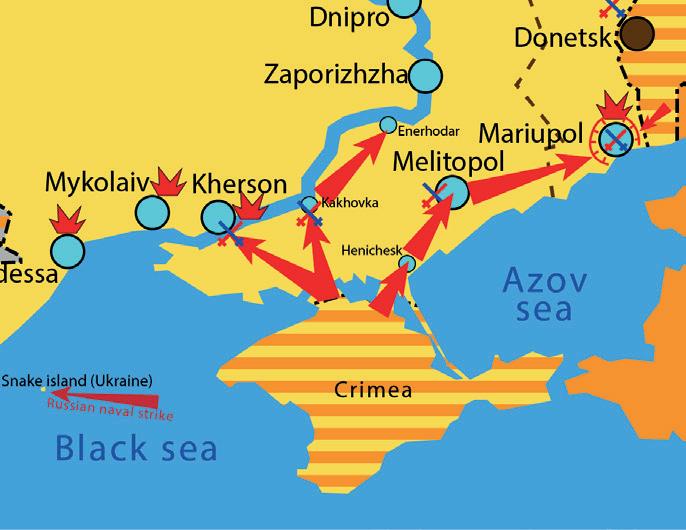
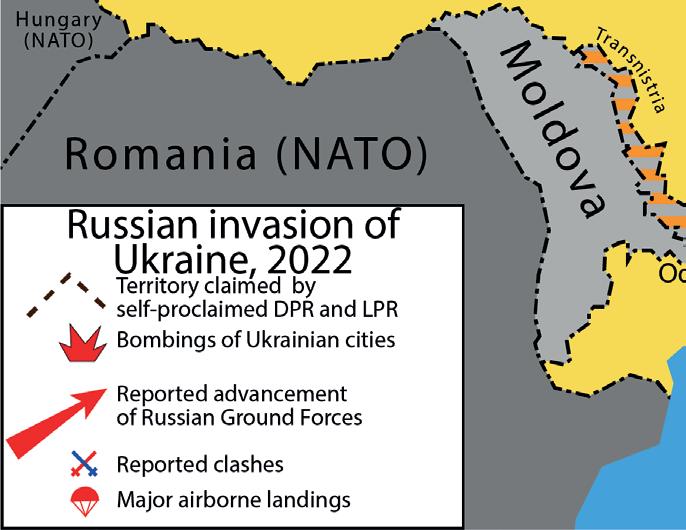

“For many years, I have warned the major powers of the world that they must heed the lessons from history, particularly in relation to the two catastrophic and devastating world wars that took place in the 20th century. In this regard, in the past, I have written letters to the leaders of various nations urging them to set aside their national and vested interests in order to prioritise the peace and security of the world by adopting true justice at all levels of society. Most regrettably, now a war in Ukraine has started and so the situation has become extremely grave and precarious. Furthermore, it has the potential to escalate even further depending on the next steps of the Russian government and the response of NATO and the major powers.
“Unquestionably, the consequences of any escalation will be horrific and destructive in the extreme. And so, it is the critical need of the hour that every possible effort is made to avoid further warfare and violence. There is still time for the world to step back from the brink of disaster and so, for the sake of humanity, I urge Russia, NATO and all major powers to concentrate all their efforts on seeking to de-escalate the conflict and working towards a peaceful solution through diplomacy.” (Statement of World Head of the Ahmadiyya Muslim Community Regarding Russia-Ukraine Crisis, www.pressahmadiyya.com)
On 21 August 2022, during his concluding address at Jalsa Salana Germany, Huzooraa said the reason behind the global disharmony and unrest was that the intentions and aspirations of people were not pure.
Huzooraa said that, undoubtedly, the world leaders expressed their disliking for warfare, but what they actually meant was, “If someone fights with us, then it is bad”, and “If we start warfare, then it is not bad.” This was all because they had no fear of their Creator, Who had the power to provide peace to the world. (Al Hakam, 26 August 2022, Issue 232, p. 2)
On 8 October 2022, during his keynote
address at the inaugural reception of Baitul-Ikram Mosque, Huzooraa said:
“Unquestionably, today the world teeters on the brink of disaster, as nations around the world are engulfed by a ferocious storm of political, economic and social unrest. The war in Ukraine has been raging for months and dark clouds indicating even greater turmoil and warfare are hovering ominously above us. Opposing political blocs and alliances have become progressively entrenched, as the world becomes increasingly polarised. The result is that the peace and security of the world is unravelling by the day.”
Huzooraa further said:
“Until recently, threatening to unleash nuclear weapons was considered unthinkable, but now such threats are uttered on an almost daily basis. […] There is no doubt that if a global war erupts, it will be unlike anything the world has ever seen. Surely, its catastrophic and
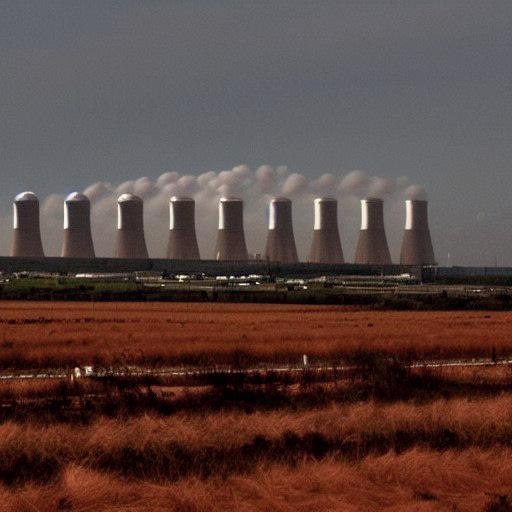
devastating consequences are far beyond our comprehension. Many countries have acquired state of the art weapons that have the deadly capacity to kill thousands upon thousands of people with just one strike. It will not just be us who endure the pain and who grieve, rather our children and future generations will suffer for our sins and their lives will be destroyed through no fault of their own.”
Huzooraa added:
“Undoubtedly, those innocent souls will look back at us with contempt. They will lament why their forefathers let their egos and selfish ways drive them toward destructive wars that left their future generations physically, emotionally and economically crippled. So, my ardent request and message to the world is that we must set aside our differences and work tirelessly to foster peace in society so that we may save our future generations, rather than, God forbid, sentence them to lives filled with nothing except misery and despair.” (Reception Held For New Ahmadiyya Mosque Opened In Dallas, U.S.A. By Head Of The Ahmadiyya Muslim Community, www.pressahmadiyya.com)
The world is on the edge of a nuclear disaster between nations. May Allah enable world leaders to pay heed to the most sincere advice and guidance given by the Ahmadiyya Khalifa, Hazrat Mirza Masroor Ahmadaa





 Awwab Saad Hayat Al Hakam
Awwab Saad Hayat Al Hakam
Pioneer Ahmadi Muslim missionaries, over their lifetimes of dedication to Islam, bore numerous struggles in the line of duty. They gave precedence to faith over earthly delights and no matter the circumstances, readied themselves to overcome any tempest, physical hardship and life-threatening situations in remote villages and remote settlements.
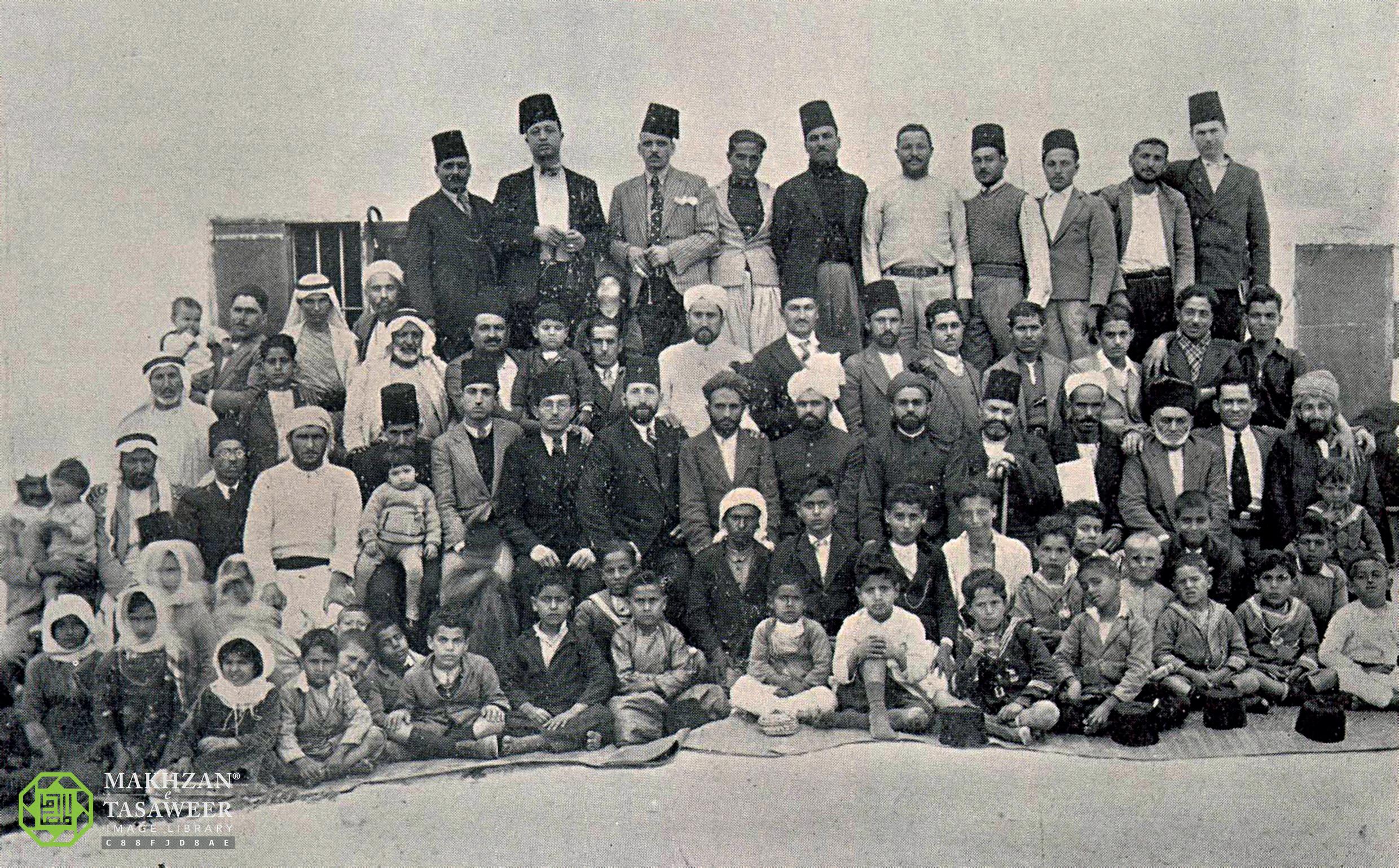
Hazrat Maulana Jalaluddin Shams’ jihad of arguments in the Middle East
Concerning the foundation of the Jamaat’s mission in Damascus and the extraordinary developments that followed, it is recorded that Hazrat Maulana Jalaluddin Shamsra, aside from leading a fruitful jihad of logical arguments against Christianity, also debated with Muslim scholars who opposed the Jamaat in Damascus. There, the Muslim clerics were exceptionally disturbed at witnessing the foundation and flourishment of Ahmadiyyat in the country. The opposition responded in the same manner that opponents of truth were accustomed to. In December 1927, a murderous attack was made on Hazrat Maulana Jalaluddin Shamsra. Recalling his time there and this particular incident, Hazrat Maulana Jalaluddin Shamsra narrated that he started receiving death threats via letters. After publishing a tract entitled Al-Jihad al-Islami, in which he proved fighting in the name of religion was not permissible in this era and that this age was the age of preaching with logical arguments, he received a letter from Muslim clerics stating, since he declared religious jihad and fighting for religion as unlawful in this era, it was obligatory on them to shed his blood.
Hazrat Maulana Jalaluddin Shamsra related an incident of 22 December 1927. After performing the Maghrib prayer, he went out to get some food from a nearby shop. On his return, he sensed someone was following him. As he attempted to escape, he was viciously attacked from behind with
a dagger. His neighbour’s door was open, he quickly entered and shouted that he had been attacked. He was bleeding profusely and fell unconscious in the doorway of his house. As the police arrived, he was immediately taken to the hospital.
At the time of the attack, Hazrat Maulana Jalaluddin Shamsra was wearing a thick coat due to the severe cold weather. The dagger wound was deep. However, by the sheer grace of Allah, it did not reach his vital organs. A telegram was sent to Hazrat Khalifatul Masih IIra informing him of this incident. Through the grace of Allah, the prayers of Hazrat Khalifatul Masih IIra and the Jamaat, Hazrat Maulana Jalaluddin Shamsra survived.
Hazrat Maulana Abul Atara saved by the Mighty God
Hazrat Maulana Abul Ata Jalandharira was born in 1904. His father had accepted Ahmadiyyat in 1902 at the hand of the Promised Messiahas
Hazrat Maulana Abul Atara was a devout servant of the Jamaat who served as Principal of Jamia-tul-Mubashirin – later Jamia Ahmadiyya – as Additional Nazir Islah-o-Irshad for Talim-ul-Quran & Waqfe-Arzi. He also had the honour of serving as a missionary in the Holy Land and other Arab countries from 1931-1936.
During his years of service in Palestine,
opponents conspired to have him murdered. Abdullah Asad Odeh Sahib of Jamaat Kababir recorded this incident in his book, Al-Kababir – Baldi, published in 1980.
In this book, the unsuccessful conspiracy, which was planned by some wicked people of Haifa, is mentioned.

One night, some armed men sat in ambush to murder Hazrat Maulana Abul Atara as he was returning from Kababir. As these mischievous men attempted to open fire, by Allah’s decree, their guns jammed. One of the participants in this conspiracy later confessed to this incident.
Born in 1903, Maulana Ghulam Hussain Ayaz received his early education in Faizullah Chak. Soon after completing his primary education, he joined Madrasae-Ahmadiyya. Upon passing Maulvi Fazil from Punjab University, he devoted his life
to the services of the Jamaat.
On 6 May 1935, a convoy of missionaries, serving under the Tahrik-e-Jadid scheme, left Qadian. This group included Maulvi Ghulam Hussain Ayaz Sahib who was sent to preach in the states of Singapore; Strait of Malacca and Nipiang. Only travel expenses were given to him at the time of departure. He was self-sufficient and accomplished his duties for a long time without any financial aid. He went to Malaya from Singapore on 14 March 1936 and toured many cities and distributed leaflets about Islam Ahmadiyya in English and Malay while facing great opposition. He continued to convey the message of Ahmadiyyat in different islands, states and cities. Seeing the signs of success, the opposition heated up in Malaya in mid1937.
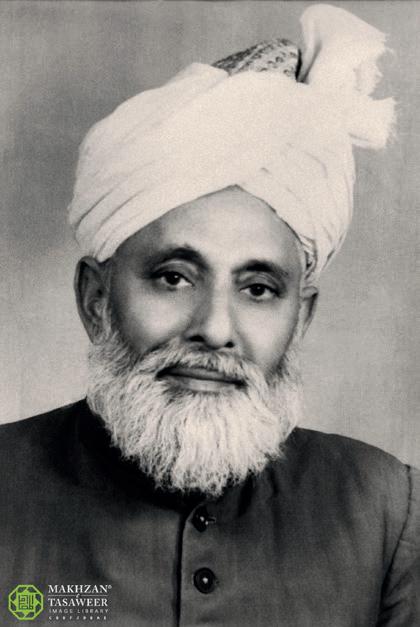
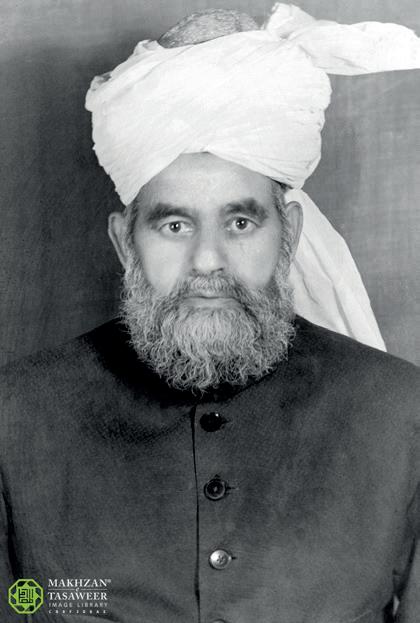
Muhammad Naseeb Arif Sahib, who was imprisoned in Singapore during World War II, wrote in one of his articles that Maulvi Ghulam Hussain Ayaz Sahib endured many hardships as an Ahmadi missionary. Once, opponents attacked his house and he was compelled to remain inside his house for many days, deprived of food and other necessities. The police also blacklisted him in government records.
1943 and 1944 were financially very difficult for Maulvi Ghulam Hussain Ayaz Sahib. In 1945, the financial condition improved.
that at the time of his return from Singapore, when he asked Maulvi Ghulam Hussain Ayaz Sahib to come along with him, Maulvi Ghulam Hussain Ayaz Sahib respond ed that without the permission of the Khalifa he considered it a sin to move even a step from his posting. He didn’t even say to deliver a message to his family, but instead conveyed his greetings to Hazrat Khalifatul Masih IIra and requested prayers.
When Muhammad Naseeb Arif Sahib returned to India after his release from prison, he gave Maulvi Ghulam Hussain Ayaz Sahib’s greetings to Hazrat Musleh-
e-Maudra. He also went to Maulvi Ghulam Hussain Ayaz Sahib’s house and saw that Maulvi Sahib’s daughter, who was two or three months old when Maulvi Ghulam Hussain Ayaz Sahib departed, was now thirteen years old.
The hardships endured by early missionaries also came with the fruits of their labour. Through Maulvi Ghulam Hussain Ayaz Sahib’s preaching efforts, on 11 January 1946, Muhammad Yunus Farooq Sahib accepted Ahmadiyyat. He returned to India after staying in Singapore for about five months. Muhammad Yunus Farooq Sahib wrote a letter to Hazrat Musleh-e-Maudra in which he highlighted the positive impact Maulvi Ghulam Hussain Ayaz Sahib had on him. He wrote that his hard work had a great impression on his heart; he worked so hard in the service of religion that he became old early. Despite his health, he remained busy preaching and calling people to Allah. His daily work routine began at four in the morning and he worked throughout the day
till 11 at night. During this period, he did not get even an hour of rest. Throughout the day, he busied himself translating some literature of the Jamaat into Malay and sometimes he would prepare an article. Throughout the day, writes Muhammad Yunus Farooq Sahib, there would be a barrage of questions and objections which Maulvi Sahib would answer and explain.
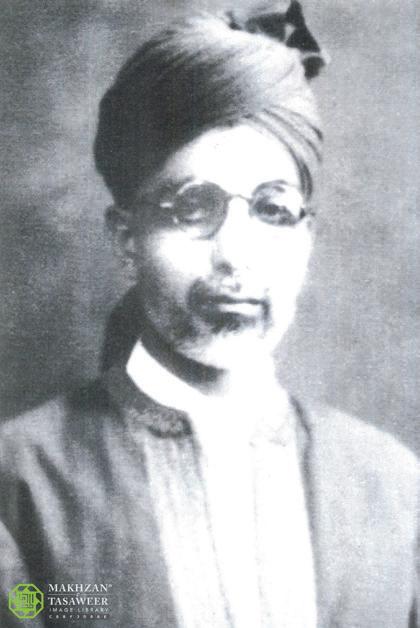
He spent a great deal of time looking after the moral training and education of the Ahmadi children of Malaya. There was a lot of propaganda against Ahmadis and a greater number of people were fierce enemies. Once, enemies invited Maulvi Ghulam Hussain Ayaz Sahib to their mosque or their house for preaching and when he went, they beat him mercilessly.
Maulvi Ghulam Hussain Ayaz Sahib was not disheartened even in the most difficult situations. Seeing the result of his tireless efforts, said Muhammad Yunus Farooq Sahib, one is compelled to acknowledge no less than a miracle of Ahmadiyyat. He not
only established the Jamaat there but also perfected the moral training and upbringing of the members of the Jamaat.
Hazrat Khalifatul Masih IIra, whilst mentioning the sacrifices of Maulvi Ghulam Hussain Ayaz Sahib and his wonderful results, said that in Malaya, Maulvi Ghulam Hussain Sahib Ayaz would face severe opposition; however, by the grace of Allah and the sacrifices of Maulvi Ghulam Hussain Ayaz Sahib, those who returned from Malaya have said around 70-80 wellto-do hotel owners and respectable people had accepted Ahmadiyyat and the Jamaat was growing day by day.
Maulvi Ghulam Hussain Ayaz Sahib left Qadian, India for Singapore on 6 May 1935 and returned to Rabwah, Pakistan (as the headquarters of the Jamaat had moved to Pakistan following the partition) 15 years later, on 24 November 1950. He was later posted to Singapore again on 8 October 1956. After living in Singapore for some time, he was posted in Borneo and passed away in October 1959.
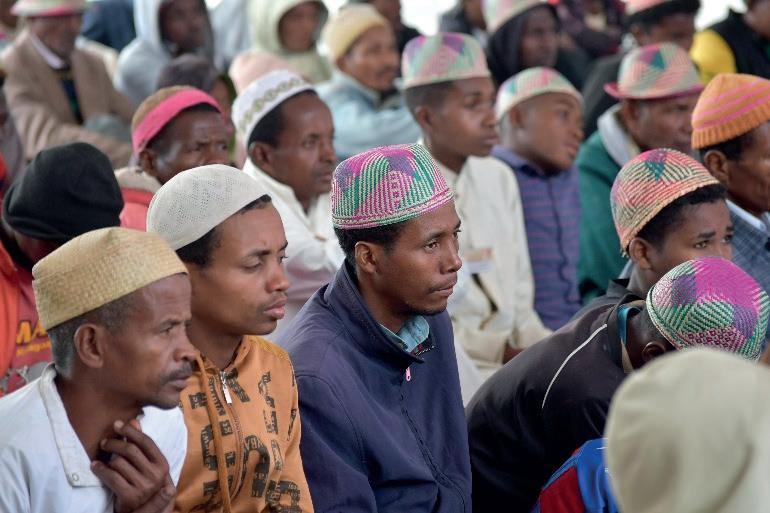
Jamaat-e-Ahmadiyya Madagascar held its 16th Jalsa Salana in the capital city, Antananarivo on 23 and 24 September 2022. A letter for prayers was written to Hazrat Amirul Momineenaa and then a Jalsa committee was formed and the regional missionaries, along with the local mu‘allimeen began educating Jamaat members on the importance of Jalsa Salana.
The programmes for the Jalsa were prepared in Malagasy as well as in the Urdu. In total, ten speeches were delivered in Malagasy and Urdu.
The Noor Mosque and the Jalsa site were decorated with different banners. Government officials, representatives of the print and electronic media, and some tabligh contacts were sent invitations to attend the Jalsa.
The Jalsa proceedings were held in both the men’s and women’s Jalsa Gah separately. The accommodation for the guests was arranged at the Ahmadiyya College. Some of the Jalsa guests had travelled around 1,050 km to attend this blessed gathering.
The first day of Jalsa Salana Madagascar commenced with the Tahajjud prayer, followed by Fajr prayer and Dars-ul-Quran
in the Malagasy language.
In the afternoon, the flag-hoisting ceremony was held, which was followed by silent prayer. Some Arabic and Urdu poems were presented by Atfal, Khuddam, Ansar and Lajna separately.
Thereafter, all the participants proceeded to the Jumuah and Asr prayers, which were followed by lunch. The attendees listened to the Friday Sermon delivered by Hazrat Amirul Momineenaa live and its Malagasy translation was also available.
The third session of the Jalsa commenced with the recitation of the Holy Quran with Malagasy and Urdu translations, followed by two Urdu poems with their Malagasy translations.
This was followed by two speeches and two Urdu poems. After this, Maghrib and Isha prayers were offered, followed by dinner.
The second day of Jalsa Salana Madagascar commenced with the Tahajjud prayer, followed by Fajr prayer and Dars-ulQuran in the Malagasy language.
In the morning, the fourth session commenced with the recitation of the Holy Quran with Malagasy and Urdu translations. This was followed by five poems and three speeches. The fifth session started later in which some government officials, representatives of the electronic and print media and some tabligh contacts were invited.
The Vice-Commissioner of the Anti-Terrorism Department, the Commissioner of the Airport Police, the President of the local municipality and some officials of the Education Department were among the guests.
The session
commenced with the recitation of the Holy Quran, an Urdu poem and Arabic Qaseedah, followed by two speeches. Then, the principal of the Ahmadiyya College presented the annual report of the college, mentioning how it was endeavouring to impart knowledge and discipline to the deprived fractions of society and how the Jamaat is helping them.
Thereafter, the esteemed guests spoke to the gathering and expressed how they were influenced by learning the true peaceful Islamic teachings, which are full of good morals, fraternity, peace and cooperation. They expressed that they had found true Islam and Christianity to be close, and they thanked the Jamaat for inviting them.
Then, the national president and
missionary-in-charge presented the annual report of Jamaat-e-Ahmadiyya Madagascar.
After lunch, a press conference was held, at which two TV channels, five radio stations and seven newspapers were present. They asked about the peaceful Islamic teachings, how the Jamaat was helping its fellow citizens, the objectives of the Jalsa Salana, and how the Ahmadiyya College was working and serving the population.
The Jalsa Salana was attended by around 650 members and 27 guests. The Jalsa proceedings were covered by two TV channels, five radio stations and seven newspapers, and the message of Islam Ahmadiyyat reached an estimated 9 million people.
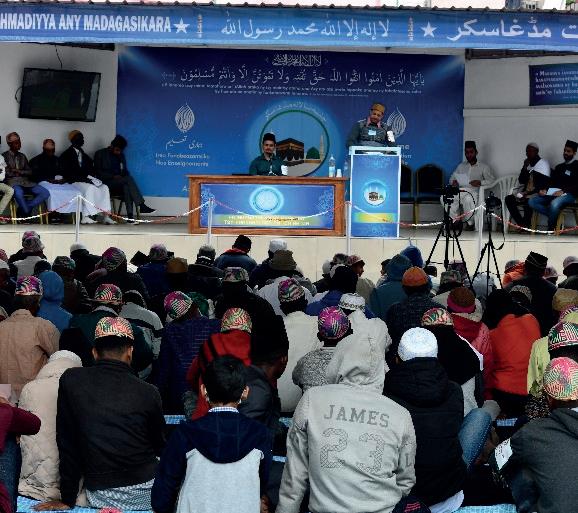
Alhamdolillah! God be praised, that the Mosque is now complete with its dome outside and arch and necessary furnishings inside. A picture of the Mosque and Mission House is given on page 126 of the Magazine. We are thankful to our Ahmadi brothers in India for the prompt remittance of their share of the donation to the Mosque and to the brothers here who have helped and are still helping towards the expenses of the Mosque and the [Mission] House.
Since the last magazine was published, I have delivered many lectures in different churches and halls in the city of Chicago, in addition to our regular meetings now held in the Mosque. Thanks are due to Attorney H Wilcox, Lady Marion, Reverend Thomson, Mrs Maddox, Mrs Huegl and other workers for allowing me to use their halls and churches for lectures and talks.
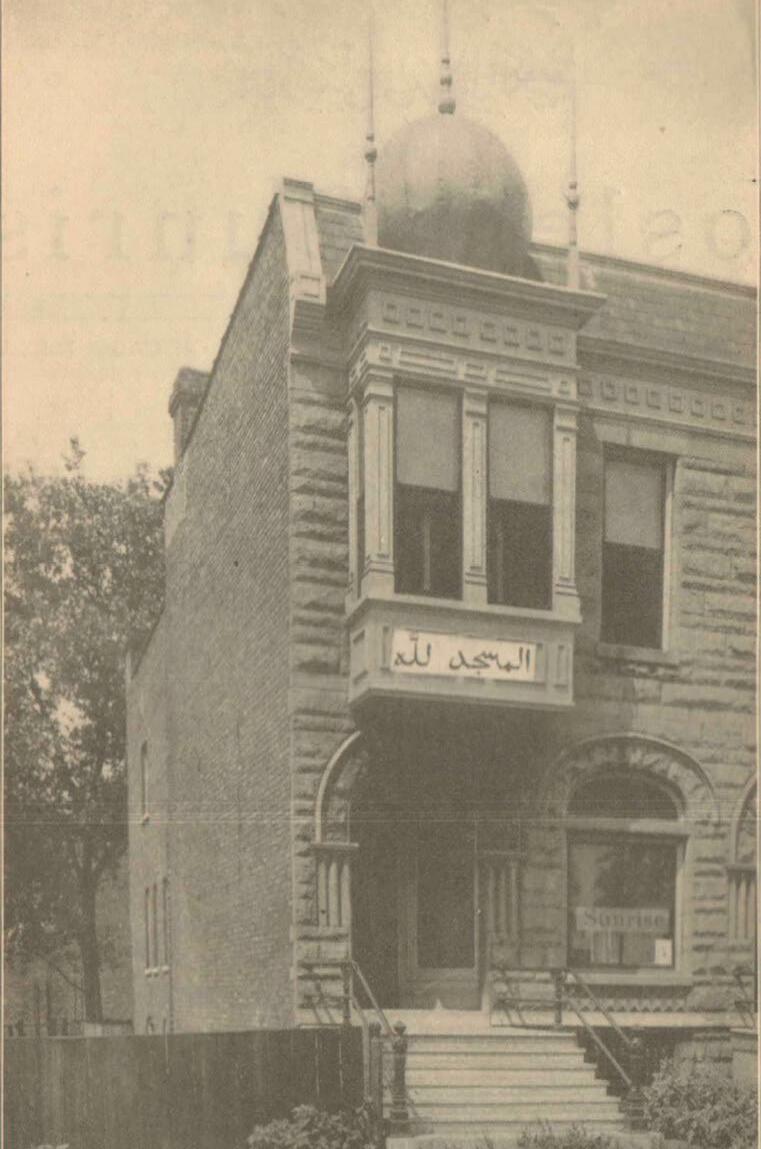
The correspondence during the last quarter was carried on to the extent of about 400 receipts and 3,500 dispatches. Hundreds of leaflets were distributed by hand in the city. Missionary epistles were written on behalf of the Ahmadiyya Order in America and some literature was sent to many celebrities, including:
1. Dr Nehemiah Boynton of the World’s Alliance for International Friendship through the Churches,
2. Stinnes, the famous German financier, and
3. Shaikh-ul-Islam Haidry Zade Ibrahim Effendi of Constantinople.
Our short address registered at the Chicago Telegraph Office is “Almasjid-Chicago.” Any cablegram from India or any other country with these words will reach us safely, InshaAllah. The full address is not necessary for telegrams and cablegrams.
Since the last report published in The Moslem Sunrise for July 1922, the following ladies and gentlemen have accepted Islam and joined the Ahmadiyya Movement. Their new Moslem names are given along with their old American names:
Mr Thomas Haynes (Abdul Kadeem); Mr Eddie Buford (Ilm Deen); Mr G Gray (Islam Deen); Miss Elsie Green (Sleema); Mrs Ruth Proctor (Hameeda); Miss Elma Pope (Kubra); Miss Helen Pope (Sughra); Mr Pope (Kabeer); Mr James Conwell (Abdullah); Mrs Emma Feliciq Conwell (Amatullah); Reverend JH Gibson (Imadud-Deen); Mr James H Daniels (AbdulQadir); Miss Annabella Ross (Amina); Mrs Virginia L Clarke (Rasheeda); Mr
John Sanders (Abdur Rahman); Mr Robert Lee Whitsett (Abdul Kareem); Mr Charles Pelusa (Akhtar); Mr Otto Gall (Akram); Mrs Mattie Brown (Haleema); Miss Boulus Moroon (Noora); Mr Denzil Carr (Abdullah Omar); and Mr FJE Blackwood (Hilawl).
1. An editor of The Chicago Defender attended one of our Sunday meetings and wrote a one-column report in his weekly Defender 19 August 1922. Not being wellversed in the Oriental thought, he made some mistakes as all the Westerners do while writing on the East.
a) I am named by him “Prophet Sadiq” while according to the Eastern Religions every teacher is not a prophet. Prophets are only those who are ordained and named by God as such.
b) We make no difference among the
Prophets as regards their having been raised by God to bless the humanity. We have to believe in and honor and respect all of them. But there are ranks among the prophets, some excel the others as is written in the Holy Quran and the Master-Prophet Muhammad[sa] excels all of them. However, the report is as follows:
The prophet [Mufti Muhammad Sadiq Sahib] interpolated a responsive “salaam” in the course of his lecture and continued his reasoning for and against Christianity, his
eyes searching the while for a convenient and comfortable seat for the new or latecomer.
A score of worshipers were already gathered in the newly-domed “Mosque” of the Ahmadia Moslem mission at 4448 Wabash Avenue, and Dr Mufti Muhammad Sadiq, pastor, prophet and proselytizer, calmly discoursed on the evident inconsistencies of the Christian faith. Dr Sadiq looks the part, having the appearance of a brown-skinned Jew, cast in a slender mould, with side-burns that grow into a flowing beard of gospel likeness. His brow is narrow, but high; the eyes, brown, clear and alert; the nose, large and domineering, as with Jews of the older type, and a white moustache covers the ample lips, which are a long way from the top of the head and sit securely on what suggests itself as a square and model chin.
The prophet wears a green baize, fulllength jacket with a scarlet red lining, military collar and slits in the sides of the belt that suggest pockets. It is not fastened, nor has its fastenings, and within it can be seen the pastor’s perfectly good American collar clinging to an indifferently tied cravat of green with gold designs. On his head, he wears a skull cap with symbolic markings; on his body, a black-striped white shirt; on his limbs, black trousers, and on his feet, slippers.
He addresses his remarks to a nondescript audience and fills you with awe. Yonder in the corner, a huge brown individual wears a ferocious scowl that he manipulated to suit the tenor of the prophet’s observations. Near him is a Hindu, named Bennett, who mixes a light laugh with derision as Christianity receives a setback from Sadiq’s wisdom. Bennett’s arm hovers over the heads of two Hindu children, both under 7, who listen for a while and then go to sleep just like any other children. Next to them is one of India’s finest-looking young men, a former student at the university in Calcutta, who is now taking dentistry at the State University in Iowa. At his side is another Mr Sadiq, young, strong, intelligent and sober-looking. He is fair, has sandy or reddish hair and comes from Russia.
All of the audience has adopted Arabic names. One man is introduced to me as “Ishmael.” He is very much like Mr Sam Johnson of Georgia, and the woman beside him might easily be Johnson’s wife, Eliza. There is the very dark Mr Augustus, who used to belong to St. Mark church in this city, but who now sings a pretty Arabic prayer and acts rather sphinx-like. Half a dozen Garvey cohorts are counted, one in his resplendent uniform. There is one pretty yellow girl and another not-so-pretty.
Starting the service, Prophet Sadiq has had a prayer to Allah played on a Christian victrola with no untoward results. This is followed by the St. Mark Mr Augustus (Brother Abdul Hakeem) delivering himself
of a 5-minute supplication to “Allah Be Praised.” As he sang in a rich voice, he held an open hand over his right eye in the manner of an American soldier saluting. As near as could be told by the expression of the rest of the audience, he did well.
To deliver his broadside Dr Sadiq planted himself rather leisurely against the wall behind the table at which he sat. His small, fine hands had just ceased fingering a handsomely bound copy of the Koran. Resting against the wall, he folded his hands and began. There is but one God, said he. All the others are mere prophets, including Jesus. Mahomet[sa] was the last and the equal of the others. None is to be worshipped, not even Jesus or Mahomet[sa]. Only God, the one God, must be served. The Trinity is an illusion – the word is not found in the Christian Bible and its principle cannot be sustained. God created all races, all colors. The Mohammedan faith makes no difference between race or class. One of Mahomet’s[sa] trusted followers, the chief Muezzin, was an Abyssinian, brought from slavery to the royal household. The sultan had no special seat in the mosque. All worshipers are equal in the sight of God. The Koran is the unadorned word of God, the Bible is much the word of man. Mohammedanism is practical, Christianity is not. Some of these “truths” the prophet drove home by standing up straight and pounding his little table.
When he was finished, members of the mission spoke. The university student talked brilliantly of India, Christianity, the Turks and the Armenians. The Garveyite (Mr James Conwell – Brother Abdullah) in uniform gave sententious utterance to the much-mangled history of Africa and the seven seas. A tall [...] woman (Mrs Joseph –Sister Saeeda) flayed Jesus and was tolerated, but not endorsed.
The meeting ended when all had rehearsed the new names and Pastor Sadiq had slipped a nice collection into the slits of his jacket, proving that they were pockets after all. These services are held every Sunday evening at 8 o’clock in the domecovered house and Mosque at 4448 Wabash avenue.
2. The following communication was sent to the Grand Rapids Daily in reply to an article against the Moslems:
For centuries past, Asia Minor has been the hearth and home of the Turks. According to the Sevres Treaty, a part of Asia Minor was given to the Greeks. The Turks resented that badly and fought against the Greeks while the latter marched in there to occupy the land. The fighting line between the two nations has been swerving East and West. Every time the Greeks could advance successfully, they burned the resisting villages and murdered the inhabitants and vice versa. This war is being waged between two nations, Greeks and Turks. There is no question of religion in it at all. Many a time, Mustafa Kamal Paha has wired to the protesting heads of Christianity that all Christians in the country under his rule are as safe as Moslems and Jews. No one is persecuted for the sake of his religion. But those who rebel against the government have to suffer, whatever nationality they may belong to. Under these circumstances, it is quite wrong to call the Samson Massacres
(even if the news is right and unexaggerated) as the Moslems killing Christians and thus to make it a religious question. Islam never taught killing for the sake of the faith.
“There is no compulsion in Faith,” says the Moslem Bible, “Al-Quran.” Ahmad[as], the latest Prophet of Islam, directed by Divine revelation, proclaimed that no religious wars were allowed. Dr Mufti Muhammad Sadiq. First Ahmadi Moslem Missionary to America, 203 Hall St., Grand Rapids, Mich.
3. Cleveland Plain Dealer, dated 2 August 1922 – “Mohammadanism is gaining in
the United States as a result of the work of Missionaries now active here. There is the Muhammadan Mosque at Highland Park, a suburb of Detroit (and one in Chicago too – Ed). The Missionary work is under the direction of Mufti Muhammad Sadiq, who came here from India.”
4. Pittsburgh Daily has devoted a whole page to my picture and a long article on our Moslem Mission work in this country.
5. Chicago Tribune of 22 August [1922] prints my photo and writes: “Mufti Muhammad Sadiq, Moslem Missionary,
who is directing the work of spreading the Mohammedan faith in America. Since coming to this country from India he says he has won many converts. He has established a magazine which explains the supposed superiority of the Mohammedan faith over Christianity.”
In addition to the above, short articles have appeared in the Detroit News, Springfield Daily and some other papers.
(Transcribed by Al Hakam from the original in The Moslem Sunrise, October 1922)
Lajna Imaillah Trinidad & Tobago inaugurated the centennial celebrations of Lajna Imaillah on 2 October 2022 at the national Jamaat headquarters.
The commemoration’s formal programme began with the recitation of the Holy Quran with English translation, followed by the Lajna pledge and a poem. Two speeches were delivered on the history and progress
of Lajna Imaillah. The centennial celebration plan of activities for the year 2022-2023 was read and a copy was given to each attendee.
A competition was held among the nasirat to design the centenary logo for Trinidad & Tobago. A special prize was awarded to the winner of the competition, whose entry was adopted for the celebrations and tokens were given to all the other participants.
Ibrahim Bin Yaqub Sahib, Amir and missionary-in-charge of Trinidad & Tobago
and the Eastern Caribbean, delivered the concluding address.
A booth was also set up for the Lajna members to participate such as writing their comments in the guest book provided and participating in a photo booth to remember this beautiful and auspicious occasion.
The first programme of Lajna Imaillah centennial celebrations was successful and attended by more than 80 Lajna and Nasirat members.
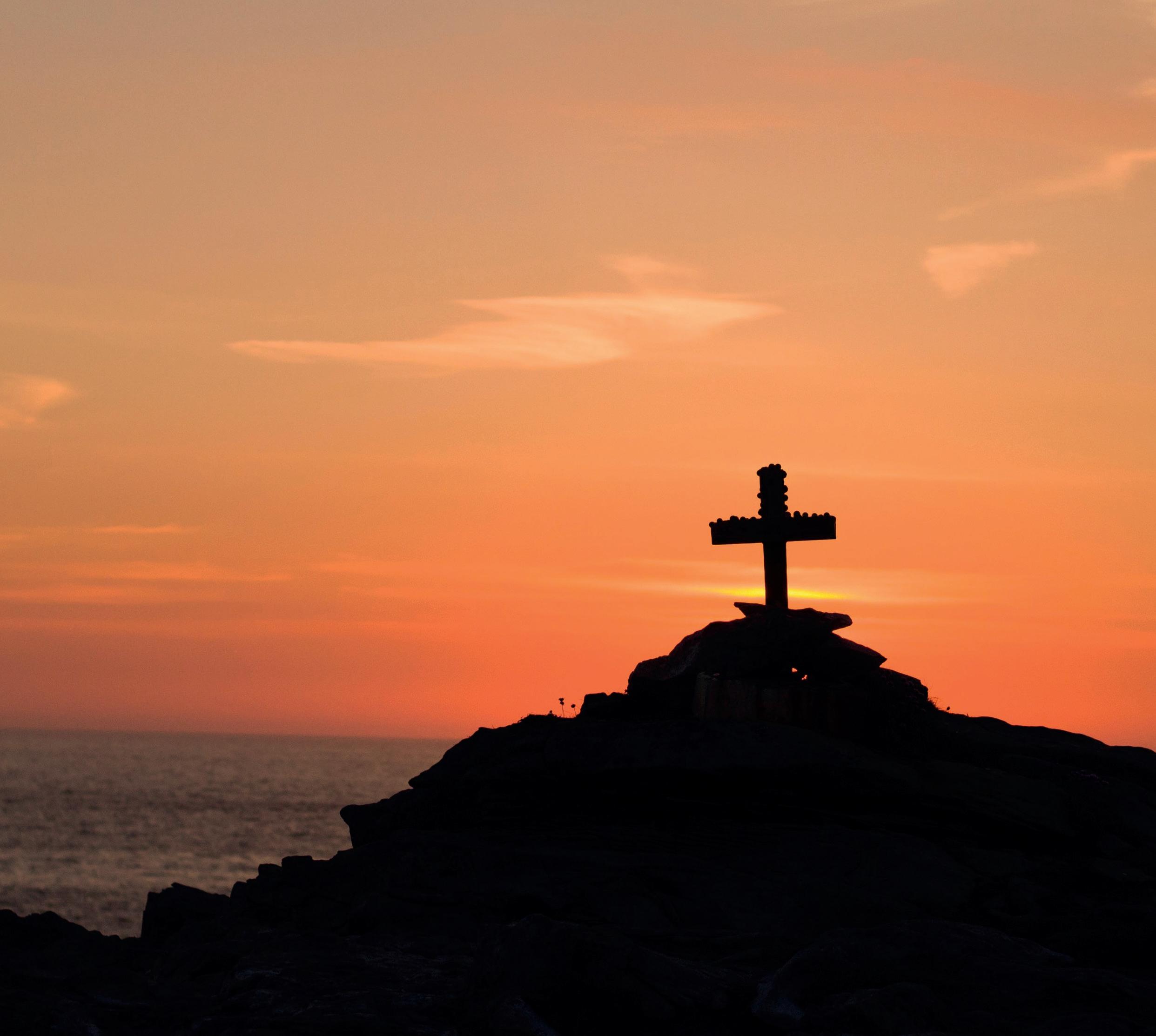
and togetherness. So, I like that statement a lot and I was touched by that statement.
Atif Zahir, a local guest, said:
“It’s my pleasure to be here. I think this was a great event to bring everyone together. People of all faiths, people of all different ideas and thoughts. I think a masjid in this community would do this community a lot of good in general, just to promote cohesiveness in society. So, I came here with some of my friends and I’m happy I did come because this really gave me a little bit more insight into how the community is. And I got an opportunity to talk to the Khalifa himself, which was very nice, very productive, and in a very light-hearted environment. I was very fortunate to be part of that meeting.
Faran Rabbani USA CorrespondentLast Friday (7 October, 2022) saw Hazrat Khalifatul Masih Vaa delivering his Friday sermon from the new Bait-ul-Ikram mosque in Dallas, Texas. The American members hailed from 59 different jamaats to be part of this historic Jumuah – it was the first time that a Khalifa of the Promised Messiahas was to deliver the Friday sermon from this part of Texas.
The queue to get a spot inside the mosque began several hours prior to Friday prayers. The attendance was exceptionally high due to the blessings of Khilafat. Around 2400 worshippers, including members on various duties, were able to perform Jumuah behind Huzooraa. These members travelled from different jamaats in North America. Some other countries that were represented were Pakistan, the UK, Germany, Bangladesh, Bolivia, India, Mexico and Palestine.
In the evening, Huzooraa travelled to the city of Fort Worth, which is in the western part of the Dallas Metro area, to inaugurate another mosque. The mosque belongs to the Fort Worth Jamaat and has been named Bait-ul-Qayyum by Huzooraa. The building, prior to being turned into a mosque, served the YMCA.
The members of the local Jamaat had congregated to welcome their beloved Imam. As soon as Huzooraa arrived, the nasirat and the atfal welcomed him with a beautiful choral poem. Huzooraa went around the mosque complex to meet everyone. Afterwards, Huzooraa unveiled the plaque and led all present in silent prayer.
Hazrat Amirul Momineenaa inspected the prayer halls, offices, a library, an onpremise gym and the tabligh room. He proceeded to the adjacent hall where the local members had gathered along with the local office-holders. The local sadr presented welcome remarks to Huzooraa and then Huzooraa asked local amila members about their respective departments and the progress that they had been making. Graciously, Huzooraa then gave the local members the opportunity to ask any questions or share their sentiments. The local members expressed their happiness and immense love for their beloved Khalifa. This programme lasted about 15 minutes. Afterwards, the local Jamaat amila and the local auxiliaries’ office-holders were able to have group photos taken with their Imam.
Inaugural reception of Bait-ulIkram – Saturday 8 October 2022
The official reception of Bait-ul-Ikram mosque was going to be held. By 4 pm, the guests started to arrive and the main marquee, where the reception was to be held soon, was filled.
Hazrat Khalifatul Masihaa arrived at the reception and the programme began with a recitation from the Holy Quran presented with its English translation, followed by an introduction of the Jamaat and its beliefs by Secretary External Affairs, Amjad Mahmood Khan Sahib. Some of the dignitaries who had joined Huzooraa at the head table then presented their remarks. Honourable Carl Clemencich, a member of the City Council of Allen, Texas, also presented the key of the city to Hazrat Khalifatul Masih Vaa
The United States Congressman, Mike McCaul also presented his remarks along with a resolution on behalf of the US Congress to Hazrat Khalifatul Masih Vaa
After the comments of the dignitaries, Huzooraa presented his keynote address.
Some of the guests that were present, shared the following remarks about Hazrat Khalifatul Masih Vaa and his speech.
Congressman Mike McCaul, a member of the US Congress from Texas, said:
“It was wonderful. You know, I had a resolution on behalf of the United States Congress honouring the Ahmadiyya Muslims and His Holiness. I’ve met with him on several occasions. He is the one countering radical ideas and extremism, whether it be in Pakistan or elsewhere. And he stands for the values of the House of Abraham. You know, [we can all live amicably] whether we are Jewish, or Christian — whether were are Muslim or Buddhist. And we all stand for peace, love, tolerance and forgiveness. He’s truly a holy man. Every time I talk to him, he impresses me. He has so much wisdom. And if we had more people like him in the world, it would be a more peaceful place.”
Vudhi Slabisak, a surgeon, said:
“I think the message of unity, the message of peace, the message of coming together is prescient, particularly in these troubling times that we live in. These are uncertain times. I believe the polarity of what’s happening not only in the United States but in the world is a shameful thing that’s occurring and I think we need strong leadership, religious leadership and political leadership to change that narrative to one of
peace and harmony.
“I was surprised by the inclusiveness of his message, the tolerance for others. I appreciated his recognition of people that weren’t part of the mosque. The very fact that they showed up was a sign of our tolerance for other beliefs. So, I appreciate his ability to connect to people outside of his faith. So, I thought that was very kind and generous of him to do so. I think his message was relevant. We need to hear more of that message across the media, across the world stage.”
Cindy Walker, a close neighbour to the mosque, said:
“The event was not what I was anticipating and I found it to be a truly moving experience. I thought what was incredible is that His Holiness spoke about things that I don’t think I’ve ever spoken out loud or thought about in terms of what it might mean to a neighbourhood where a new mosque is being built. I have not ever thought about those things, but I recognise that I live in a community where those things are likely thought about by a lot of people. And I thought it was incredible that he wanted to ensure that he dispelled those misbeliefs and taught what the Ahmadi community believes. I feel like I have a much greater understanding of it and I thought it was incredible. I really did.
“I have seen nothing but love and respect and kindness from the community here in the years that I’ve lived here.”
Jayshree Mavankal, a local guest, said:
“It’s a beautiful event. That’s my first impression of it. It is well organised and everybody is working together so well. So, it’s very impressive the way you all managed this whole thing.
“I loved His Holiness’ speech. I liked his message of peace and how he’s concerned about the wars that are going on and how he wants everybody to work with each other, no matter what religion they may be. I like that fact because there are different people with different beliefs in this world. And for him to say that it is OK for everybody to work together and work for world peace, despite having whatever beliefs they have. So, I enjoyed it.”
Ashwini Bansod, a local guest, expressed:
“I really liked that every volunteer was very welcoming and the arrangements were up to the mark. So, I enjoyed the event. And I took one sentence. He said that religion and humanity are for everyone, and everybody should follow the path of peace
“I think what he said is very pertinent to what’s happening right now because, you know, according to some analysis, we are at the brink of war. And it’s very unfortunate that we are still having to talk about nuclear weapons. And I think his message was not only resonant with the community of Texas, the local community here itself, but also globally with what’s happening in, you know, in the Near East and the West against the Russians and the Ukrainians and all that. So, I think it was very pertinent and I’m glad he said what he said because it resonates with the rest of the world really nicely.”
Beverly McCord, Richardson, Texas, expressed:
“I am always thrilled to hear a religious leader of worldwide status continually reminding people of the need for peace, to resolve differences, to love one another, and to find a way to work out our differences. So I’m always happy when someone gives that message. I myself am so far from fearing this community, I can’t imagine anyone being fearful because they are so loving, so giving, so outgoing and constantly volunteering for community services. If anybody has any fears, they’re quickly dispelled by just seeing the loving work that they do for the community.”
Katie Fiedler, Dallas, Texas, expressed:
“I really appreciate his emphasis on religious freedom. I work for Texas Health Allen, the hospital that is just down the street. We serve people of all communities and all faiths and health equity is incredibly important to us. And so, having someone in this community who supports all people and is a beacon of hope for everyone is incredibly important to the hospital.”
Damon Nahoolewa, McKinney, Texas, said:
“It was a great event. We all have one goal, to love one another and that was the message of His Holiness. If we would all come together and listen to His Holiness’ message, this world would be a better place.”
Marybeth Hardesty-Crouch, Allen, Texas, said:
“I am, of course, with His Holiness on what needs to happen for the pathway to peace. This message is something that we all can get behind. I am truly grateful to be invited to this event and am amazed at the similarity between the philosophies that His Holiness shared and what my religion also teaches.”
Amrita Raj, Plano, Texas, expressed:
“I am honestly blown away by the community and the people. First of all, the event was so beautifully organised and the views of His Holiness, whether political or
religious, are pretty amazing. I am so happy to see that we all share the common agenda of doing good for the community. To hear this message here today was absolutely amazing. I understood the fear in the community that His Holiness spoke of. I believe we all need to come together to get rid of that fear in the community. I follow my Hindu religion, but I love my Muslim friends in the community and love being here tonight.”
Anthony Elia, a librarian from Dallas, Texas, said:
“His Holiness’ speech was wonderfully inspirational and community-minded in terms of bringing the global community together and embracing the key concepts of love, fellowship and peace in the world. The key takeaway for me was the reassurance that we all are here to do good by one another and take care of each other.”
Iro Omere said:
“This was a beautiful event and I had an amazing time. Being able to meet and listen to His Holiness was really inspiring. I also got the chance to look at things that His Holiness mentioned in his speech as the roadmap for world peace. And I believe these are the exact same things we ought to do in our country and throughout the world to make sure that we are able to live harmoniously, serving God in our own ways while building a strong world together.”
Jeff Williams, a local guest, said:
“I truly enjoyed his message of peace and humanity. I also understand he has a sense of community, which is the main reason the mosque is being built here. And although I do find it unfortunate, he has to mention that the mosque here poses no threat to us as a community. I am glad that he did it here. And I’m honoured to be a part of it and it’s certainly a beautiful place. Anyone who feels welcome can come here to worship and so that would be my biggest takeaway tonight. Well, probably the main thing was just the ability to turn out as many people as you had here from many different countries, different states and towns across the US. So, that alone was impressive to me, just the miles that people were willing to travel to hear His Holiness but also to bear witness to what we’re building here.”
Tommy Berry, a local guest, said:
“I just want to thank you and the community and Khalifatul Masih for the hospitality, the message, the sense of joy and the sense of community that tonight was all about. It was a blessing.
“It was one of those things where when you see what human beings are about, you see what joy people can bring. And when they respect life and love life and respect human beings and love human beings, regardless of their background, regardless of their faith or religion and work for the greater good. And it shows that no one individual or organisation has a monopoly. We should all work together.
“And I think the message for tonight that the Khalifa shared in that regard and reminding that that’s really a message we need to remember every night when we go to bed. A message we need to remember every morning when we wake up – what our mission is for each day. This is a message that we need to share with our kids and make sure they understand that message. So that way, when we’re not here, they can continue that message.”
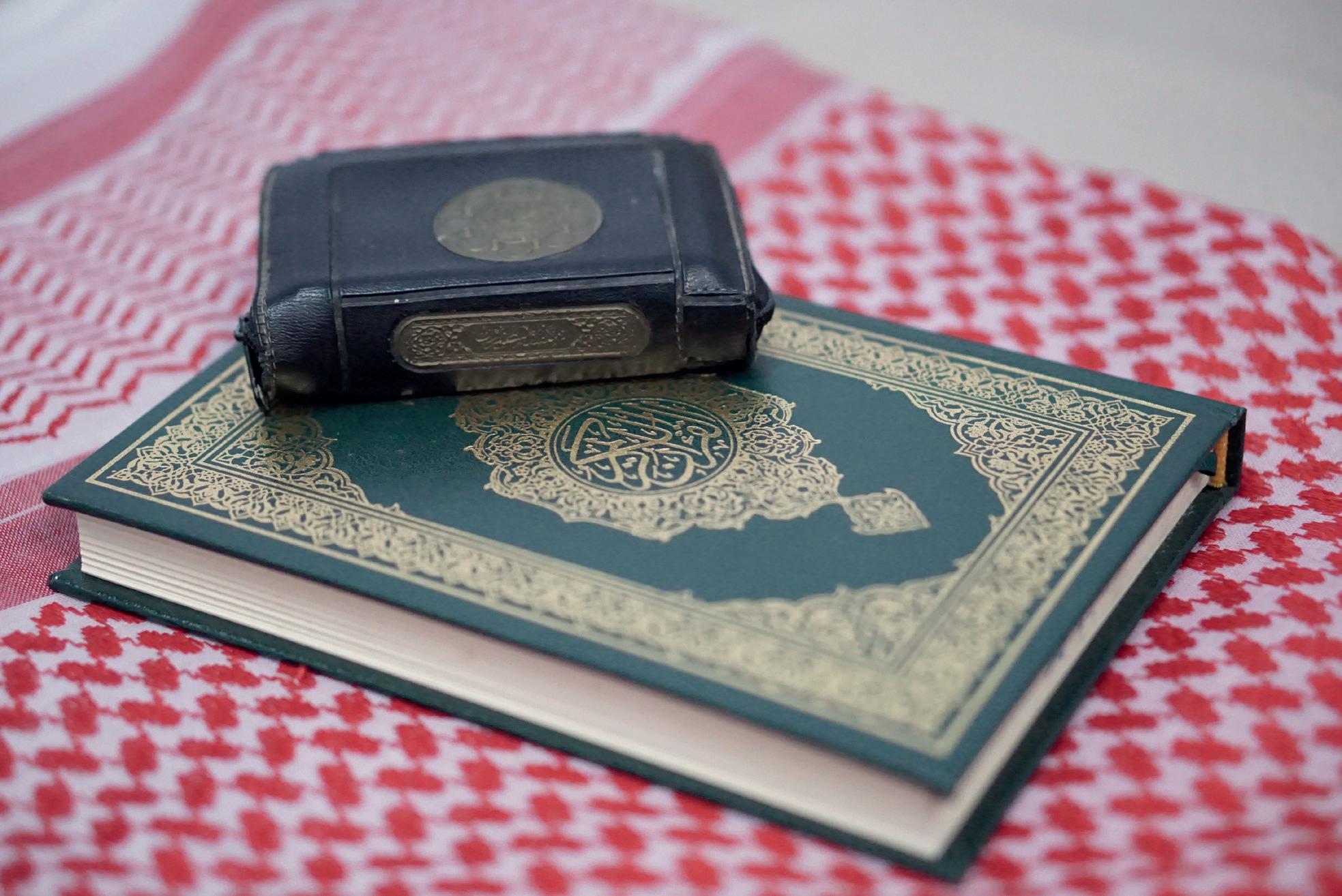
In the Holy Quran, Allah says:
“And He it is Who has subjected [to you] the sea that you may eat therefrom fresh flesh, and may take forth therefrom ornaments which you wear. And thou seest the ships ploughing through it, [that you may thereby journey] and that you may seek of His bounty and that you may be grateful.”
(Surah an-Nahl, Ch.16: V.15)
This verse is incredibly interesting as Allah speaks about the ingestion of fresh meat from the sea as a blessing he has endowed mankind. “Fresh” signifies praise too and if we look at groups of people in history who lived close to the sea, we begin to understand the benefits of consuming seafood provides to our health.
Over 40 years ago, scientists discovered that Greenland natives, the Inuit, had high levels of Omega-3 in their blood. They lived close to the ocean, so their diet majorly stemmed from fresh seafood. When screened for disease, it was discovered the Inuit had almost no heart disease. “The Inuit diet” stems from them which some people adopt today.
To be clear, Omega-3 is a fatty acid, and to be more specific, a polyunsaturated fatty acid (PUFA). In humans, there are three types of Omega-3 fatty acids: alpha-

linolenic acid (ALA), eicosapentaenoic acid (EPA) and docosahexaenoic acid (DHA). Fatty acids are the building blocks of fats in our bodies. Despite the negative connotations the term “fats” have associated with them and contrary to popular belief, fats are essential to a healthy diet. They are an integral part of our cell membranes and provide organ support, give us energy and keep us warm.
Normally, the human body can produce the fats it needs itself. However, in the case of Omega-3 fatty acids, humans must obtain them purely from their diet. We cannot produce them from raw materials.
So where do Omega-3 fatty acids come from and how do we get them from our diet?
ALA is found in significant amounts in flaxseeds, soybean oil, rapeseed oil and walnuts. Dietary sources of EPA & DHA include cold-water fatty fish such as salmon, tuna, mackerel, sardines, shellfish and herring.
In any case, this article will mainly focus on the enormous benefits EPA & DHA offer, as they almost exclusively are sourced from aquatic animals. There is deep wisdom in the Quranic reference to the provision Allah gave us in seafood.
In our rapidly developing world, people are living longer, hence we are witnessing a higher incidence of neurodegenerative diseases. According to the World Health Organisation (WHO), currently, more than 55 million people live with dementia
worldwide and there are nearly 10 million new cases every year. The most common form of dementia is Alzheimer’s disease, which contributes to up to 60-70% of cases.
One research paper showed that people over 65 with high levels of Omega-3 DHA in their red blood cells decreased their risk of developing Alzheimer’s disease and dementia by 50%! Furthermore, compared to people with low DHA levels, these people had an estimated extra 4.7 years of life free of Alzheimer’s disease.
DHA presence in the brain holds a critical role in maintaining the blood-brain barrier (a barrier held between blood vessels and the brain tissue). This barrier is vital to provide a clear pathway for the absorption of nutrients from our blood to our brains. A high presence of DHA prevents the
The idea that Omega-3 might be good for the heart initially began when scientists researched the excellent heart health of the Inuit. Their diet provided high levels of EPA & DHA in the blood.
A 2021 meta-analysis of 17 scientific studies showed that those people with the highest blood levels of combined EPA & DHA were up to 17% less likely to die from all causes of premature death and were also up to 21% less likely to die from cardiovascular disease. (Blood n-3 fatty acid levels and total and cause-specific mortality from 17 prospective studies - William S. Harris et al, www.nature.com/articles/ s41467-021-22370-2)
Having high levels of triglycerides can dramatically increase a person’s risk of heart disease. In one randomised controlled trial, high doses of an EPA-based drug decreased levels of triglycerides by up to 18% and reduced a person’s risk of a major
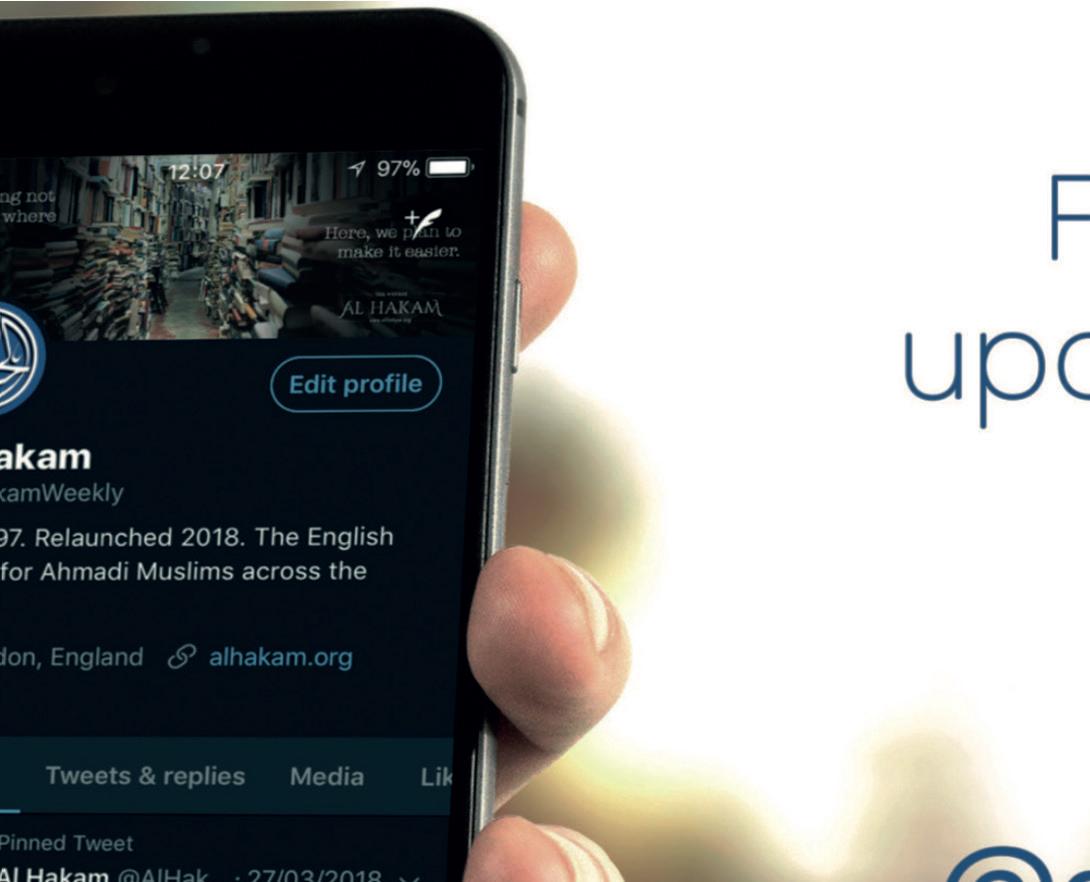
Cognitive function refers to a person’s mental abilities including a myriad of skills such as memory and learning, language, social cognition and a person’s visual and motor function.
Some studies have shown that adults who supplemented with combined EPA & DHA excelled in tests of executive function with improved white matter structural integrity and increased grey matter volume in their brains. White matter is the part of the brain containing nerve cell fibres and grey matter is the part of the brain containing nerve cell bodies. Therefore, an increase in their microstructural integrity and volume is indeed optimal for higher cognitive function. Additionally, Brain Derived Neurotropic Factor (a protein growth factor which increases long-term memory and learning) also increased with EPA & DHA supplementation. (Long-chain Omega-3 fatty acids improve brain function and structure in older adults - A Veronica Witte et al, https://pubmed.ncbi.nlm.nih. gov/23796946/)
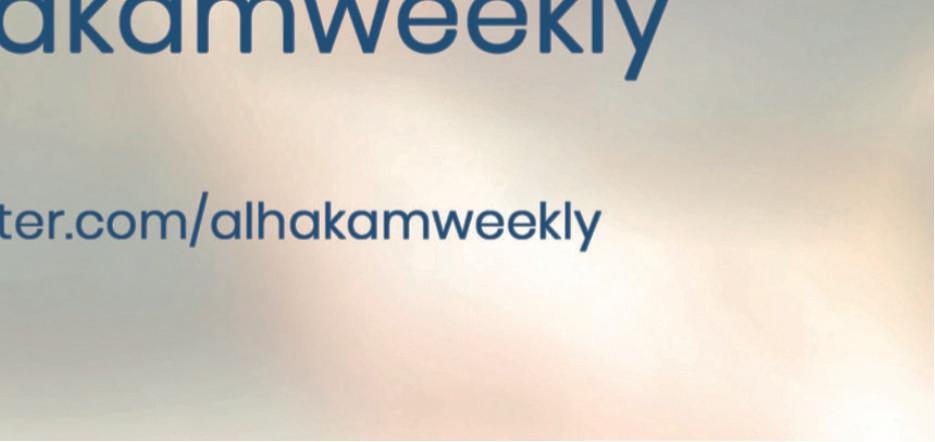
Another randomised controlled trial showed that pregnant mothers who took fish oil supplementation during their third trimester improved the health of their child during the first five years of their life. The child had a lower risk of lower respiratory tract infections, persistent wheezing and asthma in the first 5 years of their life. (Fish Oil-Derived Fatty Acids in Pregnancy and Wheeze and Asthma in Offspring - Hans Bisgaard et al, https://pubmed.ncbi.nlm.nih. gov/28029926/)
Ogundipe et al, https://pubmed.ncbi.nlm.nih. gov/30392581/)
Dr Rhonda Patrick who has published multiple research papers on Omega-3 in high-quality scientific journals speaks highly of fish oil supplementation during pregnancy. Dr Patrick mentions in one place, “It is my personal opinion. based on the evidence I have reviewed over the years, that supplementing with fish oil is one of the best things a mother can do while pregnant and breastfeeding.”

Further, Omega-3 can also be combined with other vitamins and behavioural changes to enhance a person’s health.

One randomised clinical trial showed that Omega-3 and vitamin D supplementation when combined with regular exercise significantly reduced an adult’s cancer risk by 61%. Each of these 3 actions individually does decrease cancer risk to a degree. However, when combined (as this study showed) they can dramatically decrease an adult’s cancer risk.
Combined Vitamin D, Omega-3 Fatty Acids, and a Simple Home Exercise Program May Reduce Cancer Risk Among Active Adults Aged 70 and Older: A Randomized Clinical Trial - Heike A. Bischoff-Ferrari et al
The Holy Prophet Muhammadsa when talking about physical health said:
“A strong believer is better and is more lovable to Allah than a weak believer” (Sahih Muslim)
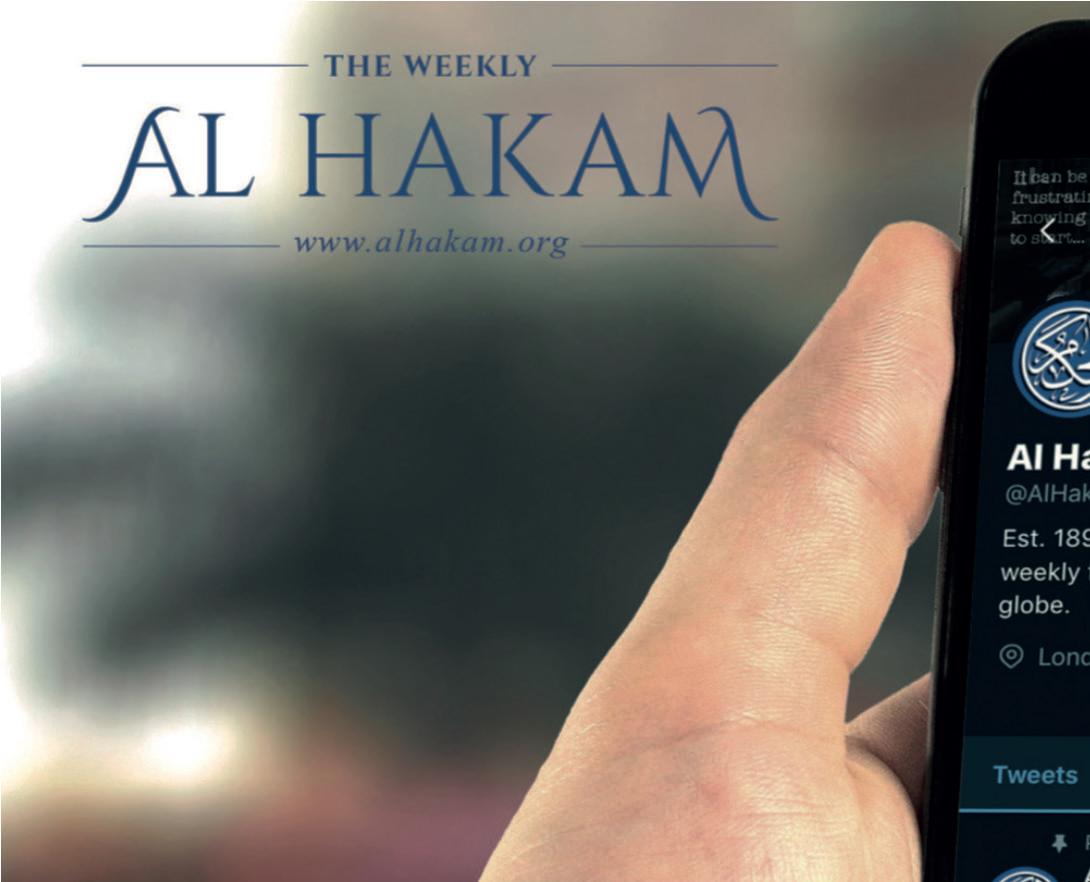
breakdown of the blood-brain barrier. Roughly 50% of all dementias commence with the breakdown of the blood-brain barrier, thus this is essential in the prevention of these neurodegenerative diseases. (Red Blood Cell DHA Is Inversely Associated with Risk of Incident Alzheimer’s Disease and AllCause Dementia: Framingham Offspring Study – by Aleix Sala-Vila et al, www.mdpi. com/2072-6643/14/12/2408)
cardiovascular event by 25%. (Results from EVAPORATE Trial Suggest that Cardioprotective Benefits of Eicosapentaenoic Acid (EPA) are Related to Plaque Reduction and Stabilization - Thomas M Das, MD et al, www.acc.org/latest-in-cardiology/ articles/2020/09/21/19/13/results-fromevaporate-trial)
Another similar study was conducted in which pregnant women were given fish oil and placebos during their third trimester. The pregnant women who took fish oil had sons with larger total brain volumes, increased total grey matter, and larger corpus callosum (a structure in the brain connecting the two hemispheres) when compared to the placebo group. (Randomized controlled trial of brain-specific fatty acid supplementation in pregnant women increases brain volumes on MRI scans of their newborn infants - E
This not only refers to the strong believer’s physical strength but also indicates a person’s overall physical health. Therefore, as Muslims, we must take care of our own physical and mental health so that we can best carry out the rights we owe to God and His creation. It is by reflecting on the Quran and pondering over Allah’s creation that we can find ways to better our health as well. In this case, the benefits of Omega-3 – abundantly found in seafood –can dramatically help in our overall health (provided your physician approves of it for your own health situation).
The Holy Quran refers to “fresh” seafood as a provision for mankind and when we delve deeper, we can see the benefits.

permanently rely on the state, however, he said this after having thrice given money to the one asking.
In Mashal-e-Rah this has further been expounded with regard to the nizam (administrate organisation) of the Jamaat. Hazrat Musleh-e-Maudra did not want a single person to remain who did not have any means of income. Even in the case of widows, he advised they begin their own small craft or manufacturing businesses with the assistance of Khuddam-ulAhmadiyya (who could sell these products for them), thus earning a permanent living. Huzoorra explained that only the handicapped and disabled should be those whom the community supports directly. Huzoorra stated:
“If work is found, then no excuse should be made in not undertaking it. […] It should be their [Khuddam-ul-Ahmadiyya’s] responsibility to find work for unemployed men. At first, this task seems to be difficult, but if they use their intelligence and develop a habit of pondering, then they can come up with such schemes that can provide work for the jobless.” (Beacon for the Youth, 2022, p. 147)
Nauman Hadi Mohtamim Ishaat, MKA UKMajlis Khuddam-ul-Ahmadiyya UK has had the good fortune of publishing the English translation of Mashal-e-Rah, officially entitled Beacon for the Youth by Hazrat Khalifatul Masih Vaa. For those that don’t know, Mashal-e-Rah is a collection of addresses and writings on Majlis Khuddamul-Ahmadiyya delivered by the Khulafa of Ahmadiyyat from the inception of the Majlis in 1938 to our time. The words of each Khalifatul Masih have been collected into a volume, the first volume comprises the blessed words of Hazrat Khalifatul Masih IIra and this is the volume that has been translated and published.
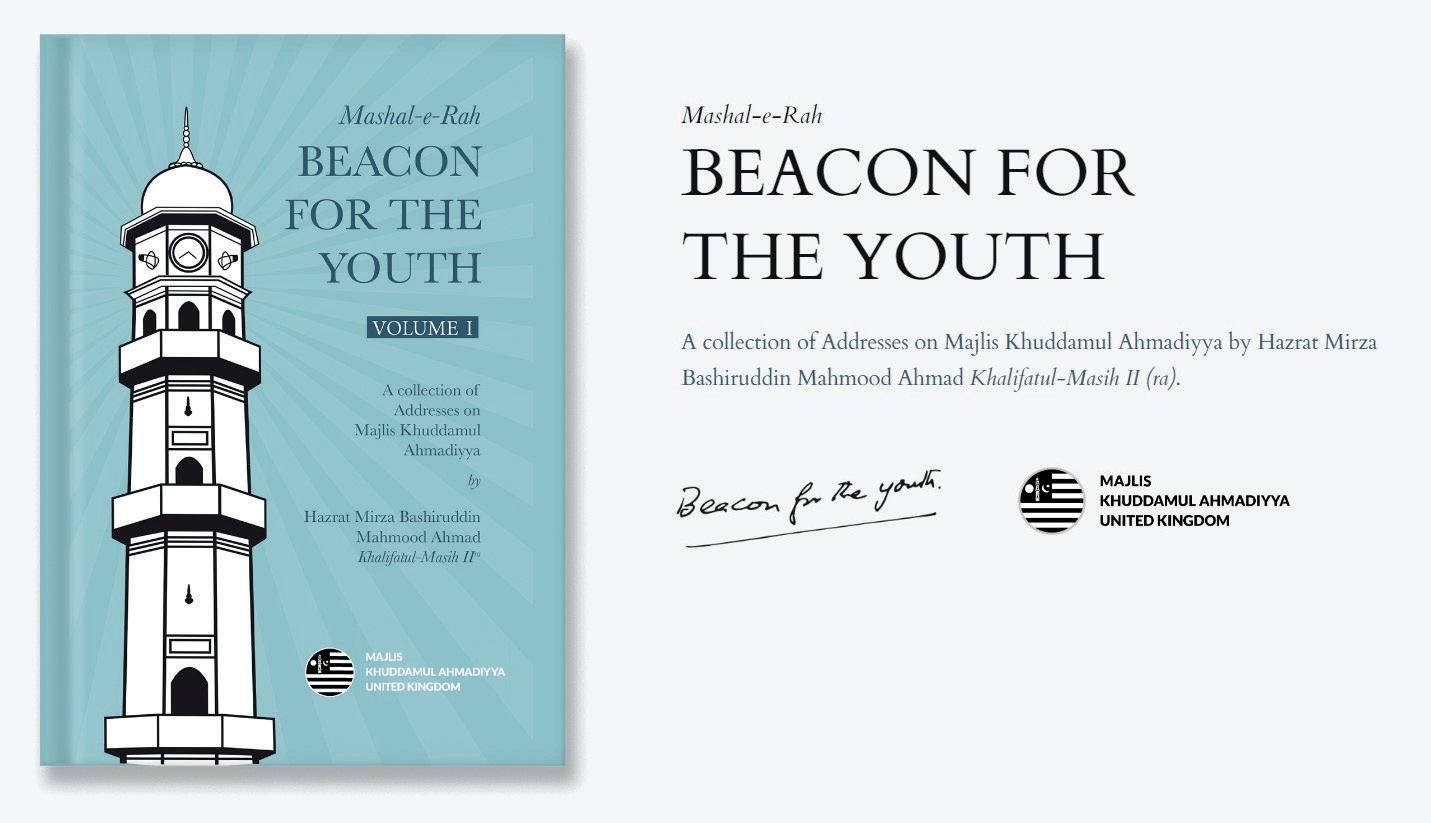
Mashal-e-Rah is special and unique. It is a treatise on nation-building and is bound to motivate the reader. Since Majlis Khuddam-ul-Ahmadiyya revolves around the development of the youth, it is especially beneficial for Khuddam and Atfal. The words of Hazrat Khalifatul Masih IIra have a magnificent effect – every syllable greatly stimulates one toward action and pushes one towards a solid determination to act on the commands of the Khalifa of the time.
Beacon for the Youth Volume I covers the initial years of Khuddam-ul-Ahmadiyya from 1938 to 1942. These were the years in which great nations across the world were being aroused by extremist ideologies that
promised a better future for the human race. It is against this backdrop that the then Khalifa of the Ahmadiyya Muslim Community established an organisation designed to ensure that the Jamaat continues to act on the teachings of Islam. Through his enduring efforts and exemplary leadership, the Khalifa of the Ahmadiyya Muslim Community created a lasting legacy of peace that would see the youth take charge of the banner of true Islam from their elders and, in time, pass it on to their future generations. More than 80 years later, how great was the vision of the Khalifa!
With whatever intention you pick up Mashal-e-Rah, you are bound to find something to your taste – it will answer your questions. For example, the current cost of living crisis has not only gripped our world but has also laid bare the stark division between caring for the poor and the wealthy. Trickle-down economics is a vicious type of capitalism, it forces the poor to rely on the goodwill of the wealthy to boost the economy. In Mashal-e-Rah Hazrat Khalifatul Masih IIra discusses how the financial condition of a country can improve. It is interesting to note that Huzoorra not only bases his arguments on Quranic principles and the sayings of the Holy Prophet Muhammadsa, but also on sound economic practice.
For example, we all know about the hadith in which a man came to the Holy
Prophet Muhammadsa and asked him for charity. The Holy Prophetsa gave him some money. However, the man continued to ask for more, with the Holy Prophetsa gracing him with something each time. When the man asked for the third or fourth time, the Holy Prophetsa said:
“Should I not tell you what is better than this asking? It is that you earn through your labour and then eat the fruits of your labour.”
In many ways, this short incident encapsulates the entire economic outlook that is presented by Islam: On the one hand, you have the Holy Prophetsa giving a needy person some money, or in other words, you have a welfare state. On the other hand, when it is felt that perhaps the one asking for help can live a more dignified life, the advice is given to earn a living through one’s hard work. This is the reverse side of the welfare state, where each individual contributes to the economy and supports himself as well through his effort.
The problem with Thatcherite politics is that, whereas it does promote the second instance of working hard and building a better future for yourself, it does little to support those that are unable to carry out this work. In other words, it does not strike the right balance. Of course, in the hadith above, the Holy Prophet Muhammadsa also agreed that it is better to live a life of self-sufficiency where one does not have to
But, of course, such a course of action can only be taken by competent governance.
The focal point of Islamic economic policy is still to ensure everyone has a job based on his or her ability. The point of contention for the unfortunate man who struck Hazrat Umarra (which later led to his martyrdom) was the price of his manumission, which Hazrat Umarra set based on the skills he possessed. The man who thrice asked the Holy Prophetsa for money and was advised to earn a living did indeed follow this advice: He proceeded to a forest, cut some wood and sold it at a market. He became increasingly wealthy from this point on.
In Mashal-e-Rah Hazrat Khalifatul Masih IIra has also consistently warned of the dangers of remaining idle. “Even the son of a king, if he remains idle, brings shame to his nation” declares Huzoorra. (Beacon for the Youth, 2022, p. 26) Many pages are dedicated to advising the youth to remove the thought that they are of rich heritage, and thus, cannot engage in a particular type of activity. One of the reasons for establishing the Waqar-e-Amal department, which is a hallmark of Khuddam-ul-Ahmadiyya, in Huzoor’s own words was “The nation which becomes habituated in this, witnesses an improvement in its economic condition. Through this, the people of the nation will not become lazy. […] The greatest benefit is that religion is strengthened and slavery comes to an end.”
was therefore zealously attacked on all sides by the followers of all the religions of the world. The Christians, of course, took the lead and so many objections were hurled against Islam that the Muslims, finding none to refute them, began to doubt the very truth of their religion. Thousands actually recanted and entered the fold of Christianity. This called for the Messiah, the breaker of the cross, as the Prophet[sa] called him, who could refute these objections and show heavenly signs to establish the truth of Islam over other faiths.
In India too the movement made slow but steady headway in the face of bitter opposition from the [other] Muslims till, as already stated, on the death of its holy founder the movement claimed a following of no less than half a million men, who entered the fold of Ahmad[as], not only from the different sects of the Muslims, but also from the Christians, the Hindus, the Parses and from various other communities. With this introductory note, I pass on to the subject at hand.
Hazrat Mirza Bashir Ahmadra MA (18931963)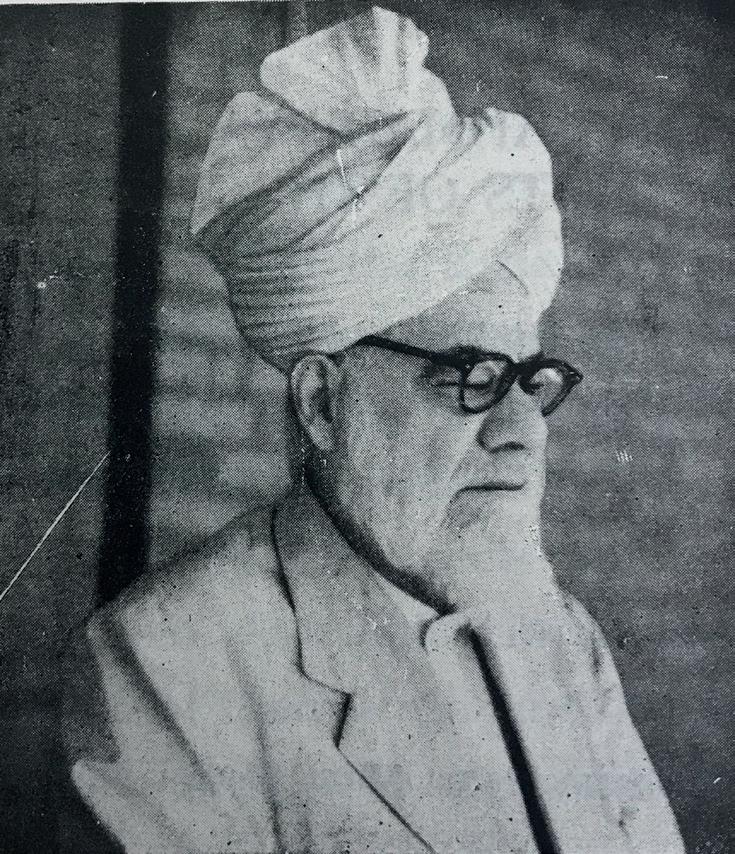
I intend to discuss in the following pages the chief points of difference between the Ahmadiyya Movement and the [other Muslims] of the present age. But before beginning the subject proper, it seems necessary to mention briefly the claims of Ahmad[as], the holy founder of the movement, in order to clear the attitude of the Ahmadiyya Movement towards the [other Muslims] and vice versa.
It must never be forgotten that Ahmad, peace and the blessings of God be on him, did not found any new religion, but as he himself has repeatedly and clearly asserted, the main object of his advent was to restore the Muslims to their pristine purity and bring them back to the good old ways of the Companions[ra] of the Prophet[sa]. But the lives of the Muslims could never be purified unless Islam was restored to the same shape and form as it had when the Holy Prophet[sa] taught it to the world. On account of passing through ages of ignorance and irreligion, not only had the Muslims fallen away from the teachings of the Holy Founder of Islam, but Islam itself had been disfigured to no small extent. False doctrines had crept in and made its glorious figure look ugly and loathsome. Under such circumstances, it was simply impossible to purify the lives of the Muslims without giving Islam its old lustre by polishing away the rust that had settled on its bright surface. This was the work of the Mahdi, the rightly guided.
But this was not all. There was one more obstacle. Finding the Muslims in such a bad plight and Islam in so helpless a condition, the different religions had thought it a golden opportunity to crush Islam which
Now, Mirza Ghulam Ahmad[as] of Qadian claimed to be the Promised Mahdi and Messiah, for as already stated, he came with a two-fold purpose. He was to settle the internal differences among Islamic sects on the one hand and remove the external danger on the other by proving it to be the only true religion for the whole of mankind through cogent reasons and powerful heavenly signs. The new teacher threw himself, heart and soul, into his work and before his death, which took place in May 1908, he had gathered around him a large following of men who were sincerely and devotedly attached to him.
It must not, however, be supposed that Ahmad[as] was given warm support by the [other] Muslims. On the contrary, when he announced himself as the Promised One from God, he raised such a storm of bitter opposition against himself that from one end of the country to the other he was unanimously declared to be an infidel deserving to be put to death with all possible torments. These were not empty threats from the Mullahs. There were men in the country who thought that the greatest service they could render to the cause of Islam was to kill Ahmad[as]. Attempts were actually made to take away the life of the Reformer. He was dragged to court as a would-be murderer, a disturber of the peace, and whatnot. His followers were also tormented in diverse ways, but thanks to the British Government, whose powerful hand maintained peace in the country, no actual violence took place in British India.
But in Afghanistan, it was otherwise. The followers of the new teacher were hunted out like hares and put through barbarous tortures. The two most prominent among them were cruelly murdered – one stoned to death and the other strangled in his bed. By such measures, it was designed to nip the ‘evil’ in the bud, but the steel wedges of Ahmad[as] steadily pushed forward and now, thanks to the Almighty, his followers count by thousands in the land of the two martyrs.
The first, and to me, one of the most important points of difference between the teachings of Ahmad, blessings be on him, and the [other] School of Islam of the present age is about Divine revelation. Ahmad[as] believed and taught that all the attributes of God are eternal and have been manifesting themselves from times immemorial to the present age and will continue to do so in future. It is highly absurd, so he argues, to think that whereas all the Divine faculties are intact, God’s power of speech has suffered of late and the All-powerful God cannot now speak as He used to do in times gone by. The attributes of God are co-eternal with Him, as are all the other Divine attributes which are ever manifesting themselves in His creation and not a moment passes without experiencing them. So must be the case with His faculty of speech. But the opponents of Ahmad[as] hold that the door of revelation is closed forever and no one after the great Prophet[sa] of Arabia can hear the Word of God. They add, however, that this is not due to the loss of the power of speech in God, but rather due to the fact that as the Divine law has found its perfection in the Holy Quran so there is no need for any future revelation. To this the answer of Ahmad[as] is as follows:
No doubt, says Ahmad[as], the Quran is the last dispensation, and there is no law after it till the last day, yet it is wrong to suppose that the door of revelation is closed after the Prophet[sa]. The completion of the law does in no way imply the end of Divine revelation. For the Israelites who lived before the Great Teacher of Arabia, the Mosaic dispensation was quite complete and yet history tells us of hundreds of prophets who appeared after Moses[as] and received clear revelations from the Almighty.
As a matter of fact, the primary object of revelation is none other than to establish man on the firm rook of certainty as to the existence of God, for unless man attains to the stage of certainty, he is not safe from sin. Nothing can be proof against sin except a perfect knowledge of God, attained
through brilliant signs of His existence. It is not to believe simply that there is a God, but to know God and see God. And surely, this stage can never be reached unless the inspired ones of God appear in the world from time to time. If Almighty God has willed to give perfect knowledge of His own self to the seekers after truth, He cannot be expected to have shut the door through which they may be illumined by His word and revelation. In the Quran, the followers of the Prophet[sa] are called “the best of peoples.” Now if the door of revelation is closed for the followers of the Prophet[sa], they can, in no way, be styled as the best of peoples. For as the Quran itself tells us there were hundreds of men among the followers of Moses[as] who were inspired by God and consequently if this door were to be shut upon the Muslims, the Jews are beyond doubt the better of the two. In another verse, speaking of the faithful, the Quran says:
Good tidings are granted to the lovers of God through His word and inspiration in this life as well as in the next. (Ch.10: V.65)
Ahmad[as] laid the greatest stress, as the reader may have observed from the above, on the point that unless God speaks to His chosen servants, and shows His own self to them by letting them hear His sweet accents, it is impossible for man to get a perfect knowledge of Him and His attributes, which is absolutely necessary for entire freedom from sin.
Ahmad[as] went so far as to assert that the religion which does not vouchsafe to its adherents this stage of communion with God and teaches that the door of revelation is now shut, cannot be the true religion, for it denies the existence of the thing on which rests the spiritual edification of man. Often did Ahmad[as] liken Divine revelation to rain which is yearly needed to grow crops. The rain that fell last year cannot be expected to water the crops of this year, and unless this year is blessed with new rains, the crops will fail, and there will be famine in the country. So is with Divine revelation. The idea that God spoke in times past can never quench the spiritual thirst of a seeker after truth. The soul of man naturally soars towards its Maker. If the door to God’s glorious presence is shut, imagine the misery of the poor little thing.
The same difference holds good between the Ahmadiyya Movement and other religions of the world, with Christianity not excepted. To Ahmad[as] revelation was one of those things which alone could prove the superiority of Islam over other faiths. If man strives after God all his life, but never hears
His sweet voice calling on him, “In thee I am well pleased for thou treadest on the right path,” he is sure to get bewildered in the end and is very likely to think that all the deeds he has done in the way of righteousness and truth may have been nothing but as so many acts of disobedience to God. For where was His confirming word? Such a man will enter his long resting place with a heart full of doubts and misgivings as to his following the right path in his earthly life. But think of the man whose way to God is lit up with bright signs from Him and who at all the parting of roads hears the clear, unmistakable words of his Lord saying to him, “Thou wilt go this way and not that!” The face of God is hidden in a thousand veils from mortal sight and nothing but His own powerful voice can set at rest the doubting heart of man. Many people say that they believe in God, but there is a wide difference between a mere belief in God as a matter of faith and a perfect knowledge of God obtained through His own soothing voice that dispels all doubts and establishes man on the firm rock of certainty. “The one actually sees what the other does not reject on grounds of probability.” Hence the claim of Ahmad[as], that save Islam, all the religions of the world are dead.
Someone may object here that even if it be admitted that God speaks to His chosen ones then, too, the vast majority of mankind must need fall short of that high stage of certainty about God which is alleged to be so necessary for the purification of the soul of man. But this view is equally erroneous for though it is right that God’s clear voice reaches the ears of the chosen few only, the masses are also thereby saved for one that attains to the stage of communion with God begins to reflect the attributes of God just as a mirror reflects the form of the thing that is brought before it. Surely such a one is not God, but there is no doubt that he is one with God and his soul is in constant and close communion with Him. He becomes the fountainhead of the Divine powers and rare and hidden manifestations of the powers of the Almighty are revealed through him. Such a one is also endowed with the power of drawing and electrifying other persons and may well be called a spiritual magnetiser. Now, whenever there appears a magnetiser, all the people are forcibly drawn towards him, save those who, by leading wicked lives, have wholly sapped their spiritual faculties.
Thus, though the masses are really not so spiritually advanced as to reach the stage where God reveals Himself to his servant and speaks to him in sweet loving accents yet by coming in contact with such a one, they may be able to gain a perfect knowledge of Him and His attributes. This certainty about God is further strengthened when besides being silently attracted to the spiritual magnetiser they also witness powerful heavenly signs working in his favour. God speaks to his servant words containing deep secrets of the future which when they come to pass just as the chosen one of God had predicted enable those who follow him to establish their belief in God on the firm rock of certainty.
The existence of God does not remain only a matter of faith with them, but they actually begin to feel the presence of God about them. In short, though Divine revelation comes only to the chosen few, the masses are also benefited from it as explained above.
So far, I have been discussing the question from only one point of view. But it must be remembered that the opponents of Ahmad[as] are divided among themselves on the subject of revelation. Those who believe the door of revelation to be wholly shut after the Prophet[sa] have been already mentioned. There is another class of men who believe this door to be still open, but they define Divine revelation in such a way that it becomes quite an ordinary thing and loses its sublime character. It is in answer to these that Ahmad[as] writes:
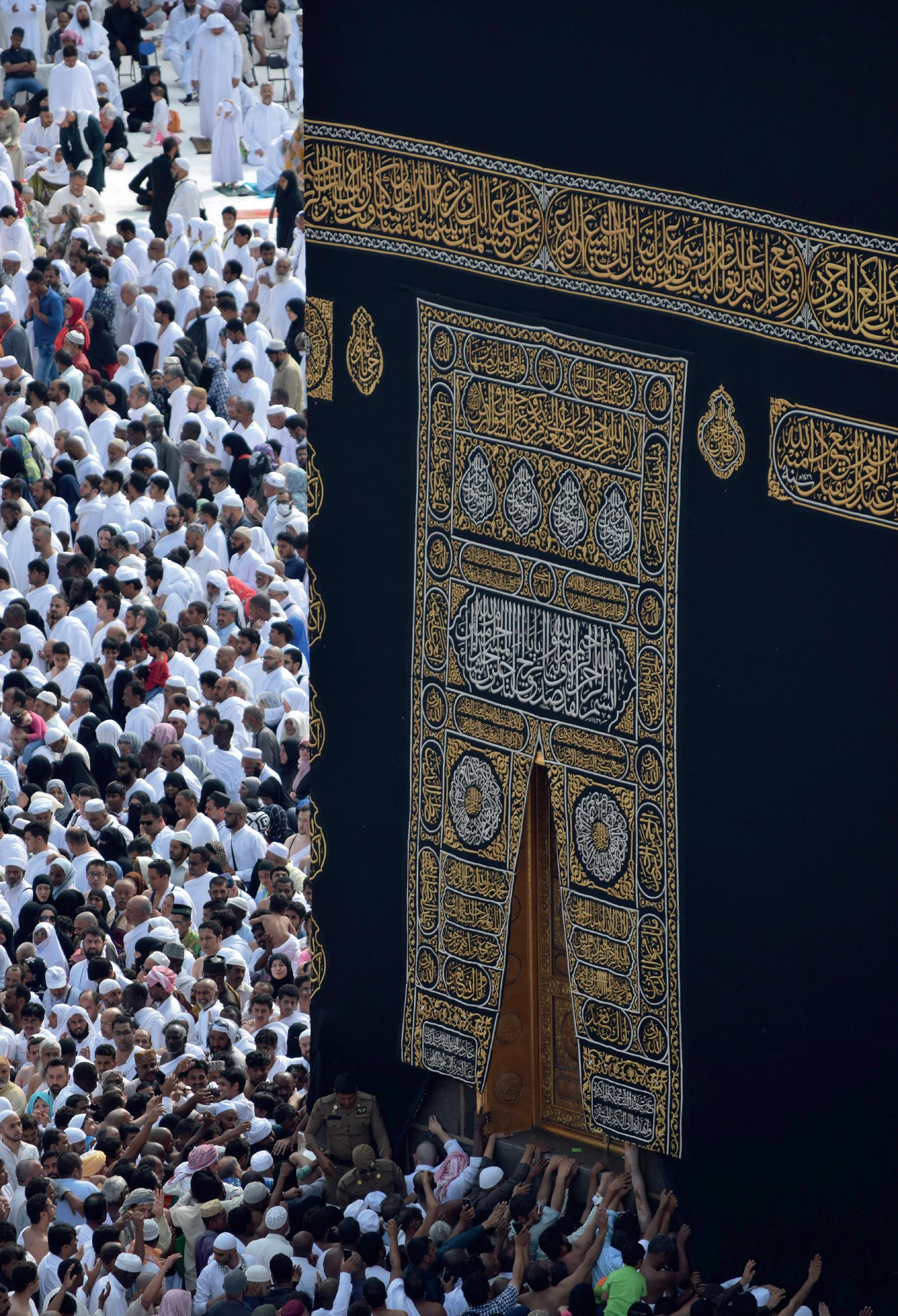
“Ilham (inspiration) does not mean that an idea is infused into the mind of a person who sets himself to think about a thing. A poet is not inspired in the theological sense when brilliant ideas flash upon him as he sits down to make verses. In this case, there is no distinction between good and bad. When the mental powers are applied to a subject, new ideas will flash upon the mind according to the genius of the thinker without any regard to the good or bad nature of the subject. If the word Ilham means the occurring of new
ideas on a particular occasion, a thief or a dacoit or a cut-throat may as well be called the inspired one of God on account of the ingenious plans which suggest themselves to his mischief-devising mind for perpetrating evil deeds. Such a view of inspiration is held by men who are quite ignorant of the true God, who with His word, gives peace and consolation to hearts and knowledge of spiritual truths to those who are not aware of them. What is Ilham then? It is the living and powerful Word of God in which He speaks or addresses one of His servants whom He has chosen or intends to choose from among all people.” And again, “It often happens that the Servant of God prays to Him and immediately receives an answer from Him and this occurs not once or twice, but the process may continue to twenty, thirty or fifty times, and sometimes a whole day or a whole night passes in this verbal intercourse. The answers are always in the most eloquent and sweet words and sometimes in words and language quite unknown to the supplicant. Along with it,
there is an outpouring of heavenly signs and miracles and a profusion of Divine favours and assistance.” Speaking of his own revelations, Ahmad[as] says:
“The word which is revealed to me comes with a majesty, affords a bliss to, and makes an impression upon my soul. It enters into my heart with the firmness of a nail of iron and dispels every darkness. With its entrance, I feel an unalloyed bliss; Ah! that I had the power to describe it.”
An anecdote will make the point clearer. Once an Englishman met Ahmad[as] on a public road at Ludhiana, “Does God speak to you?” he asked. “Yes,” was the ready answer.
“How does He do so?” Ahmad[as] replied,
“Just as you are talking to me.” “Great God” gasped out the simple inquisitor and slowly walked away.
(To be continued …)
The achievements during the era of Hazrat Abu Bakr Siddiqra were being mentioned. In this regard, there are some details in relation to the rights of the Dhimmis [non-Muslim subjects]. Dhimmis were those people who had accepted Islamic rule, but carried on following their own religions and the Islamic government took the responsibility for their protection. Contrary to Muslim [subjects], these people were exempt from military duties and they were not obliged to pay the Zakat [alms] either. As such, a minimal amount of tax, generally known as Jizya, was taken from them for the protection of their lives, wealth and other human rights. This amounted to a mere four dirhams annually per capita and it was only taken from mature and healthy individuals and those that were able to work. The elderly, disabled, the poor and children were exempt from this. As a matter of fact, the disabled and those in need were supported through the Islamic treasury. During the conquests of Iraq and Syria, various tribes and settlements became subjects of the Islamic government on the basis of Jizya. In the treaties that were made with them, such clauses were included as well, that their monasteries and churches would not be demolished and that none of their fortresses would be destroyed in which, at the time of need, they could seek protection from the attack of an enemy. They would neither be prevented from blowing a conch, nor from taking out the cross at their festivals. (Bashir Sajid, Ashra Mubashra, [Lahore: Al-Badr Publications, 2002), p. 183)
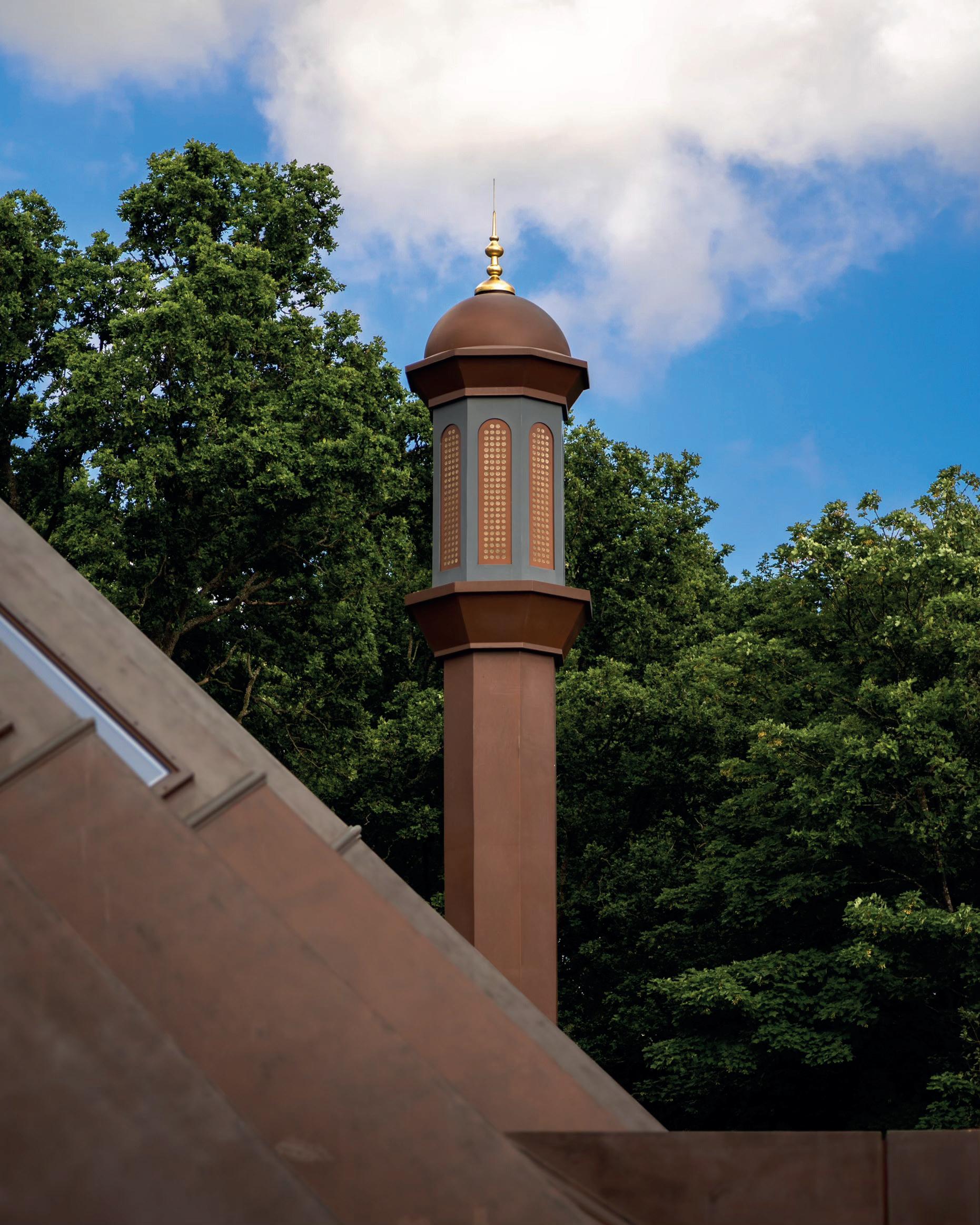
That is, they would be allowed to carry out processions whilst holding the cross.
In the peace agreement which Hazrat Khalidra bin Waleed made with the people of Hirah during the caliphate of Hazrat Abu Bakrra, among its various conditions, it was also stipulated that such an elderly man who was no longer able to work, or was afflicted with an illness, or one who was previously affluent, but had now become so impoverished that people of his own religion had started giving him charity, such a person would no longer be obliged to pay the Jizya. Furthermore, for as long as he remained in the Dar-ul-Hijrah [abode of migration] and Dar-ul-Islam [abode of Islam], i.e. where the Islamic government was established, his expenditures, as well as those of his family, would be supported through the Islamic treasury. However, if
such individuals left the Dar-ul-Hijrah and Dar-ul-Islam and went to other countries, the Muslims would not be responsible for their care and protection. (Abu Yousaf, Kitab-ul-Khiraaj [Maktabatul Taufiqiyah, 2013] p. 148)
According to one narration, the following was written in the agreement which Hazrat Khalidra made with the people of Hirah in that the needy, the disabled and the monks who had dedicated their lives were exempt from paying the Jizya. (Muhammad Husain Haikal, Abu Bakr Al-Siddiq, [Lahore: Islami Kutub Khana] p. 318)
Then there was the great task of the compilation of the Holy Quran, which was carried out during the era of Hazrat Abu Bakr Siddiqra. The compilation of the Holy Quran is a peerless and magnificent achievement during the era of Hazrat Abu Bakr Siddiqra. The context of this task is related to the battle that was fought against Musaylimah Kazzab during the Battle of Yamamah. During the Battle of Yamama, 1200 Muslims were martyred, the vast majority comprising of highly esteemed companions and huffaz [memorisers of the Holy Quran].
According to one narration, the number of martyred huffaz reached 700. (Muhammad Husain Haikal [translated by Anjum Shahbaz Sultan], Hazrat Abu Bakr, [Jhelum, Pakistan: Book Corner], p. 393), (Maulana Muhammad Ahmad Misbahi, Quran Kaise Jama Wuha? [Lahore: Maktabatul A’la Hazrat], p. 58)
Hence, during these circumstances, Allah the Almighty inspired Hazrat Umarra to collect the Holy Quran in one place. He mentioned this to Hazrat Abu Bakrra. The details of this have been recorded in Sahih al-Bukhari in the following manner. ‘Ubaid bin Sabaq relates that Hazrat Zaidra bin Thabit said, “Following the battle against the people of Yamama, Hazrat Abu Bakrra called for me and I saw that Hazrat Umarra was seated beside him as well.” Hazrat Abu Bakrra said, “Umar came to me and said that ‘Many huffaz have been martyred during the Battle of Yamamah. I fear that many Qari or huffaz will be martyred at different places. Owing to this, I am worried lest a large portion of the Quran is lost.’”
For this reason, Hazrat Umarra said that, in his view, Hazrat Abu Bakrra ought to collate the Quran. Hazrat Abu Bakrra said to Hazrat Zaidra, “I said to Umar that how can I carry out a task that the Holy Prophetsa did not perform? But Umar replied saying, ‘By God, there is blessing in this.’ Umar reiterated this to me so many times that eventually Allah the Almighty bestowed contentment in my heart for this task, and I too agreed with Umar’s idea.”
Hazrat Zaidra says that Hazrat Abu Bakrra said, “O Zaid! Indeed, you are an intelligent young man, and we deem you free from any blame or blemish. You used to write down the revelations given to the Holy Prophetsa. Thus, you ought to now find the [parchments] of the Quran and collate them.” Hazrat Zaidra further says, “By Allah! Had he given me the responsibility of moving a mountain from one place to another, then this task would not have been as burdensome for me as was collecting the Quran. This was a monumental task that was assigned to me. I submitted, ‘How can you do something that the Holy Prophetsa did not do?’ Hazrat Abu Bakrra replied, ‘By
God, this task is nothing but blessed.’ Hazrat Abu Bakrra reiterated this so much that Allah the Almighty bestowed contentment in my heart for this task, just as He had bestowed it to Hazrat Abu Bakrra and Hazrat Umarra Thus, I began searching for the [parchments of] the Holy Quran, and started collecting them from stalks of date-palm trees, white stones and from those who had memorised them, until I found the last verses of Surah at-Taubah from Abu Khuzaimah Ansari, which were not found with anyone besides him [the verse was]:
[“Surely, a Messenger has come unto you from among yourselves; grievous to him is that you should fall into trouble.” (Surah at-Taubah, Ch. 9: V. 128)]
(It was from this verse up to the end of Surah Taubah).
This written manuscript of the Quran remained with Hazrat Abu Bakrra until he passed away. After him, it remained with Hazrat Umarra and after him, it passed on to Hazrat Hafsara, the daughter of Hazrat Umarra.” (Sahih al-Bukhari, Kitab Fazail-ulQuran, Baab Jam-ul-Quran, Hadith 4986)
With regards to the Ahadith on the collation of the Holy Quran, Imam Baghawi has written a footnote in his book, “Sharah al-Sunnah”, “The Holy Quran, which was revealed to the Holy Prophetsa was collated in its entirety by the companions in the exact form as it was revealed and without any discrepancies. The reason why the companions collated the Quran, as mentioned in the Ahadith, is that initially the Quran was dispersed across various stalks of date-palm trees, on stone slates and memorised by various huffaz. Owing to the martyrdom of some huffaz, the noble companions were worried, lest some of the Quran becomes lost. For this reason, they went to Hazrat Abu Bakrra and submitted a request to compile the Holy Quran in one place. This task was completed with the unanimous agreement of all the companions. Therefore, without even the slightest error in placement, they arranged the Quran in the order they had heard it from the Holy Prophetsa. The Holy Prophetsa would recite the Quran to the companions and he would recite the Quran to them in the exact same order that is present in the manuscript before us today. The Holy Prophetsa was taught this order by the angel Gabrielas. At the time of each revelation, Gabrielas would inform the Holy Prophetsa to put the revealed verses in such and such chapter after such and such verse.” (Sharah Al-Sunnah, Kitab Fazail-ul-Quran, Baab Jam-ul-Quran, [Al-Maktabatul Taufiqiyah, 2014], Riwayat no. 1232, pp. 484-485)
The collation of the Quran was carried out in the time of Hazrat Abu Bakrra. In this regard, Hazrat Alira says, “May Allah the Almighty shower His mercy upon Abu Bakr, for he was the first one to safeguard the entire Quran in the form of a manuscript.” (Musanaf ibn Abi Shaibah, Kitab Fazailul-Quran, Vol. 8, [Lahore: Maktabah Ruhaniyah], p. 827)
While mentioning the compilation of the Holy Quran, Hazrat Musleh-e-Maudra states:
“The only thing that had not happened up until that point was that the Holy Quran had not been compiled into a single copy. When five hundred of those who had
memorised the Holy Quran were martyred in that battle (of Yamamah), Hazrat Umarra went to Hazrat Abu Bakrra and said, ‘Five hundred of those who had memorised the Holy Quran were martyred in a single battle, and there are many battles ahead of us. If more of those who have memorised the Quran are martyred, then people will fall into doubt regarding the Holy Quran. Hence, the Quran should be compiled into a single copy.’ Initially, Hazrat Abu Bakrra rejected this idea, but eventually he agreed. Hazrat Abu Bakrra appointed Zaidra bin Thabit for this task, as he had been a scribe of the Holy Quran during the lifetime of the Holy Prophetsa and other senior Companions were also appointed to help him. Although there were thousands of Companions who had committed the Holy Quran to memory, it would be impossible to gather thousands of Companions at the time of copying down the Holy Quran, hence Hazrat Abu Bakrra instructed that the Holy Quran should be copied from written copies. He also instructed the precaution of having at least two people who had memorised the Holy Quran to verify it. Hence, the various pieces of leather and bones upon which verses of the Holy Quran had been written were gathered in one place and those who had memorised the Quran verified them. If there could be any doubt about the Holy Quran, then it could only be regarding the time between the Holy Prophet’ssa demise and that period. However, there is no knowledgeable person who can say that there could be any difficulty in compiling a book that was recited every day and the book, that is recited aloud by those who have memorised the Holy Quran for Muslims during every Ramadan and the book which has been memorised from beginning to end by thousands of people; and although this book had not been gathered into a single copy, scores of Companions used to write it down and it was written out in its entirety in different fragments? Furthermore, could an individual, who himself had been appointed as a scribe of the Holy Quran during the time of the Holy Prophetsa and had committed it to memory, find any difficulty in compiling it? Seeing as the Quran was recited every day, would it be possible for there to be any mistake in that copy without it being recognised by any person who had committed it to memory? If such veracity is doubted, then there remains no argument in the world that can stand. The truth is that there is no other writing which has been established with the same continuity as the Holy Quran.” (Deebacha Tafsir-ul-Quran, Anwar-ul-Ulum, Vol. 20, pp. 432-433)
Hazrat Musleh-e-Maudra is expounding upon the argument that the Holy Quran is in its original form without any change whatsoever – in response to the allegation that it had been altered, etc. This response also applies to similar allegations which are raised even today.
Whilst responding to another allegation, Hazrat Musleh-e-Maudra states:
“Another allegation raised is that the entire Quran was not written in its entirety during the time of the Holy Prophetsa. The response is that this is not correct; the entire Holy Quran was certainly written out during the lifetime of the Holy Prophetsa (those who say that it was not written are wrong, it was written out). As has been narrated by Hazrat Usmanra, whenever a
portion [of the Holy Quran] was revealed, the Holy Prophetsa would summon the scribes and would instruct where that verse should be added. When there is historical evidence present, then to say that the Holy Quran was not written in its entirety during the lifetime of the Holy Prophetsa would be foolish. Then, there remains the question of why it was written out during the era of Hazrat Abu Bakrra. The answer is that during the lifetime of the Holy Prophetsa, the Holy Quran was not written out in a single copy as it is today. The thought occurred to Hazrat Umarra that people should not think that the Holy Quran is not preserved, hence he said the following to Hazrat Abu Bakrra:
‘I deem it most suitable for you to give the command for the Holy Quran to be compiled into the form of a single book’; he did not suggest that it should be inscribed. Then, Hazrat Abu Bakrra summoned Zaidra and instructed him to compile the Quran. Hence, he said:
‘Gather it in one place’. He did not instruct him to write it. Therefore, these words alone prove that the matter at hand was of compiling the various fragments on which the Quran was written into a single copy, not of writing it down.” (Fazail-ulQuran (1), Anwar-ul-Ulum, Vol. 10, pp. 514-515)
The Holy Quran was compiled into a single copy during the Khilafat of Hazrat Abu Bakrra and then further progress was made during the Khilafat of Hazrat Usmanra, when all Arabs, in fact, all Muslims, were brought together to a single dialect. Hence, this work for the propagation of the Holy Quran was done during the era of Hazrat Usmanra
Hazrat Musleh-e-Maudra states:
“After Hazrat Abu Bakrra, a complaint was made during the time of Hazrat Usmanra that people from various tribes recited the Holy Quran in different dialects, which had a negative impact upon non-Muslims, as they thought that there were different versions of the Holy Quran. Dialect refers to the fact that some tribes would read certain letters with a zabar [diacritical mark above], whereas others would recite that same letter with a zer [diacritical mark underneath] and then those who would recite it with a paish [diacritical mark indicating a rounded sound]. This is something that cannot be found in any other language, aside from Arabic. Hence, when those who are not familiar with Arabic hear this, they will think that one is saying something while the other is saying something different, whereas what they are saying is the same. Hence, in order to avoid this disorder, Hazrat Usmanra recommended that copies should be made of the manuscript [of the Holy Quran] which was compiled during the era of Hazrat Abu Bakrra and should be sent to different countries with the instruction that the Quran should be recited only according to this dialect and none other. This suggestion by Hazrat Usmanra was not at all unbecoming; during the lifetime of the Holy Prophetsa, people lived according to their tribes, each living separate from the other and so they were each accustomed to their own way of speaking (they each spoke in their own unique accents). However,
upon joining the Holy Prophetsa, all of the Arabs became civilised and rather than being considered the language of the illiterate, Arabic became the language of the educated. Many Arabs learned how to read and write, which made it easy for even the tribespeople to pronounce words as they were in an educated fashion, which was in essence the language of the land. Hence, seeing as everyone was acquainted with this intellectual form of the language, there was no reason for them to be granted permission to continue reciting the Holy Quran in their tribal accents and thus becoming a trial for non-Arabs. For this reason, Hazrat Usmanra made copies of the Quran with diacritic marks according to the Meccan dialect which he distributed to different nations. Regarding the future, he instructed that the Holy Quran should not be recited in any dialect other than the Meccan dialect. On account of not understanding this point, European writers, along with writers from other nations, have always raised the allegation that Hazrat Usmanra created a new Quran or that Hazrat Usmanra changed something in the Holy Quran. However, the reality of the matter is what has just been stated.” (Deebacha Tafsir-ul-Quran, Anwarul-Ulum, Vol. 20, pp. 433-434)
The Promised Messiahas states:
“There is no doubt that the Quran is an Oft-recited Revelation and its entirety, down to every dot and letter, has indeed remained constant and it was with the greatest of provisions that Allah the Almighty revealed it in the care of angels. Then, the Holy Prophetsa left no stone unturned in ensuring the same provisions and he made it his
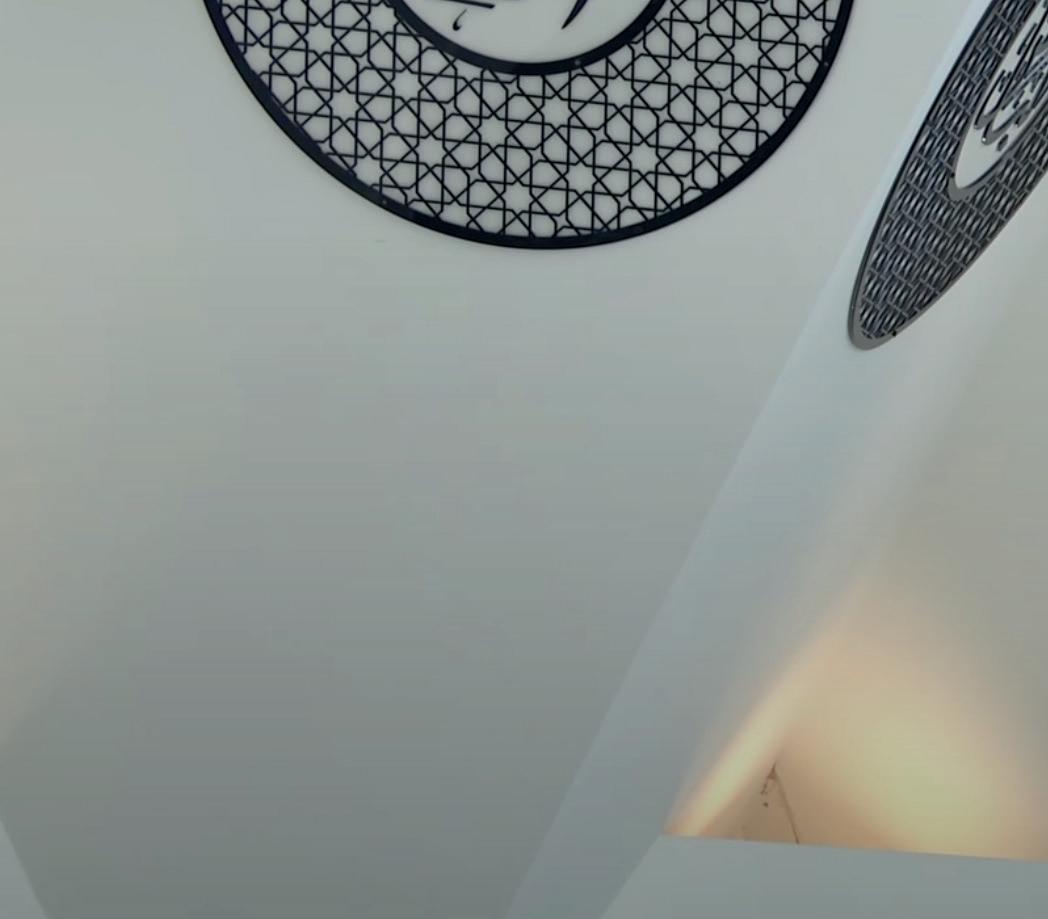
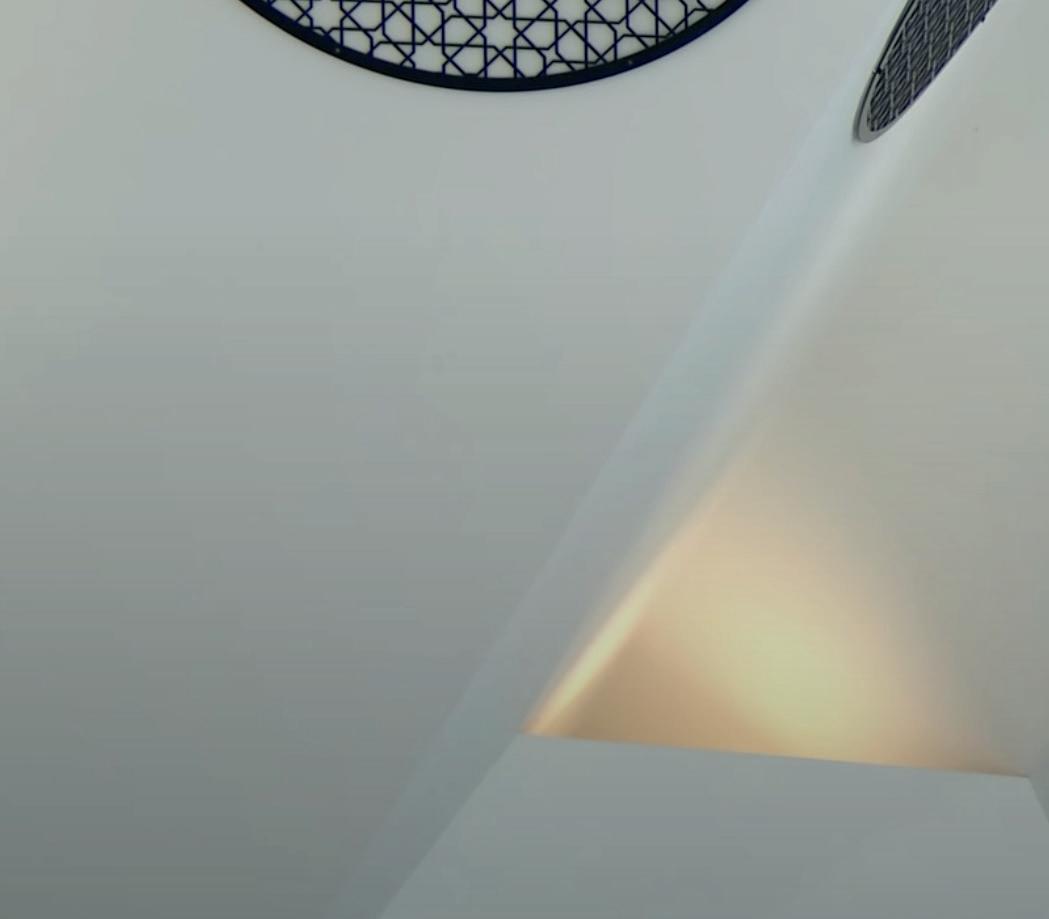
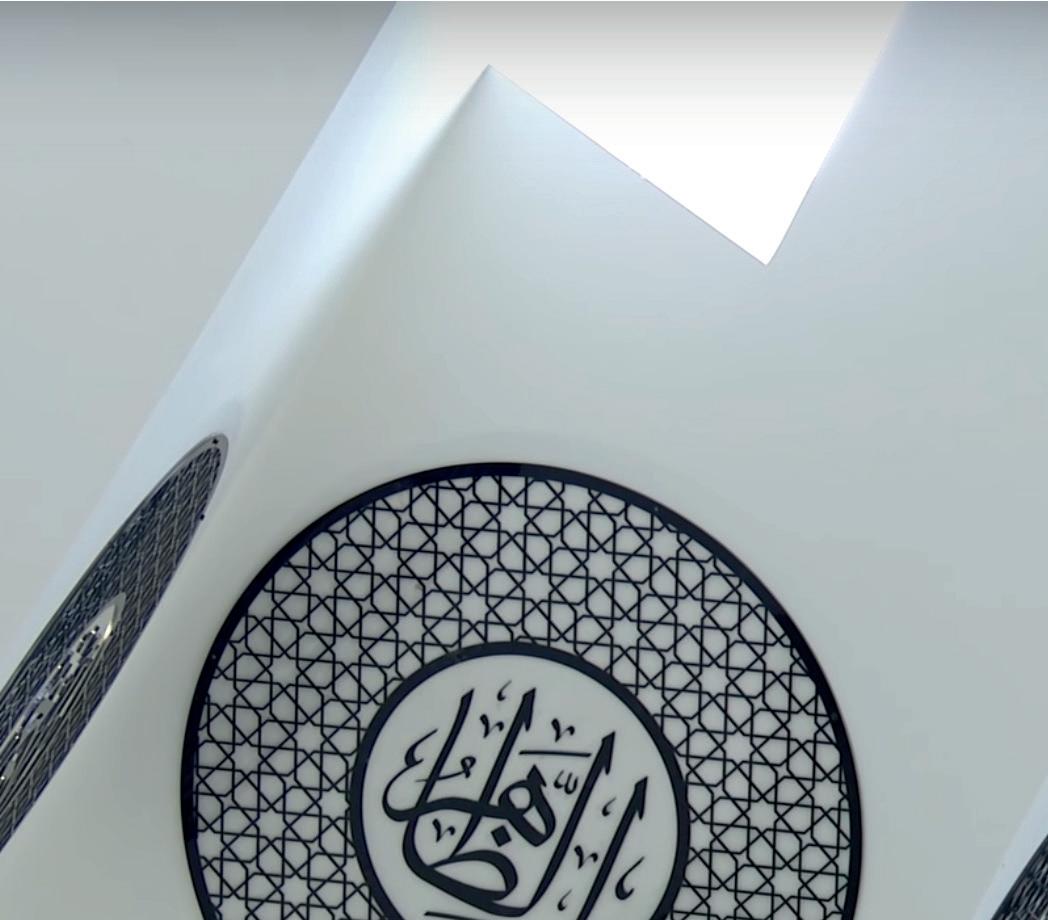
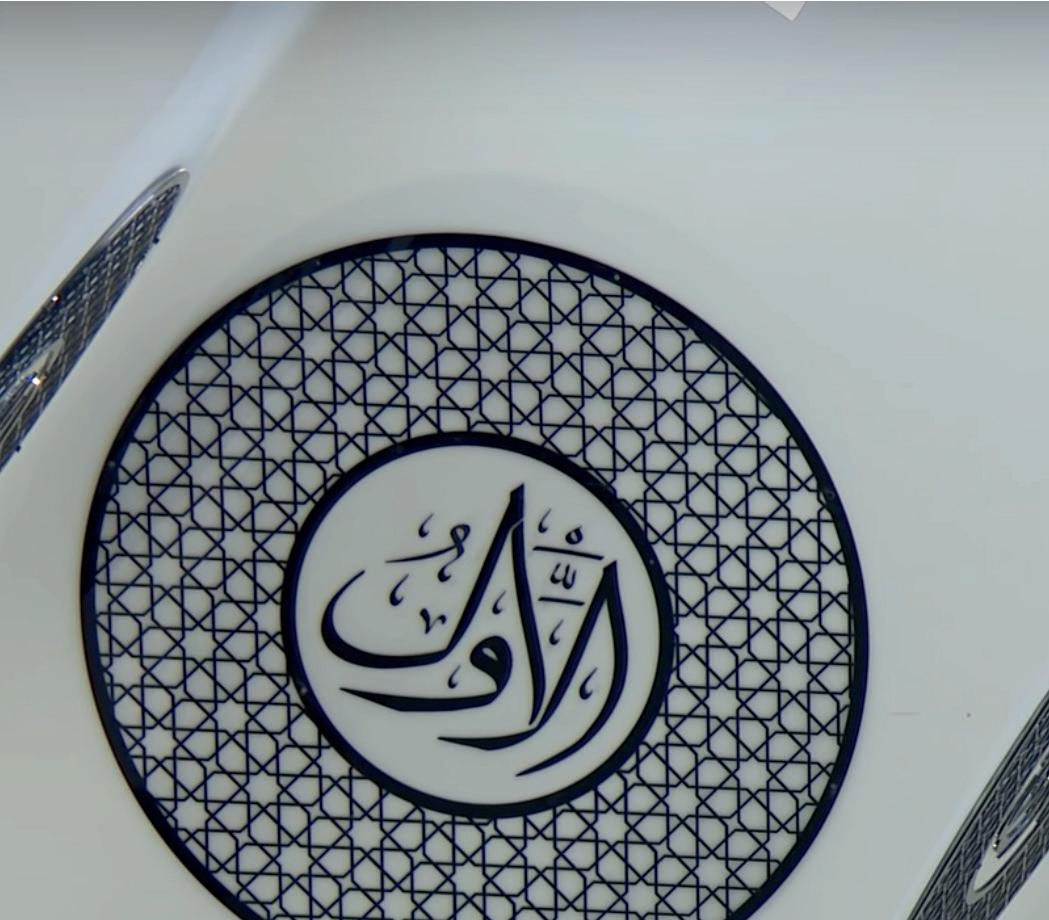
constant practise to ensure that each verse was written before his very eyes as it was revealed, to the extent that he then gathered them, and placed each verse in order himself and also made it a constant practise to recite them in prayer and aside from prayer as well. He did this until he passed on from this world and went to meet his Greatest Friend, his Most Beloved, Lord of All the Worlds.”
Then, the Promised Messiahas states:
“Thereafter, the First Khalifa, Hazrat Abu Bakr Siddiqra, undertook the task of gathering all the verses in the same order which he had heard from the Holy Prophetsa Then, after Hazrat Abu Bakr Siddiqra, Allah the Almighty granted the Third Khalifa, Hazrat Usmanra the ability to unify the Quran according to the Meccan dialect.” (Hamamatul Bushra, pp. 101-102)
As for the question of how long the Sahifa-e-Siddiqui, the actual copy compiled by Hazrat Abu Bakrra, remained preserved, it is recorded that the copy of the Holy Quran which Hazrat Abu Bakrra had formed into a single copy through Hazrat Zaidra bin Thabit is called the Sahifa-e-Siddiqui This copy remained with Hazrat Abu Bakrra until his demise. Thereafter, it was in the possession of Hazrat Umarra, who gave it to the Mother of Believers, Hazrat Hafsara, with the guidance that it should not be given to anyone except if a person wished to use it to make a copy of their own, then they could benefit from it. Hence, Hazrat Usmanra borrowed the copy from Hazrat Hafsara and made a few copies and returned the original back to Hazrat Hafsara. In 54 AH, when Marwan became the governor of Medina, he sought to obtain this copy from Hazrat
Hafsara but she refused. After the demise of Hazrat Hafsara, Marwan took it from Hazrat Abdullah bin Umarra and destroyed it. However, Hazrat Usmanra had already preserved it [by making copies]. (Siyar alSahabah, Vol. 1 [Karachi, Pakistan: Dar alIsha’ah, 2004], p. 44.), (Fath-al-Bari, Kitab Fazail-ul-Quran, Baab Jam-ul-Quran, Vol. 8, [Cairo: Dar-ul-Riyan Li Al-Turath, 1887], pp. 636-637)
Those tasks which Hazrat Abu Bakr Siddiqra was the first to carry out and are attributed to him are known as Awwaliyaat Abu Bakr. There are various tasks which he was the first to carry out. Hazrat Abu Bakr Siddiqra was the first person to accept Islam. Secondly, he was the first person to build a mosque in front of his house in Mecca. Thirdly, in support of the Holy Prophetsa, he was the first person to fight against the Quraish of Mecca. Fourthly, he was the first person to purchase countless slaves who had been subjected to intense persecution owing to their acceptance of Islam and then set them free. Fifth, he was the first person to compile the Quran into a single manuscript. Sixth, he was the first person to name the Quran as Mushaf. Seventh, he was the first person to be called Khalifa-eRashid. Eighth, he was the first person to be appointed as the Amir-ul-Hajj in the lifetime of the Holy Prophetsa. Ninth, he was the first person to lead the Muslims in prayer during the lifetime of the Holy Prophetsa. Tenth, he was the first person to establish the Baitul-Maal [treasury] in Islam. Eleventh, he was the first , for whom the Muslims fixed an allowance. Twelfth, he was the first , who nominated the next Khalifa after him.
Hazrat Umarra was nominated by Hazrat Abu Bakrra. Thirteenth, he was the first Khalifa, who at the time of when his Bai’at took place, his father, Abu Quhafahra was still alive. Fourteenth, he was the first person in Islam whom the Holy Prophetsa granted a title. Fifteenth, he was the first person whose four generations had the honour of being companions. His father, Hazrat Abu Quhafahra was a companion, Hazrat Abu Bakrra himself, his son, Hazrat Abdur Rahmanra bin Abi Bakrra and his grandson, Hazrat Muhammad bin Abdur Rahmanra bin Abi Bakr. They were all companions. (Professor Ali Muhsin Siddiqi, Al-Siddiq, pp. 381-382)
In relation to the qualities of Hazrat Abu Bakrra it has been narrated by Hazrat Aishara with regards to his blessed countenance that she once saw an Arab man, who was walking on foot, and at the time, Hazrat Aishara was sitting in her [camel] litter. Hazrat Aishara stated, “I have never seen anyone resemble Hazrat Abu Bakrra more than this person.”
The narrator states that they enquired from Hazrat Aishara if she could describe the appearance of Hazrat Abu Bakrra to them. Upon this, Hazrat Aishara stated, “Hazrat Abu Bakrra had a fair complexion and was of a thin build. He had very slender cheeks and his back was slightly curved forward as a result of which his outer garment would slip down from his back. He had a slender face and deep-set eyes and he had a prominent forehead.” (Ibn Saad, Al-Tabaqat al-Kubra, Vol. 3, Abu Bakr Siddiqra wa man Bani Taym bin Murrah bin Kaab [Beirut, Lebanon: Dar al-Kutub al-Ilmiyyah, 1990], p. 140)
Ibn Sirin states that he asked Hazrat Anasra bin Malik whether Hazrat Abu Bakrra dyed his hair to which he replied in the affirmative and stated that he applied Mehndi and Katam on his hair and beard. Katam is the name of a plant. (Sahih Muslim, Kitabul-Fazail, Vol. 12, Hadith 4304, [Rabwah: Nur Foundation], pp. 248-249)
In relation to his piety and righteousness, it is written that the Holy Prophetsa granted some land to Hazrat Rabiyara bin Ja’far and Hazrat Abu Bakrra. However, they had a dispute over a tree and during the course of the argument, Hazrat Abu Bakrra said something to him in a rather stern manner. Later, Hazrat Abu Bakrra became remorseful over it and said to Hazrat Rabiyara to also say something in a similar manner so that it could serve as retribution. In other words, to say something just as Hazrat Abu Bakrra had said to him, but Hazrat Rabiyara refused. Following this, they both went before the Holy Prophetsa and related the entire incident to him. Upon this, the Holy Prophetsa stated, “Do not say something in a stern tone, rather offer the prayer:
‘O Abu Bakr! May Allah forgive you.’”
This is exactly what he did. When Hazrat Abu Bakrra heard this it had such a deep impact upon him that he returned whilst crying profusely. (Ibn Hajr Asqalani, Fath al-Bari Sharh Imam al-Bukhari, Vol. 7, Hadith no. 3661 [Karachi: Qadimi Kutub Khana Maqabil Aram Bagh], p. 31.)
In another narration, Hazrat Abu Bakrra saw a bird sitting on a tree and he said, “O bird! Glad tidings are given to you. By Allah, I desire to be like you. You are sat upon a tree and eat the fruits and then fly away. You will
neither be held accountable nor punished for your actions. By Allah, I wish that I was a tree on one side of a path and a camel would pass by and take hold of me and put me in its mouth and chew me up and then quickly swallow me down. Thereafter, it expels me from itself in the form of a dropping. I wish I was not a human.” (Kanz al-‘Ummal, Vol. 13, Kitab-ul-Fada’il, Fada’il al-Sahabah, Hadith 35694, [Beirut, Dar-ul-Kutub AlIlmiyyah, 1985], p. 237)
Whilst commenting on verse 41 of Surah An-Naba’:
That is, “and the disbeliever will say, ‘Would that I were mere dust!’”
Hazrat Musleh-e-Maudra states:
“Certain Muslims have gone to such extreme lengths in their malice towards the companions that they claim that since Hazrat Abu Bakrra used to repeat these words, hence it proves that he was a disbeliever.”
In other words, he would recite:
[‘And the disbeliever will say, “Would that I were mere dust!”’]
And because Hazrat Abu Bakrra used to recite this, which was a statement attributed to the disbelievers, therefore they claimed that he was a disbeliever, God-forbid.
Hazrat Musleh-e-Maudra states:
“Even if this narration is proven to be authentic and this verse relates to Hazrat Abu Bakrra, then according to the high level of faith possessed by Hazrat Abu Bakrra, its meaning would be that Hazrat Abu Bakrra – who rejected what the disbelievers stated – he would say, ‘I wish that God Almighty treated me in such a manner whereby He would neither reward me for my good deeds and nor punish me for my errors.’ These words, in fact, are an expression of a perfect believer. It is recorded in the Ahadith with regards to the Holy Prophetsa himself that he would say, ‘I will not be forgiven owing to my good deeds, rather it would be owing to the grace of Allah the Almighty.’ The word ‘Kafir’ [disbeliever] has been used ironically here and it means that people claim that he is a Kafir, yet he was the one who would stand the closest to the Holy Prophetsa during the battles; he is the one who sacrificed all his wealth for the sake of the Holy Prophetsa; he gave his 11-year-old daughter’s hand in marriage to the Holy Prophetsa, who at the time was 54-55; he was the one who accompanied the Holy Prophetsa during his migration and the Holy Prophetsa chose him alone for this task in the face of opposition from the whole of Mecca. Thus, the Holy Quran has used this word [Kafir] in an ironic manner. (And, that is if this verse is related to Hazrat Abu Bakrra. This word has been used as an irony). The one who offered all these sacrifices is labelled as a ‘Kafir’ and yet those who have not done a single deed that can even come close to his deeds consider themselves to be believers.” (Tafsir-e-Saghir, Surah an-Naba’, Verse 41, p. 798 [footnote])
When the time of his demise drew near, Hazrat Abu Bakrra stated to Hazrat Aishara: “O my daughter! Do you know that, amongst all the people, you are the most beloved and dearest to me? I gifted you a particular piece of land of mine. However, had you taken it in your possession and profited from its gains, then indeed it would
have been solely yours, but now all my heirs have a right to it. Thus, I desire that you return it to me (i.e. to return the gift) because you did not take it into your possession and I continued to use it in my lifetime. Therefore I would like it to be distributed amongst my progeny according to the Book of Allah [Shariah] and I wish to meet my Lord in a state whereby I did not show preference to any child of mine over another.” Upon this, Hazrat Aishara stated that his instructions would be fulfilled to the letter. (Ibn Saad, AlTabaqat al-Kubra, Vol. 3, Dikr Wasiyyat Abu Bakr [Beirut, Lebanon: Dar al-Kutub al-Ilmiyyah], pp. 145-146), (Allamah AlSuyuti, Tarikh Al-Khulafa [Translation], [Karachi: Nafees Academy], p. 89)
The following incident, which I am about to relate, has been mentioned once before as well, but I shall mention it again with reference to Hazrat Abu Bakr’sra qualities.
When Allah the Almighty bestowed upon him the mantle of Khilafat, Hazrat Abu Bakrra, who used to be a clothes merchant, placed some sheets of cloth on his shoulder the next day and headed to the marketplace as per his routine. Along the way he met Hazrat Umarra and Hazrat Abu Ubaidahra. They submitted, “O Khalifa of the Messengersa! Where are you going?” Hazrat Abu Bakrra replied that he was going to the marketplace. They submitted, “You are the leader of the Muslims. Please return and we shall fix an allowance for you. There is no need for you to sell [clothes].” (Siyar al-Sahaba, Vol. 1, p. 77)
With regard to the details of his allowance, Allama ibn Sa’d mentioned that Hazrat Abu Bakrra would receive two garments and when they would become old, he would return those and get two new ones. During his travels, he would take a mount and the amount of money he received to cover the expenses of his family was the same amount he used to spend on them prior to his Khilafat. (Siyar al-Sahaba, Vol. 1, p. 82)
Hazrat Musleh-e-Maudra states:
“Hazrat Abu Bakrra was the leader of the entire Muslim world, but what did he receive? Despite having complete control over the public funds, he never took any of it for himself. Although Hazrat Abu Bakrra was a very successful merchant, since he had the habit that whatever wealth he received he would immediately spend it in the way of God Almighty, therefore it so happened that upon the demise of the Holy Prophetsa when he became the , he did not have any money in cash at the time. The very next day, after becoming the Khalifa, Hazrat Abu Bakrra took a small bag of clothes and left in order to sell it. Hazrat Umarra happened to meet him on the way and enquired as to what he was doing. Hazrat Abu Bakrra replied that, after all, he had to do something in order to eat; if he did not sell those clothes, how would he provide for himself? Hazrat Umarra stated that this was not possible, because if he spent his time selling clothes, who would fulfil the responsibilities of the ? Hazrat Abu Bakrra replied, ‘If I do not do this, how will I survive?’ Hazrat Umarra said that he should take some allowance from the Bait-ul-Maal. Hazrat Abu Bakrra stated that he could not bear to take anything from the Bait-ul-Maal because he had no right over it. Hazrat Umarra stated that when the Holy Quran had permitted that the funds of the Bait-ul-Maal could be spent on those
who served their faith, then why could he not take it? And so, an allowance was fixed for Hazrat Abu Bakrra from the Bait-ulMaal. The amount that was fixed was just sufficient enough to cover the expense for food and clothes.” (Tafsir-e-Kabir, Vol. 8, p. 468)
Ibn Abi Malikah relates that if ever the reins of his camel got loose from his hand and fell, Hazrat Abu Bakrra would make his camel sit down and then pick up the reins himself. He was asked [by those with him] why did he not instruct them to do it for him and Hazrat Abu Bakrra replied, “My beloved, the Holy Prophetsa had instructed me to not ask anyone else to do something for me.” (Ahmad bin Hanbal, Musnad Ahmad bin Hanbal, Vol. 1, Musnad Abi Bakr Al-Siddiq, Hadith 65 [Beirut, Lebanon: ‘Alam al-Kutub, 1998], p. 92.)
Such was the level of caution he would take.
Hazrat Musleh-e-Maudra states:
“Once, the Holy Prophetsa heard some people outside of the mosque say, ‘What excellence does Abu Bakr have over us? We also perform the same pious deeds as he performs.’ When the Holy Prophetsa heard this, he stated, ‘O people! Abu Bakr does not have excellence over you due to his prayer or fasting, rather it is owing to the piety in his heart.’” (Khutbat-e-Mahmud, Vol. 19, p. 765)
In other words, the piety in his heart, the love for the Holy Prophetsa and the fear and awe of Allah the Almighty in his heart was of such a high standard that he had excellence over them. And this was not just merely a condition of his heart, rather his deeds were in accordance with this as well.
Whilst explaining the commentary of a Quranic verse, the Promised Messiahas has mentioned the status and rank of Hazrat Abu Bakrra as follows:
“Allah the Almighty has stated [in this verse] that you should continue to worship until you attain the stage of perfect conviction whereby all the barriers and veils of darkness are removed and one believes that his condition is no longer like that of before. Rather, it is as if there is a new country; a new land and a new sky and he himself has also become like a new creation. This new life is what the Sufis refer to as Baqa. When a person attains this level, then Allah the Almighty breathes into him of His spirit and the angels then descend upon him. This is the very intricate phenomenon which the Holy Prophetsa mentioned in relation to Hazrat Abu Bakrra that if one wants to see a corpse walking on the earth then they should look at Abu Bakrra and Abu Bakr’sra status was not owing to his actions, rather due to what was in his heart.”
(Malfuzat, Vol. 2, p. 98)
Hazrat Abu Saeed Khudrira relates that the Holy Prophetsa once set off on a journey and people also accompanied him. When they stopped at one place, people sat in various smaller groups. Hazrat Abu Saeed Khudrira further relates that he sat with Hazrat Abu Bakrra and there was also a villager with them from among the Bedouin tribes. They were inside a house of a Bedouin and the woman in the house was expecting. The villager, who was with them, said to the woman that if she desired to give birth to a boy, she should give him a goat. And so, the woman gave him a goat. This man then recited some couplets with a similar rhyme. (He read a few self-composed incantations).
He then slaughtered the goat. When people sat around to eat, someone among them told everyone about the entire incident of how that man had received the goat by telling the woman that he would pray and she would have a son. The narrator states that Hazrat Abu Bakrra was also seated amongst them to eat the food and when he looked towards him, he expressed intense dislike over this and started to put his fingers in his throat in order to bring up the food. (Ahmad bin Hanbal, Musnad Ahmad bin Hanbal, Vol. 8, Musnad Abi Saeed Al-Khudri, Hadith 11420 [Cairo: Dar-ul-Hadith, 2012], pp. 1920.)
He did not wish to eat food which had been used as a means of committing shirk Hazrat Aishara relates:
“There was a servant of Hazrat Abu Bakrra who would bring him his earnings, and Hazrat Abu Bakrra would eat from his earnings. One day, he brought something and Hazrat Abu Bakrra ate from it. The servant asked, ‘Do you know what this is?’ Hazrat Abu Bakrra replied, ‘What is it?’ He answered, ‘I was soothsaying to a person in the era of ignorance, and I knew very little about soothsaying yet I still deceived him. He met me and gave something in return for this. Hence, this is what you have eaten from.’ (He would bring gifts, or come having cooked something). Hazrat Abu Bakrra placed his hand down his throat and vomited everything he had eaten, saying, ‘I cannot eat from this forbidden food.’” (Sahih al-Bukhari, Kitab Manaqib-ul-Ansar, Baab Ayaam-ul-Jahiliyyah, Hadith 3842)
Hazrat Abdullahra bin Umar relates that the Holy Prophetsa said, “One who drags their clothes on the ground out of pride, Allah shall not look at them on the Day of Judgement.” Hazrat Abu Bakrra said, “One side of my clothes always remains loose unless I pay special attention to it.” Upon this, the Holy Prophetsa stated, “You do not do this out of arrogance.” (Sahih al-Bukhari, Kitab Fazail Al-Sahab Al-Nabi, Hadith 3665)
The Promised Messiahas states:
“The Holy Prophetsa once said that one whose waist sheet drags across the ground shall be in the fire. Hearing this, Hazrat Abu Bakrra began to weep, for his waist sheet was such. The Holy Prophetsa said, ‘You are not among them.’ Therefore, intentions play a vital role and it is necessary to pay due regard to the status of others.” (Malfuzat, Vol. 7, p. 25)
Then there is mention of his complete obedience, love and sense of honour for the Holy Prophetsa. One day, Hazrat Aishara was speaking really quickly in the house to the Holy Prophetsa when her father (i.e. Hazrat Abu Bakrra) entered. Seeing this state of affairs he could not tolerate it and advanced forward to strike his daughter, saying, “Is this how you speak to the Messengersa of Allah?” Seeing this, the Holy Prophetsa came between the father and daughter and saved Hazrat Aishara from the impending punishment from Hazrat Abu Bakrra. When Hazrat Abu Bakrra left, the Holy Prophetsa said in a light-hearted manner to Hazrat Aishara, “See how I saved you from your father today.” A few days later, Hazrat Abu Bakrra came once more and Hazrat Aishara was speaking joyfully with the Holy Prophetsa. Hazrat Abu Bakrra said, “You included me in your dispute, now share me in your joy too.” Thereupon, the
Holy Prophetsa said, “We let you share in it.” (Sunan Abi Daud, Kitab-ul-Adab, Hadith 4999)


Hazrat Uqbahra bin Harith relates, “I saw Hazrat Abu Bakrra whilst he was carrying Hazrat Hasanra saying, ‘May my father be sacrificed for you. You resemble the Holy Prophetsa, not Hazrat Alira.’ Hazrat Alira laughed after hearing this.” (Sahih alBukhari, Kitab Fazail Al-Sahab Al-Nabi, Hadith 3750)
Hazrat Abdullahra bin Umar relates:
“When Hazrat Umar’sra daughter Hazrat Hafsara became a widow upon the demise of [her husband] Hazrat Khunaisra bin Hudhafah Sahmi – who was a companion of the Holy Prophetsa who participated in the Battle of Badr – he passed away in Medina, so Hazrat Umarra bin Al-Khattab said, ‘I met Usman bin Affan and mentioned Hafsa to him, saying that he can marry her if he so wills.’ He replied, ‘I shall deliberate on this matter.’ Hence, for several days he waited, before Hazrat Usmanra said, ‘I consider it appropriate that I marry not in these days.’ Hazrat Umarra then said, ‘I then met Hazrat Abu Bakrra and told him I would marry Hafsa to him if he wished.’ Hazrat Abu Bakrra remained silent and gave no reply. Hazrat Umarra then says, ‘I became even more saddened by [the response from] Hazrat Abu Bakrra than Hazrat Usman’sra and waited further nights. Then the Holy Prophetsa sent his request to marry Hafsa and I married her to him. Hazrat Abu Bakrra then met me and said, “Perhaps you are angry with me as I gave no reply when you mentioned Hafsa.” I answered that this was true. He then said, “In fact, nothing was stopping me from responding to you in relation to what you presented, aside from the fact that I came to know that the Holy Prophetsa desired to marry Hafsa. I am not one to disclose this intention of the Holy Prophetsa (i.e. to tell you that this is what the Holy Prophetsa wishes). This is why I remained silent or refused. If the Holy Prophetsa had decided against this proposal, then I would have surely accepted to marry your daughter.’” (Sahih al-Bukhari, Kitabul-Maghazi, Hadith 2005)
In a narration by Hazrat Ibn Abbasra in relation to the praise expressed by Hazrat Alira for Hazrat Abu Bakrra he says, “I was stood among those people after the demise of Hazrat Umarra who prayed for him once he had been placed upon a plank. All of a sudden, a person came from behind, placing his elbow on my shoulder and said, ‘May Allah have mercy on you. I had hoped that you also be buried alongside our two companions, because I had heard the Holy Prophetsa say many times, “Myself, Abu Bakr and Umar were at such and such place” or “I, Abu Bakr and Umar did such and such” or “I, Abu Bakr and Umar then left”. This is why I was hoping that you also be buried alongside our two companions.’ When I turned I saw that it was Hazrat Ali bin Talibra.” (Sahih al-Bukhari, Kitab Fazail Al-Sahab Al-Nabi, Hadith 3677)
The rest shall be presented in the future, God willing.
(Official Urdu transcript published in Al Fazl International, 4-13 October 2022 (Special Edition –Sirat-un-Nabisa), pp. 5-9. Translated by The Review of Religions)





